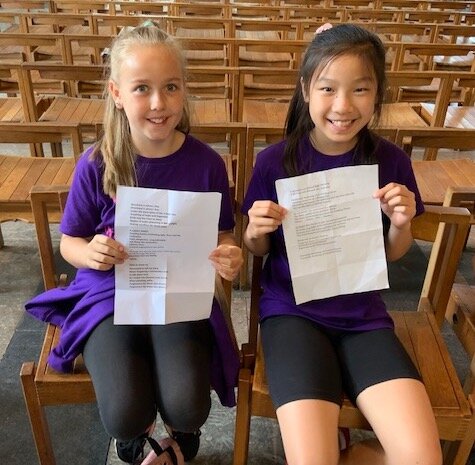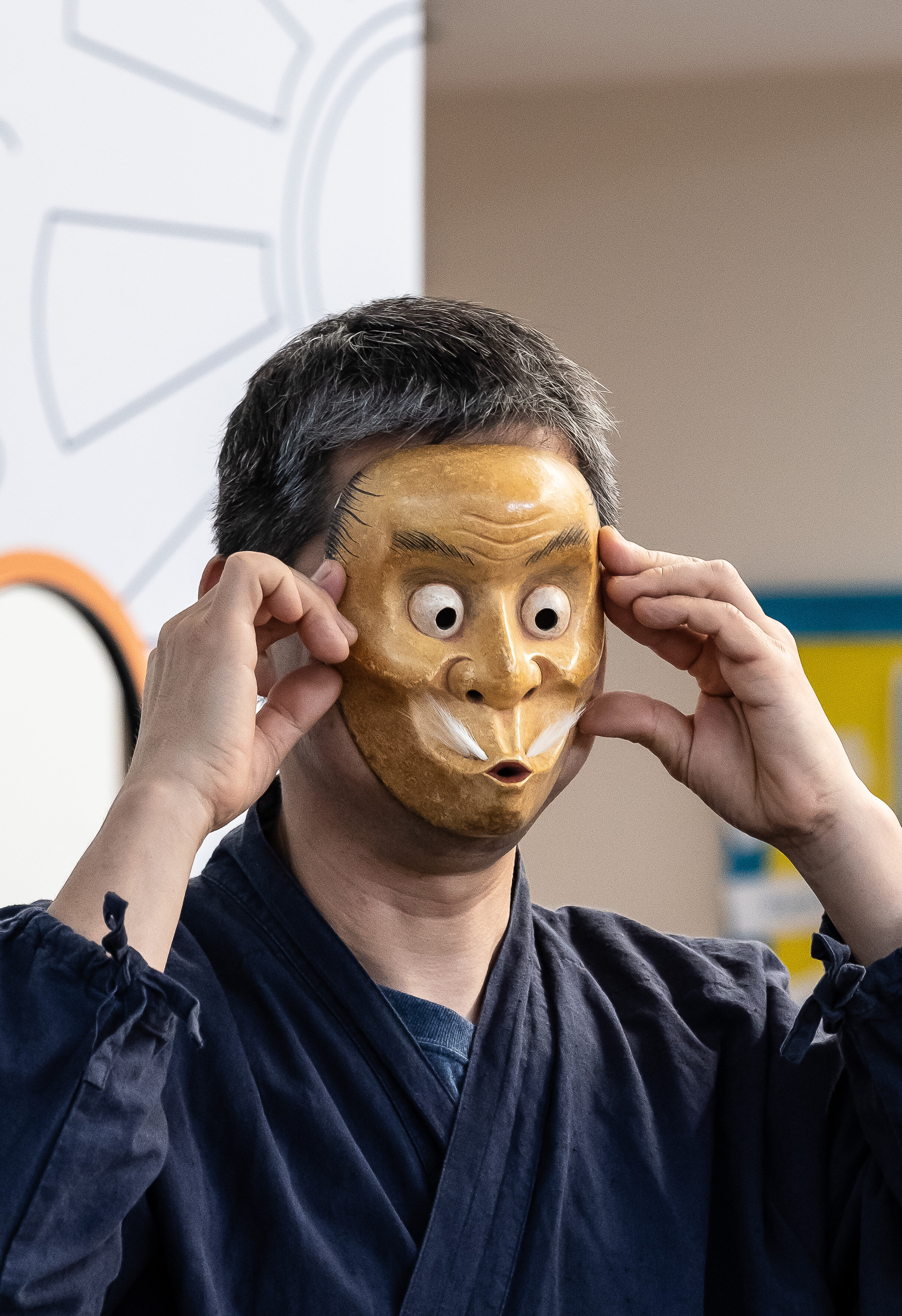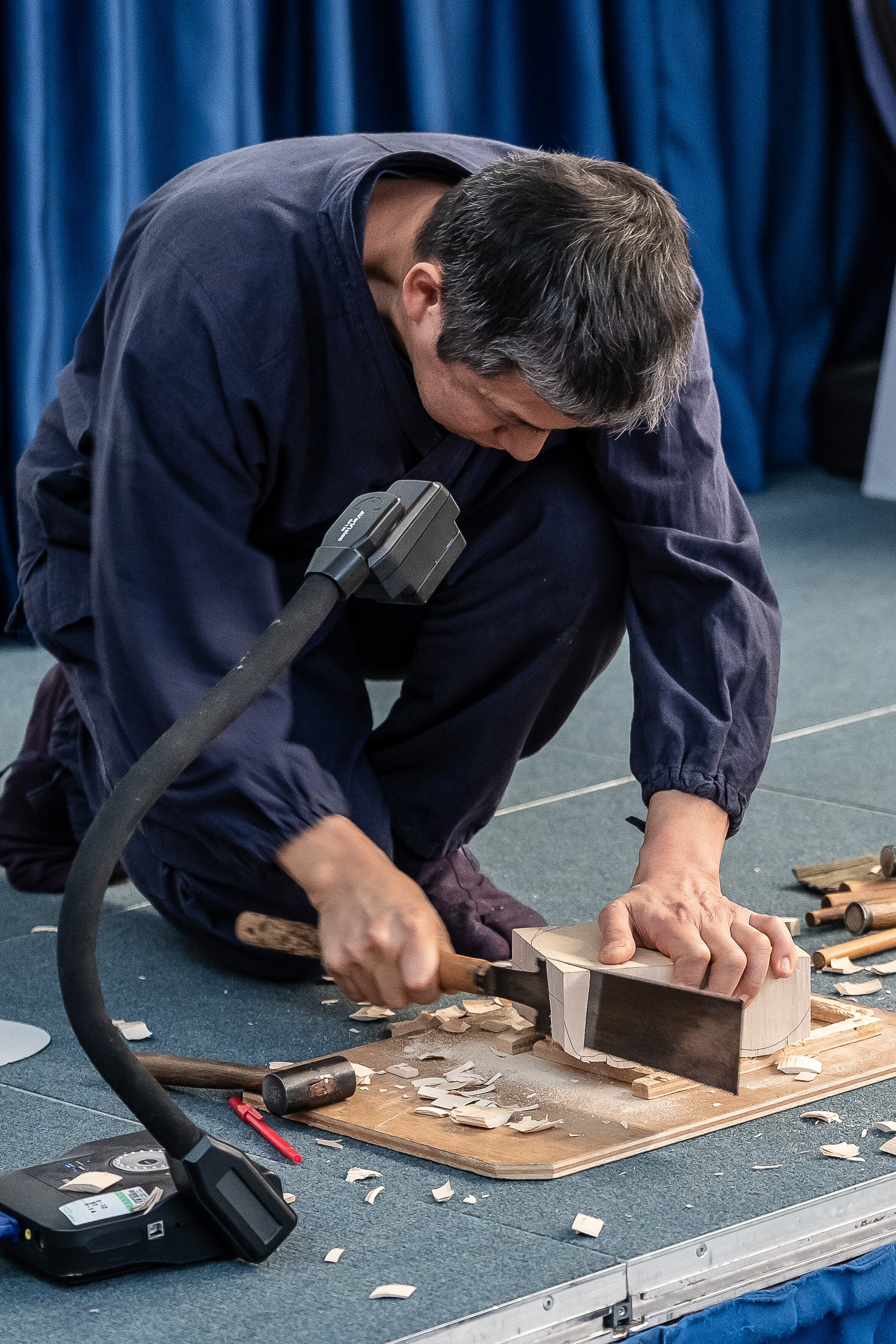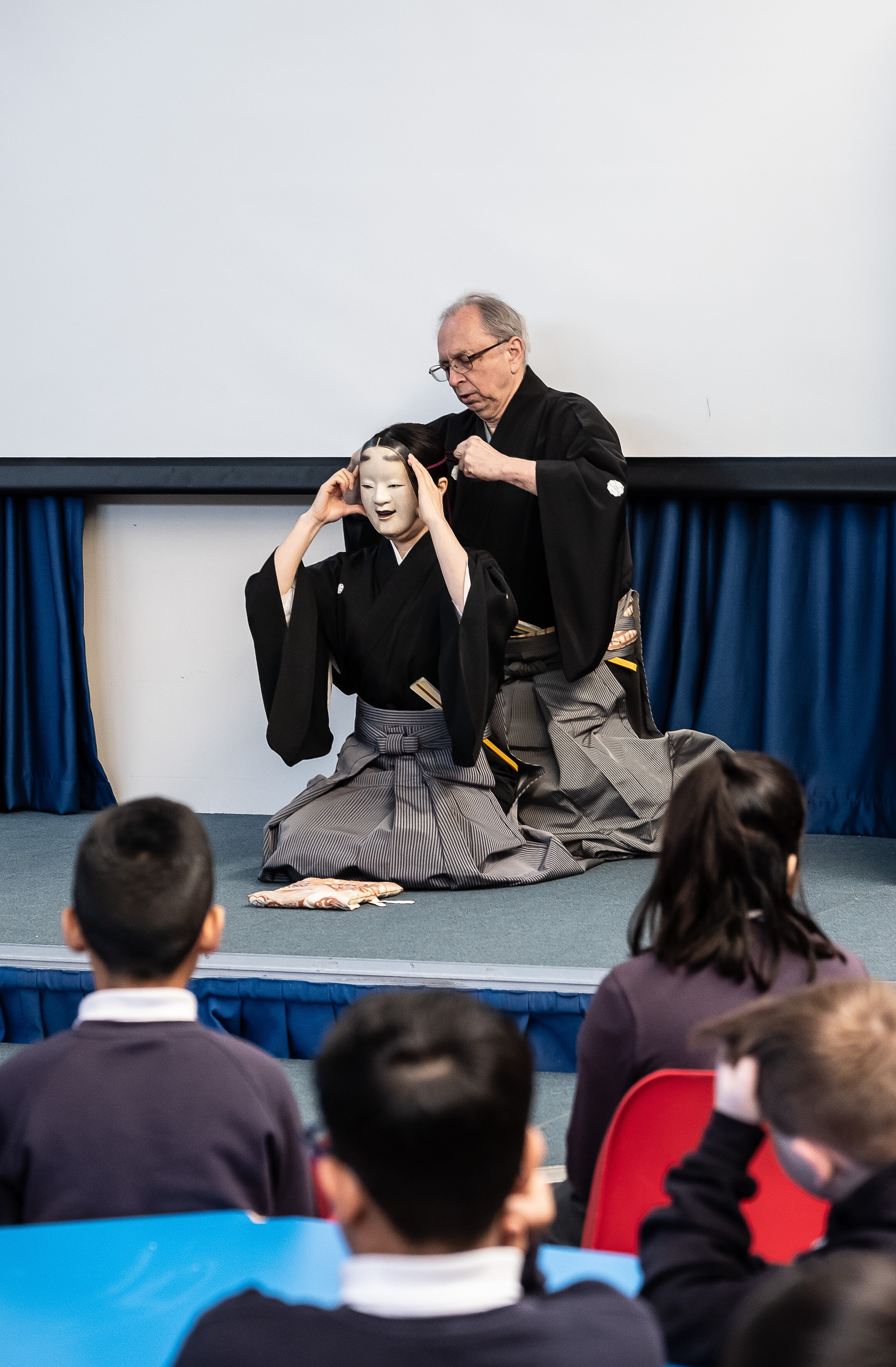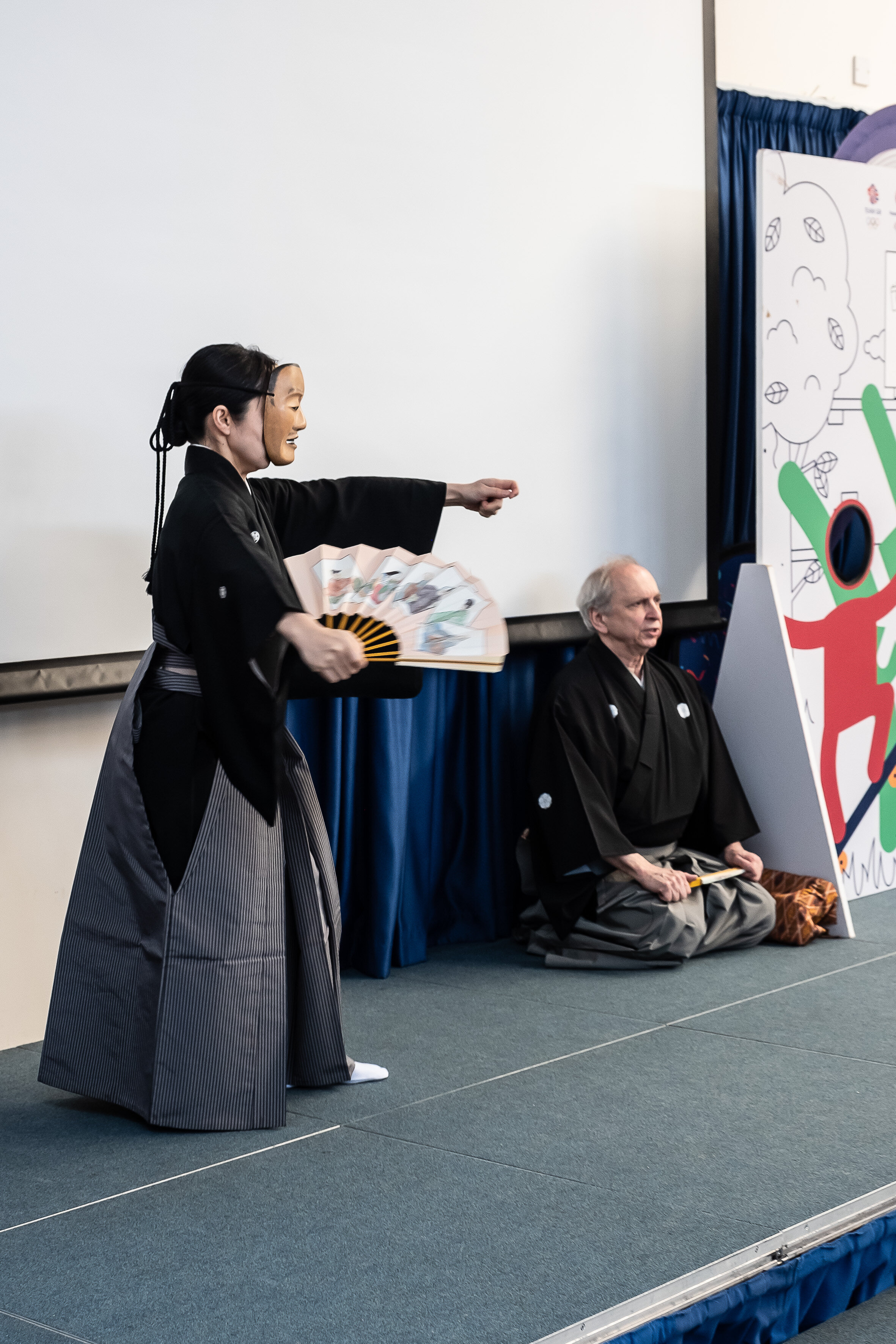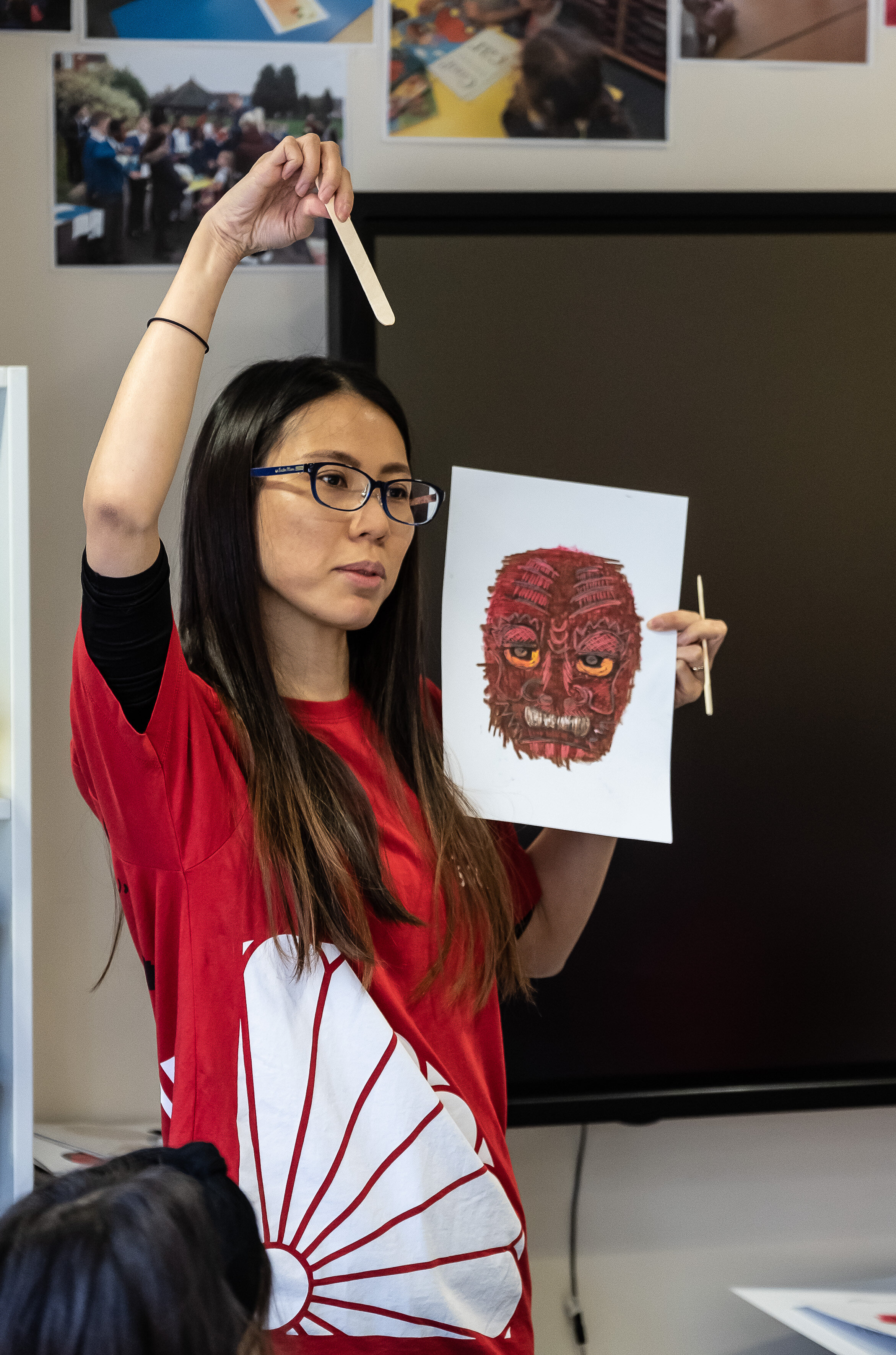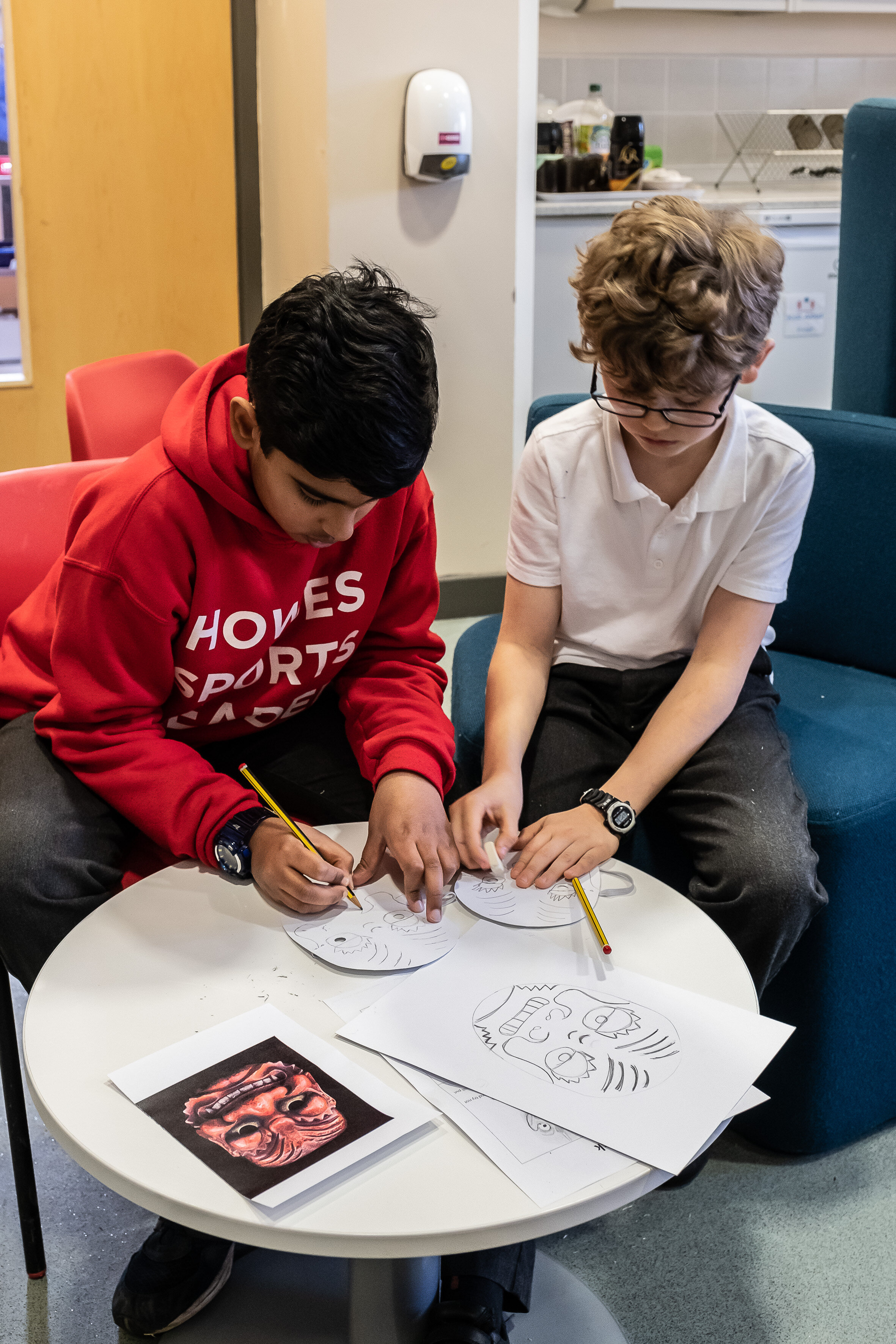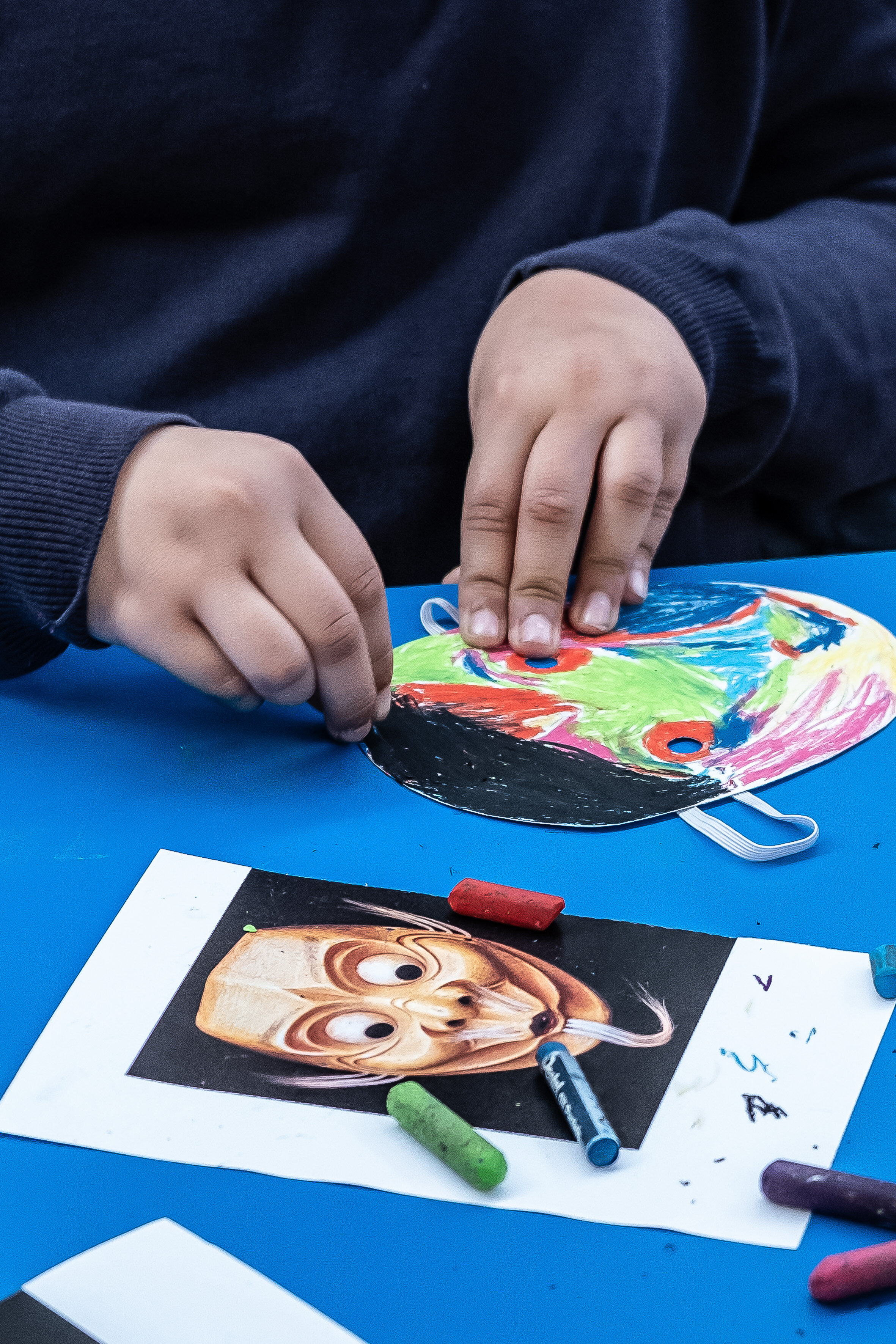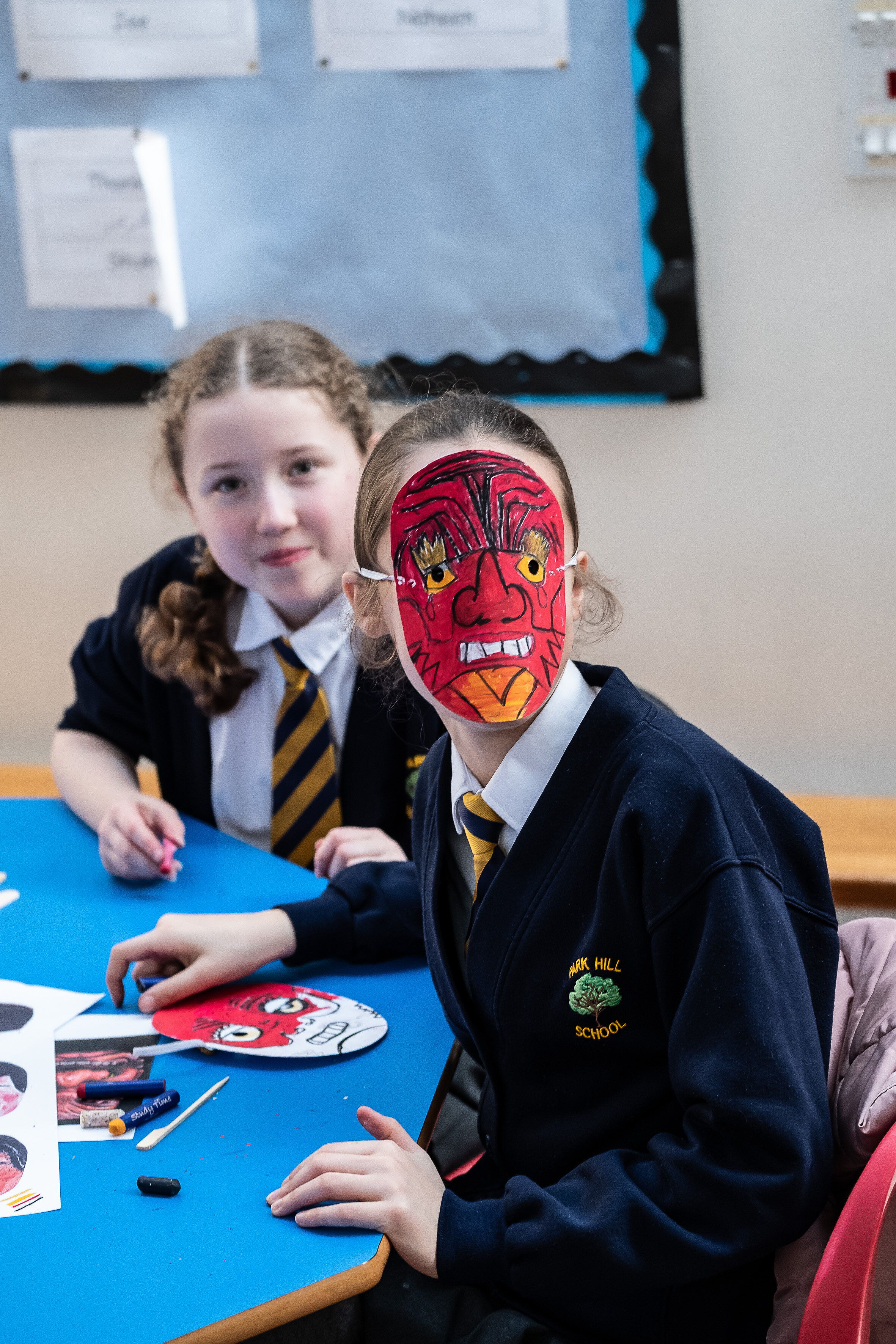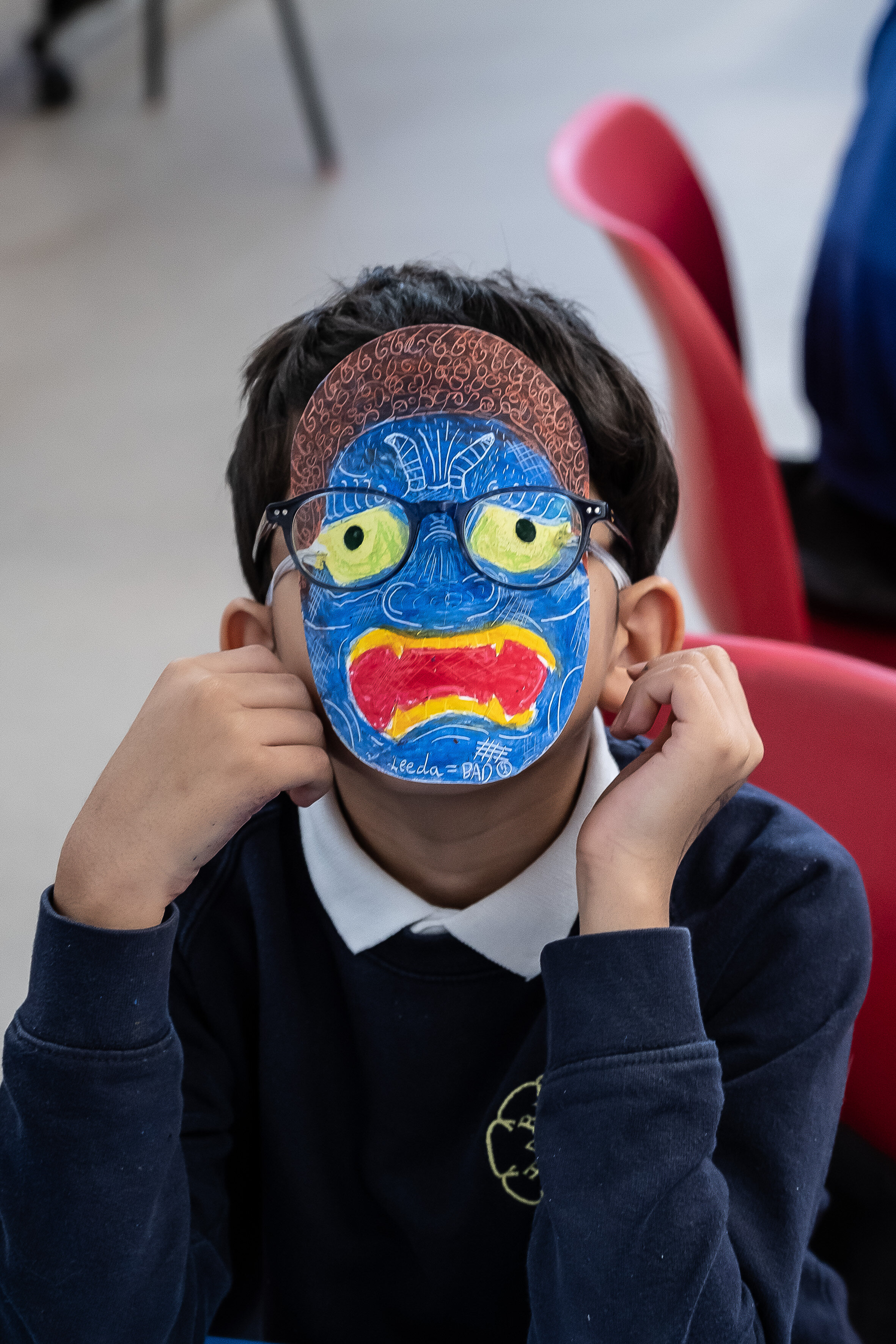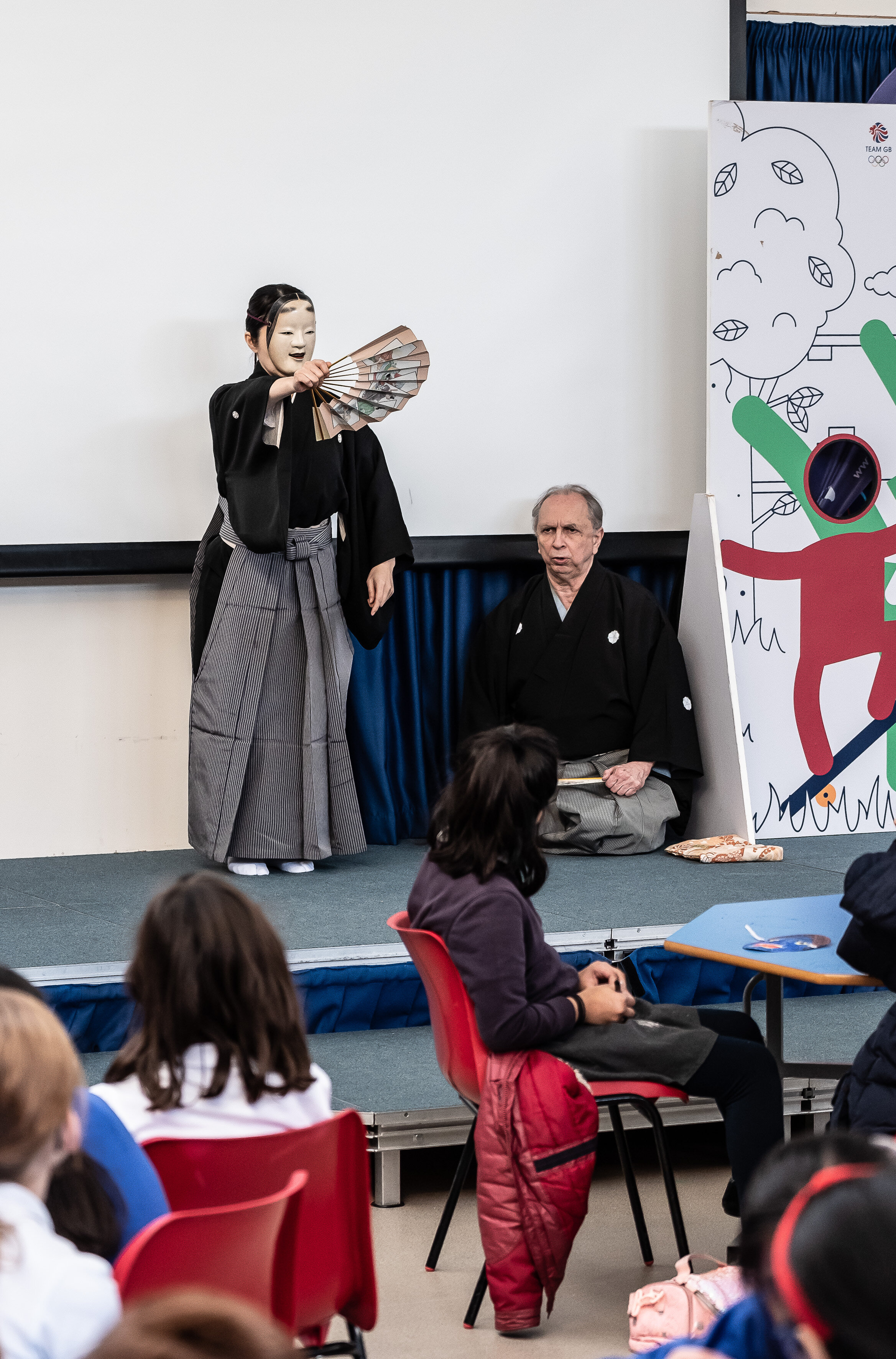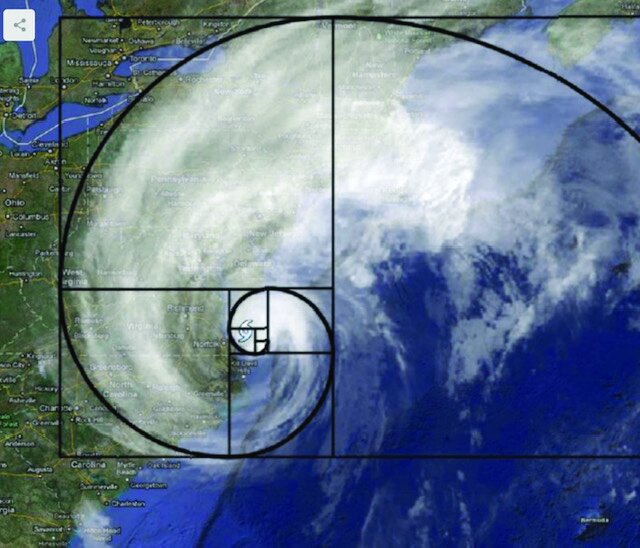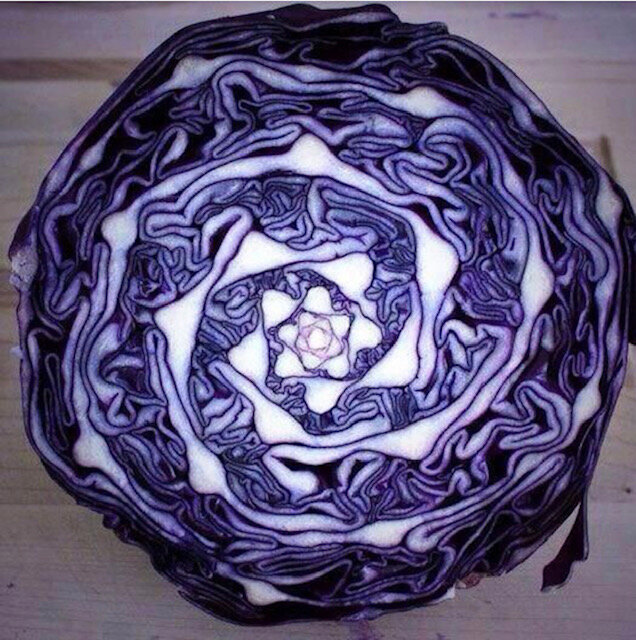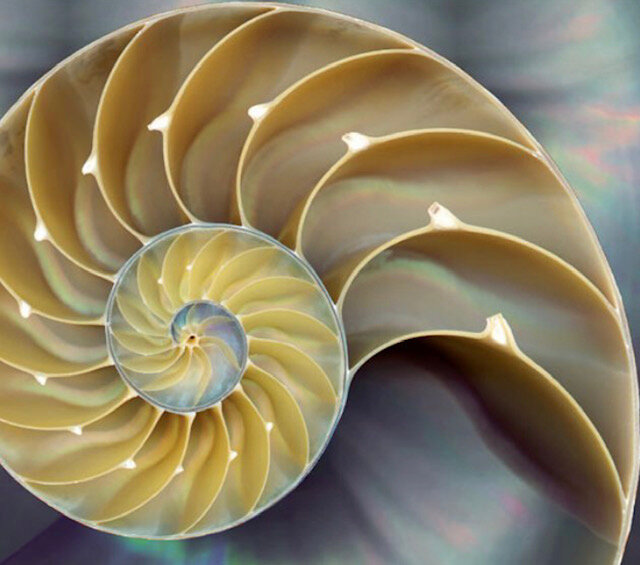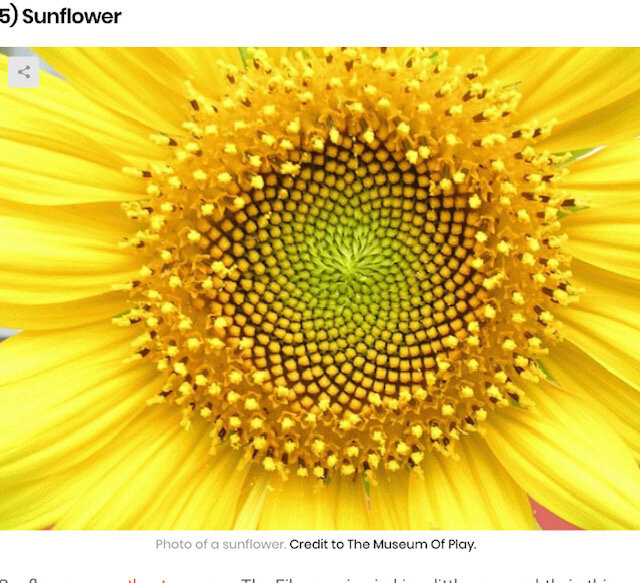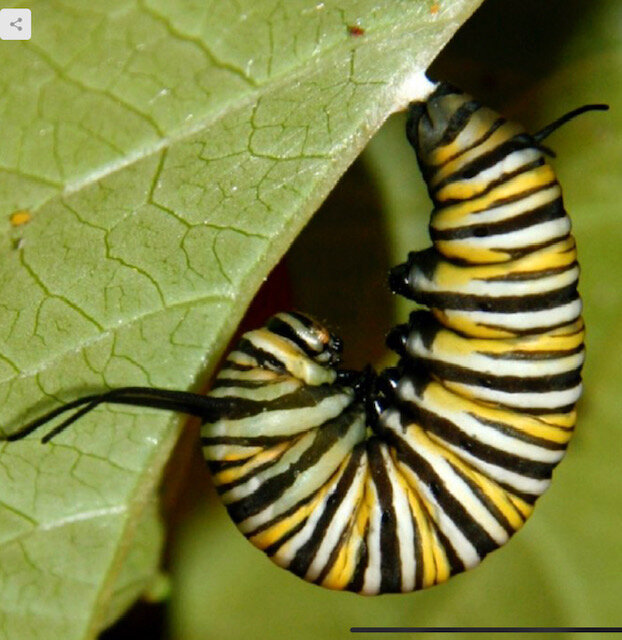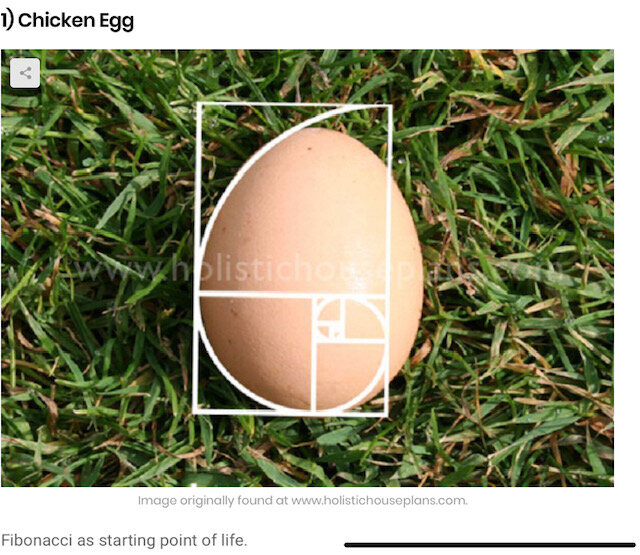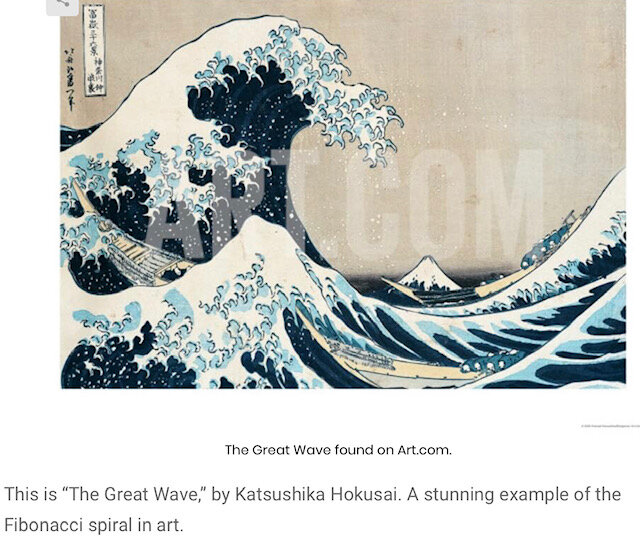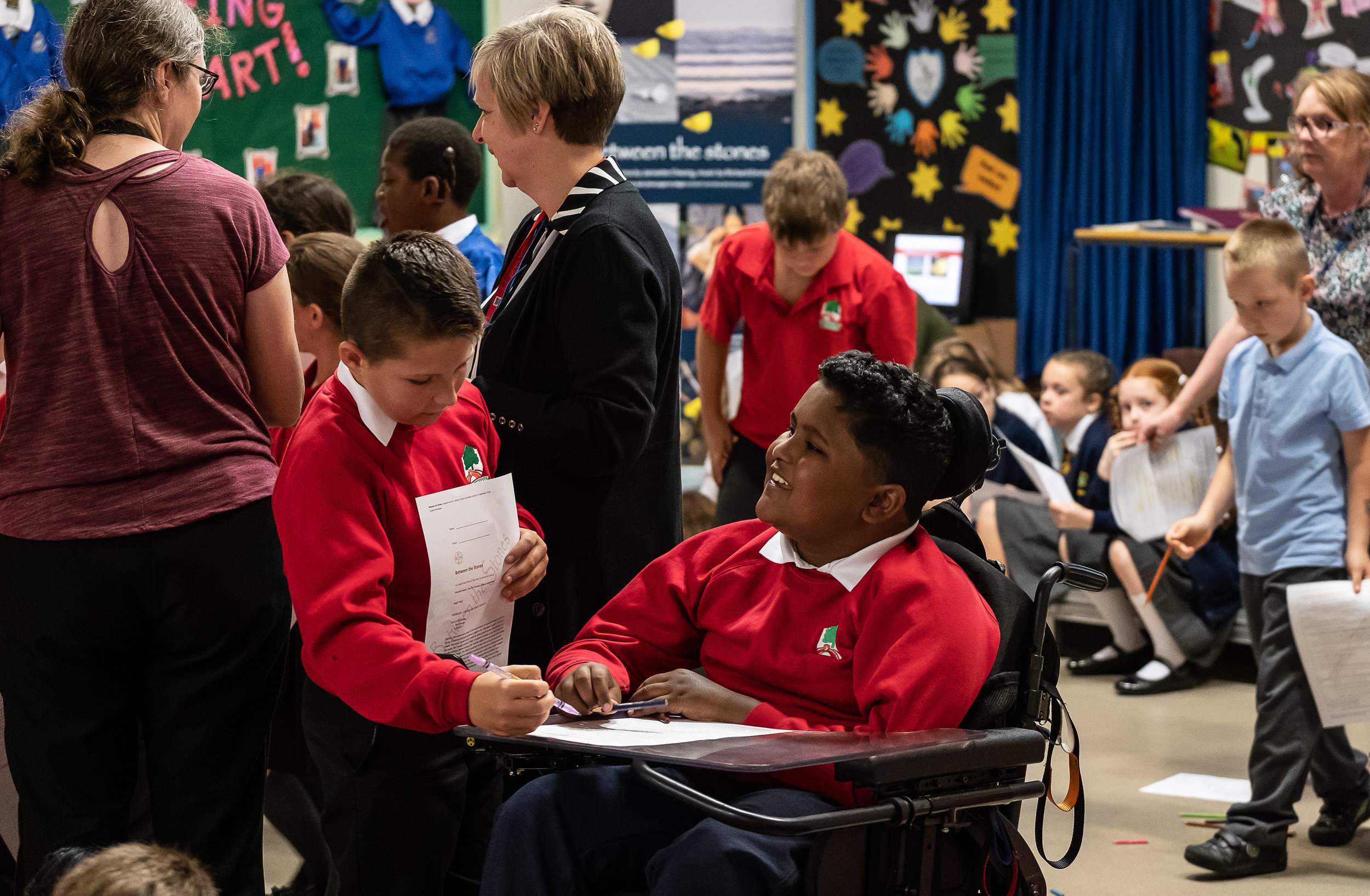Coventry Young Ambassadors Cities of Peace Schools Projects
The Between the Stones Project ‘Getting to noh’ education and outreach activities (2018-2021) included a major schools project with the Coventry Young Ambassadors. This Coventry Schools work was the foundation for the new UNESCO ASPnet Arts & Culture for Peace Initiative.
This Initiative was launched at the ‘Connecting for Peace UNESCO ASPnet UK Free Virtual Conference 2022’ on 17 June 2022.
The conference connected educators from across the world to collaborate in shaping a viable and peaceful world for future generations and to build peace within and between nations.
Background
Five Primary Schools in Coventry: Howes, Broad Heath, Finham, Park Hill and Stivichall worked collaboratively to explore noh theatre and to create work linked to noh with a focus on peace and reconciliation.
The Coventry Young Ambassadors worked on three projects with the Between the Stones team. The projects were called the Coventry Cities of Peace Projects, building on Coventry’s links with the City of Hiroshima. The three peace projects all drew inspiration from the Between the Stones project, the story of which involves three aesthetically-related Japanese cultural icons: noh theatre (and its associated masks), wind chimes (furin), and dry landscape (karesansui) gardens.
We would like to thank the Coventry Young Ambassadors for all of their hard work during 2018-2021 on the Cities of Peace Schools Projects!
Here is the Director of the UNESCO Associated Schools Network, Ms Julie Saito’s message of congratulations to the Coventry Young Ambassadors.
The Three Cities of Peace Projects
The Coventry Young Ambassadors first participated in a one-day workshop with Jannette Cheong, author of Between the Stones, in 2018 to learn about noh theatre and to be introduced to the new noh story Between the Stones supported by the Japan Society. They were inspired to work on three ‘peace’ projects all with an association to the Between the Stones new noh. These are:
Tanzaku Poem Cards (Peace Project 1)
In the Autumn (October to November 2018) the children wrote peace poems on tanzaku poem cards, which were suspended from furin wind chimes made by the children from recycled materials. They shared these with the people of Coventry on peace trees displayed at Coventry Cathedral on the 100th anniversary Armistice Day 2018 and at the Japanese Embassy, London in February 2019 at a special Between the Stones event.
Coventry Young Ambassadors’ Tanzaku Poem Cards
Exhibited at Coventry Cathedral for the 100th anniversary Armistice day, 2018





The Tanzaku Peace Poems
180 Coventry Young Ambassadors’ Tanzaku Peace Poems (furin) Exhibition at Coventry Cathedral, 8-16 November 2018
John Lewis & Partners kindly donated three of the trees on which the 180 furin were displayed.
Travel songs and plays inspired by Noh theatre (Peace Project 2)
In the spring-summer (April-July 2019), The children began work on ‘travel songs’, an aspect of storytelling in noh theatre. This followed a performance workshop with professional noh actor, Kinue Oshima, Professor Richard Emmert and Jannette Cheong. Examples of the children’s travel songs and a short noh-influenced play were performed at Coventry Cathedral on Hiroshima Day, 6 August 2019.
Coventry Young Ambassadors (Imogen and Isabella) preparing to read their class travel songs along with other presentations of the children’s work.
Coventry Cathedral, Hiroshima Day, 6 August 2019
Getting to noh masks
At the end of the Between the Stones 2020 European Performance Tour our master maskmaker, Hideta Kitazawa, professional noh actor Kinue Oshima, Richard Emmert and Jannette Cheong travelled to Coventry and spent a day with the children introducing them to noh masks and their role in noh theatre.
This was followed by the children creating their own characters on card masks with the support of the Japan Society.
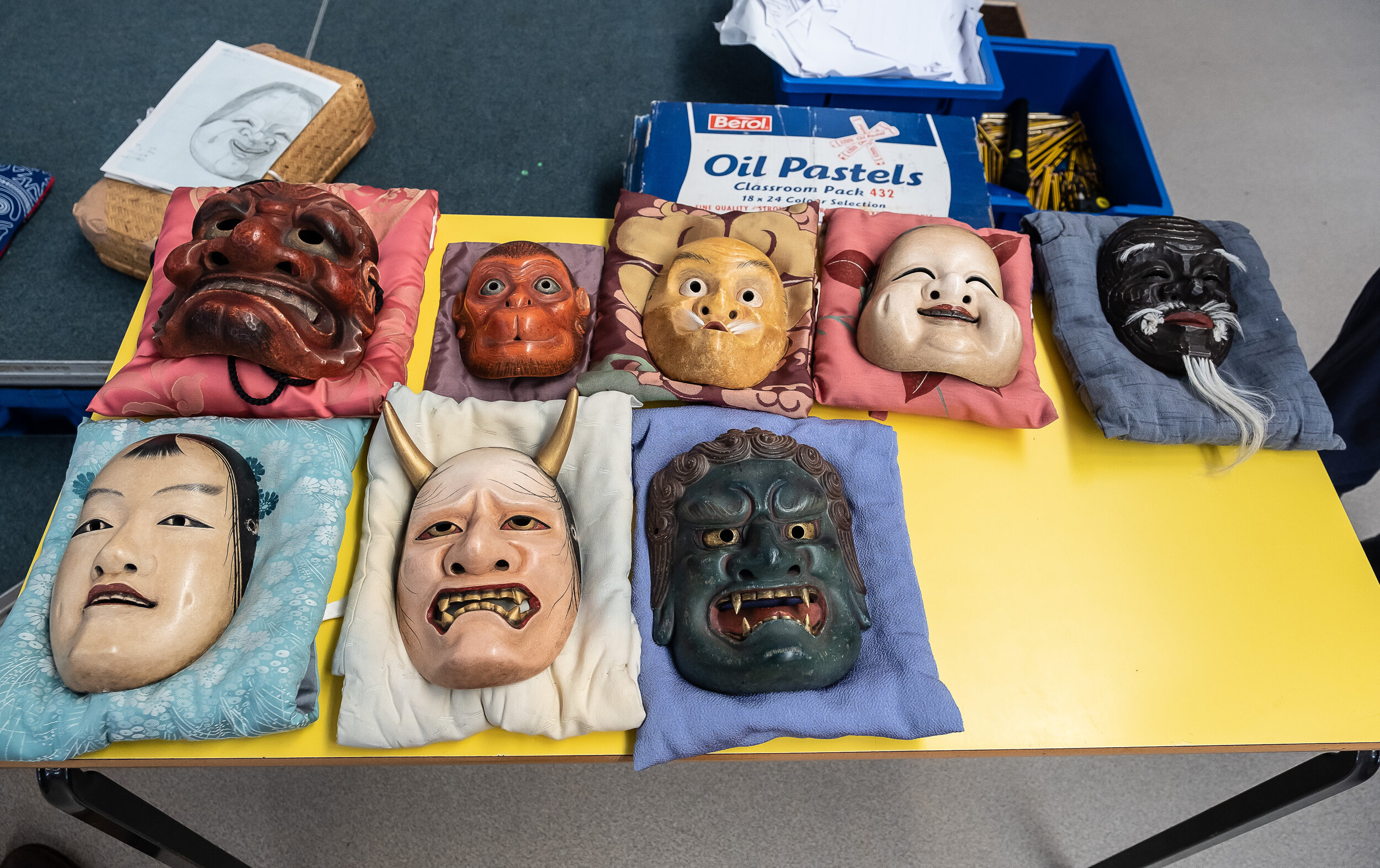
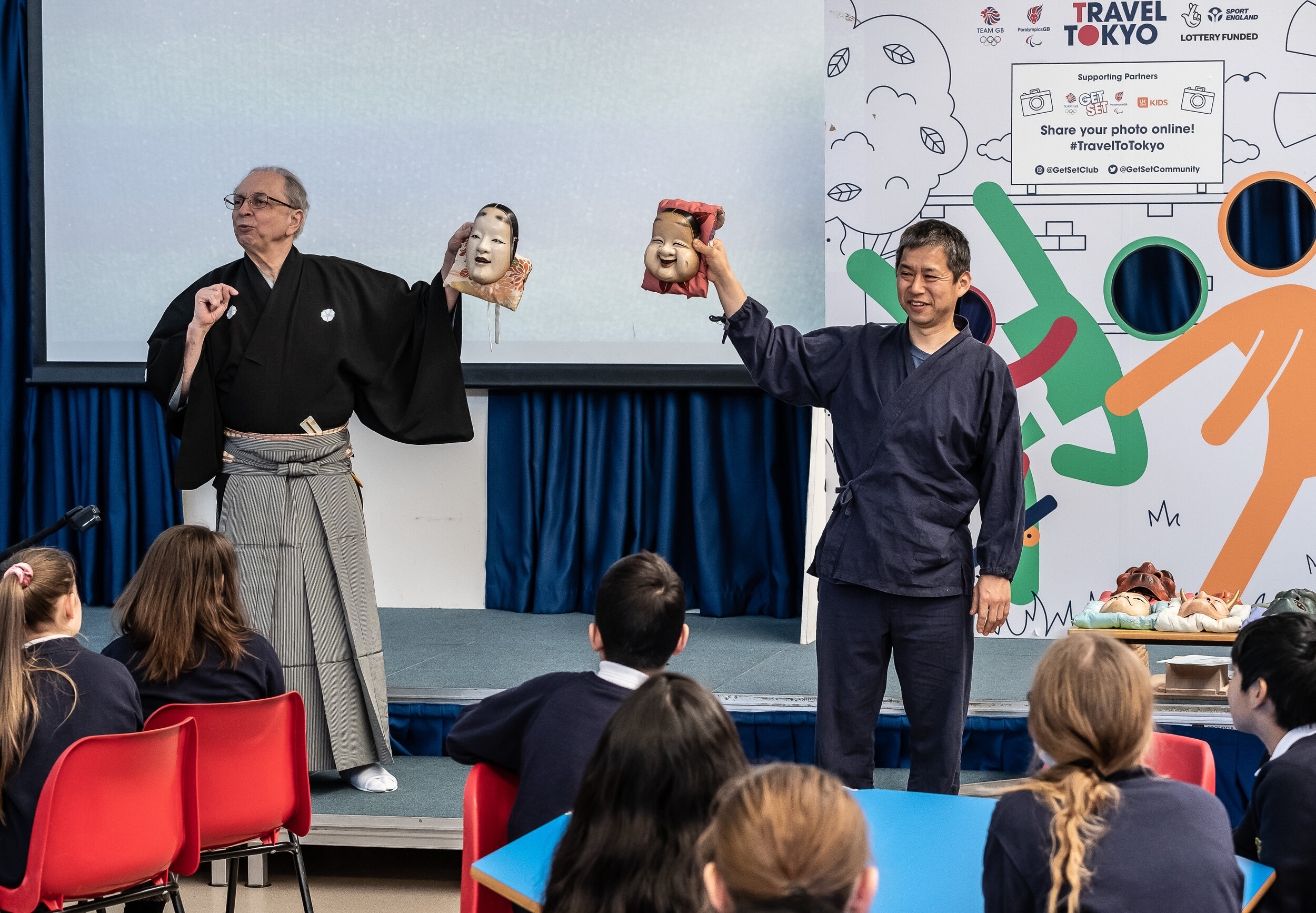
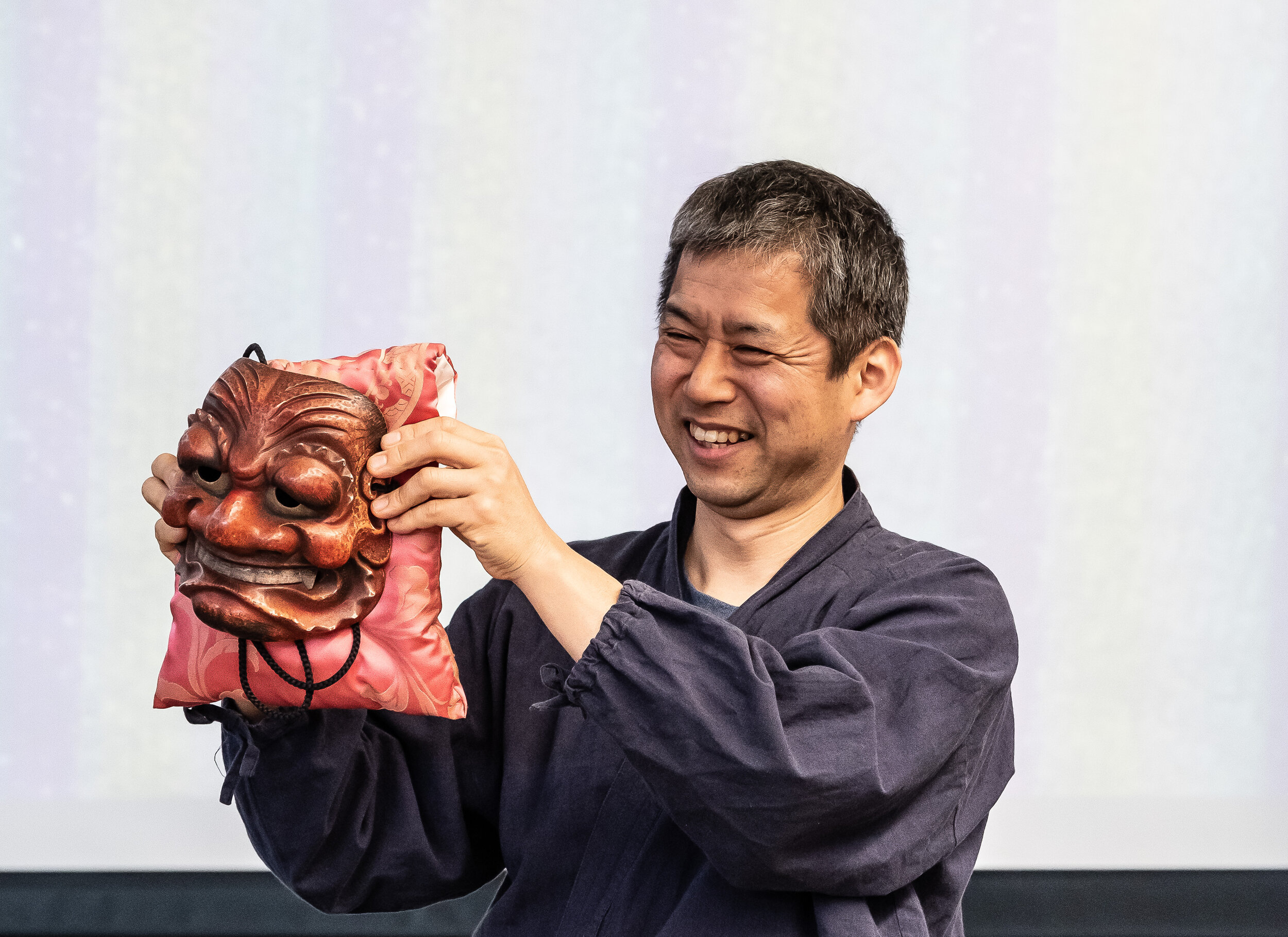
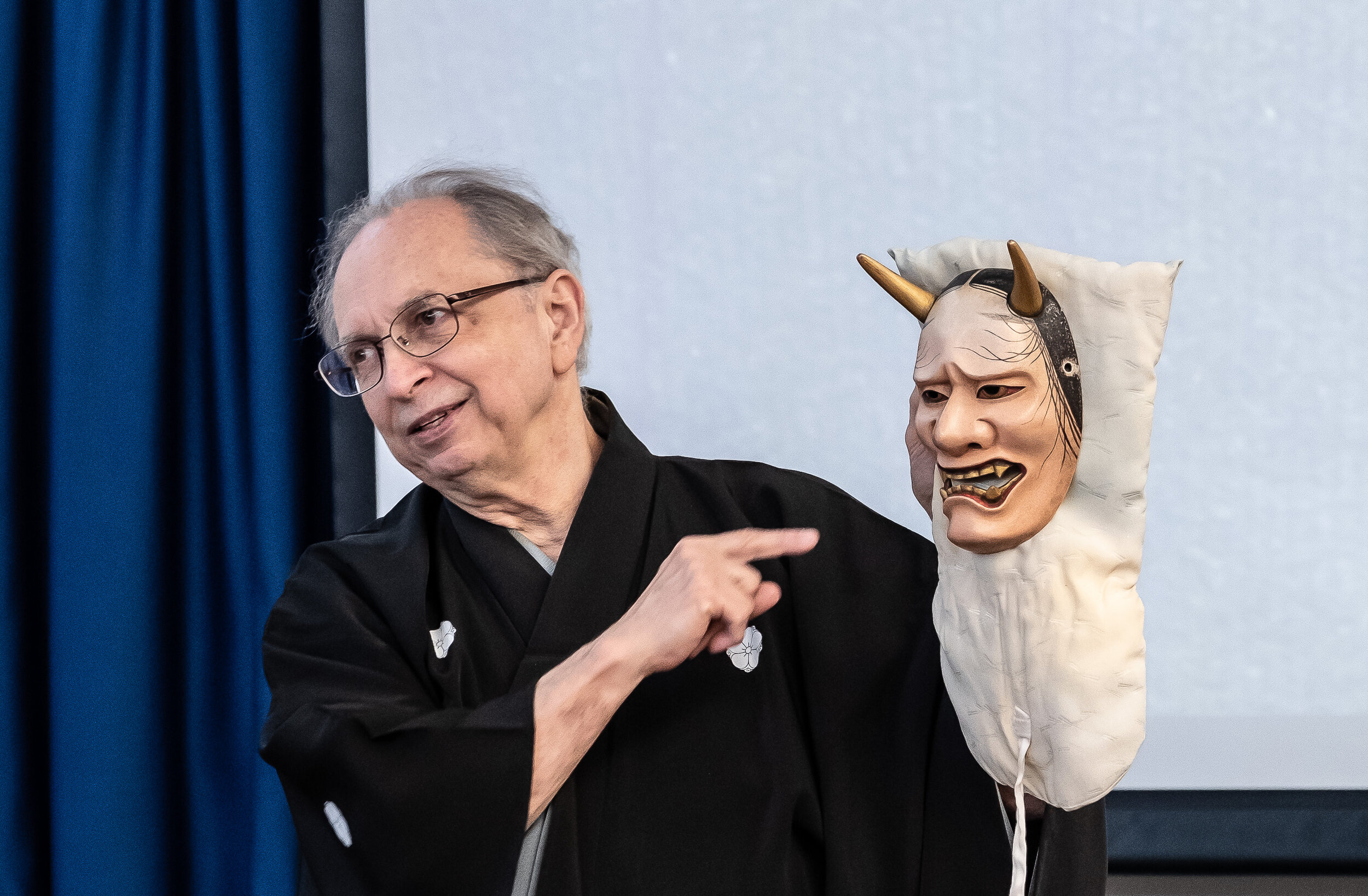
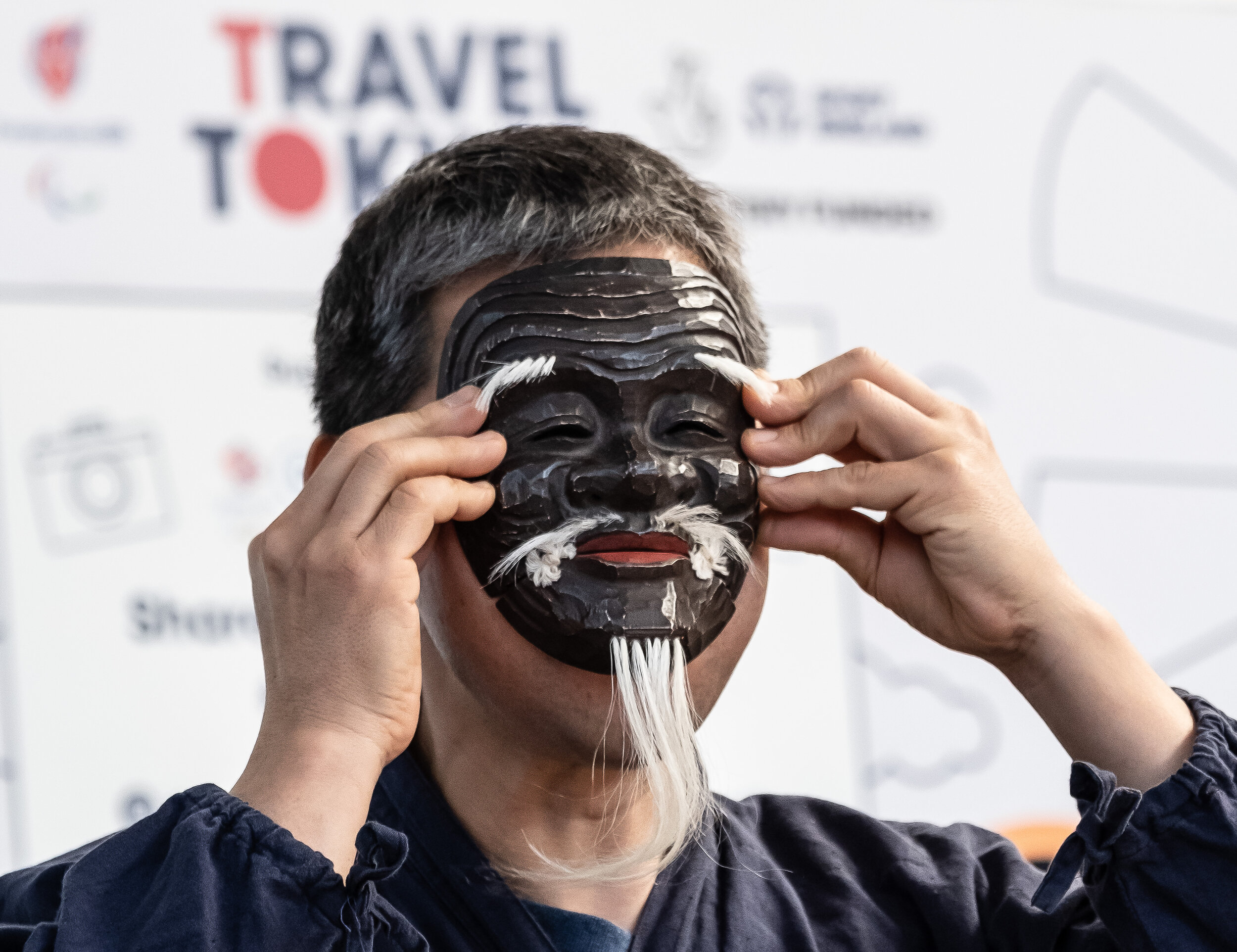
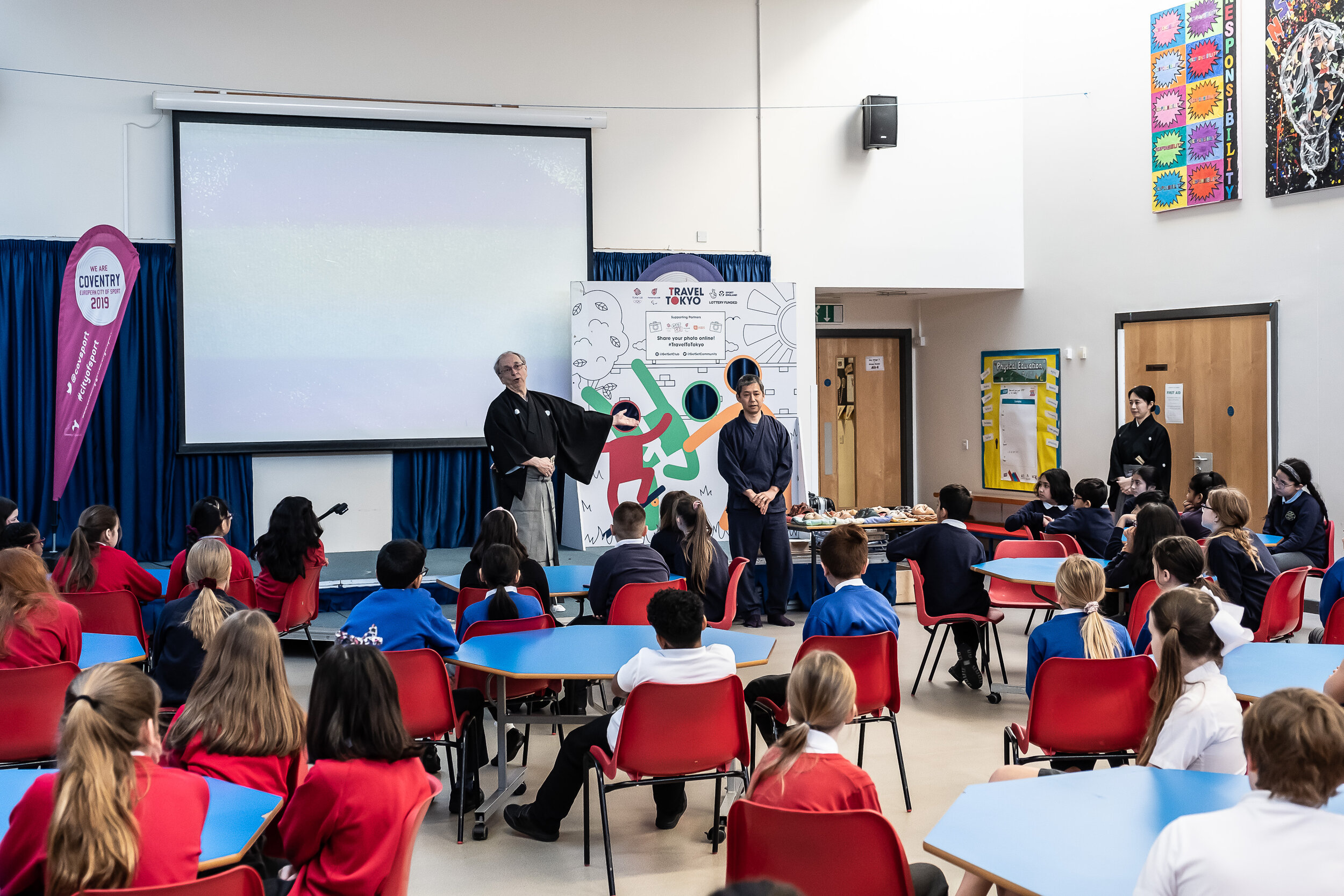
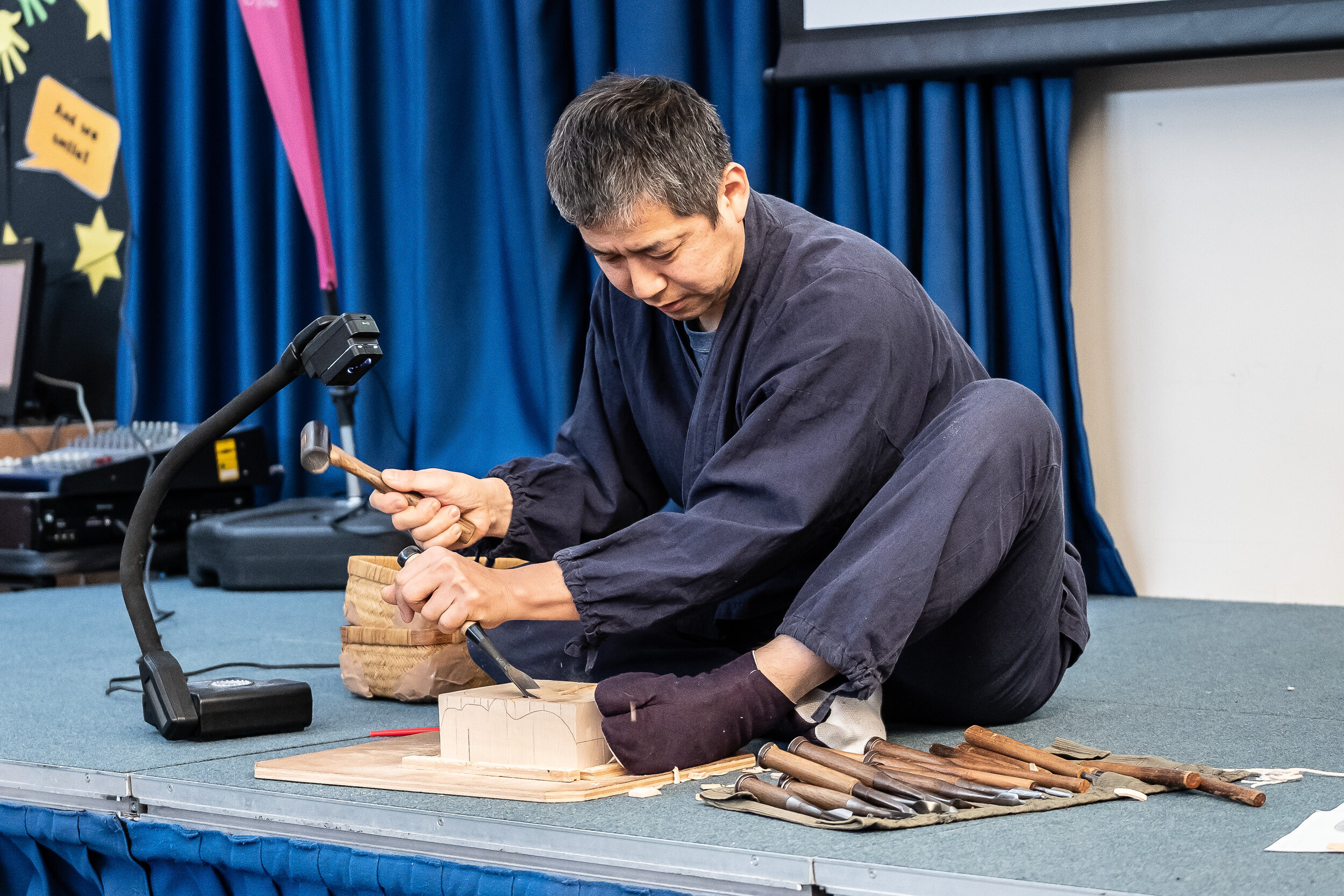
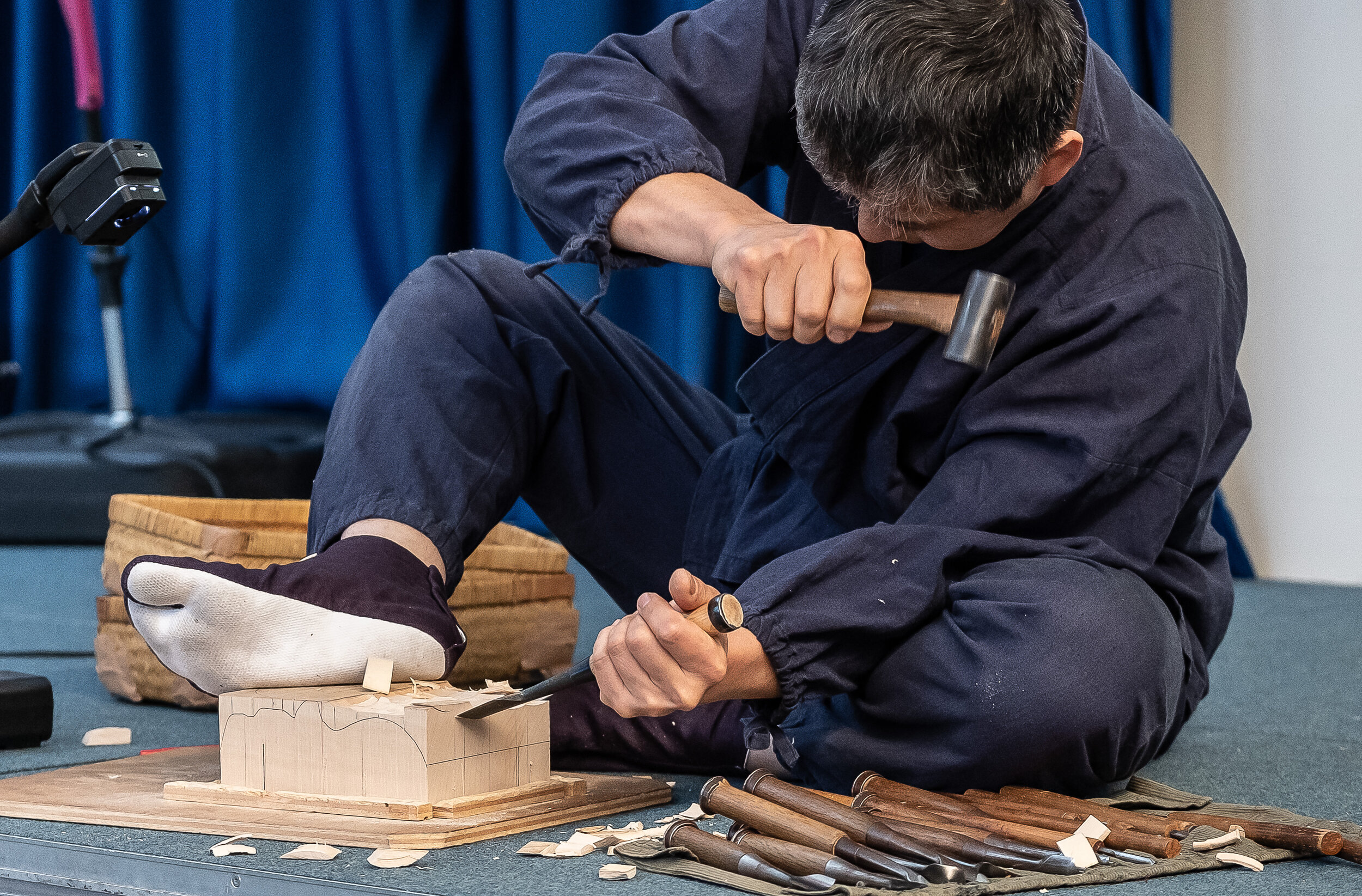
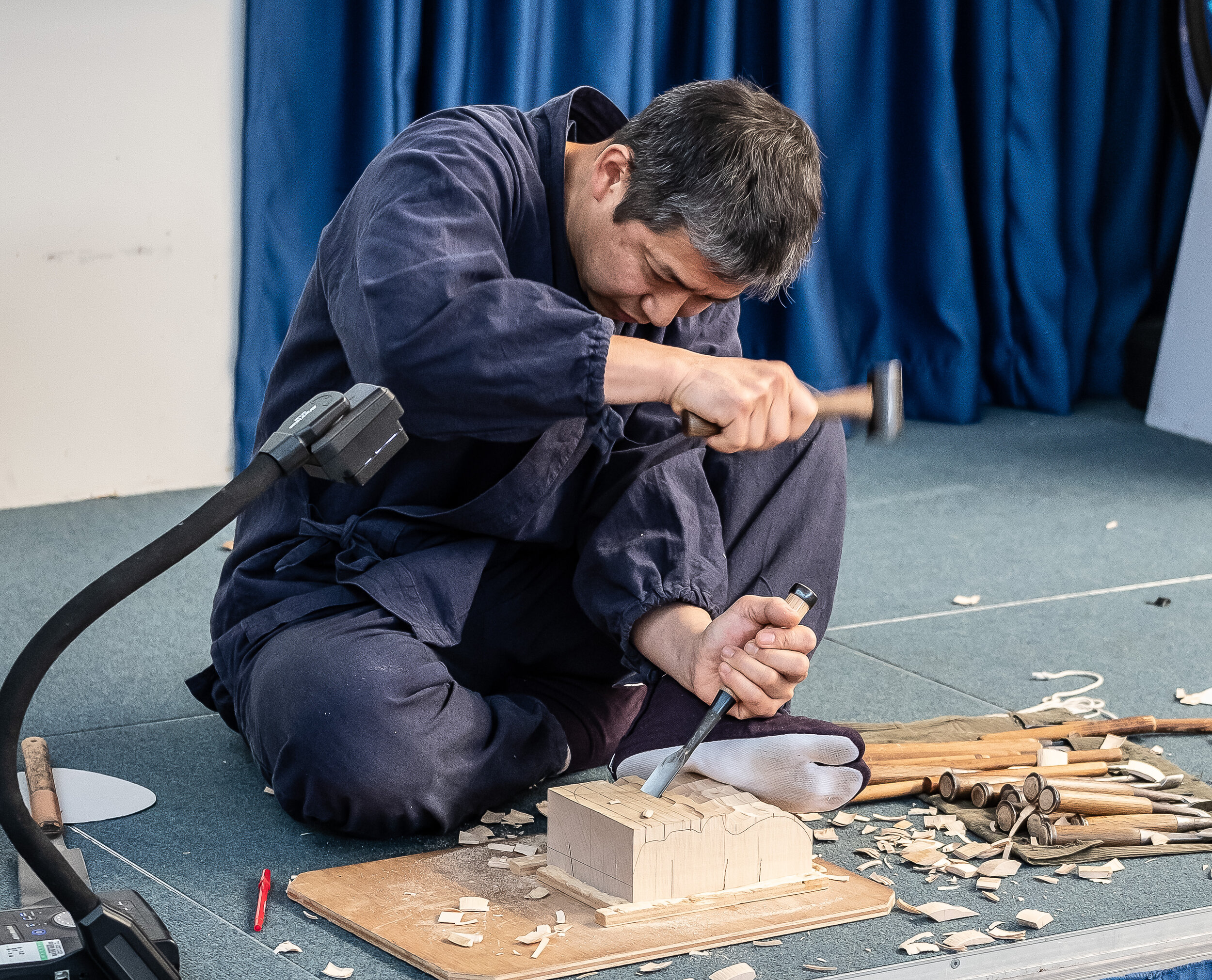
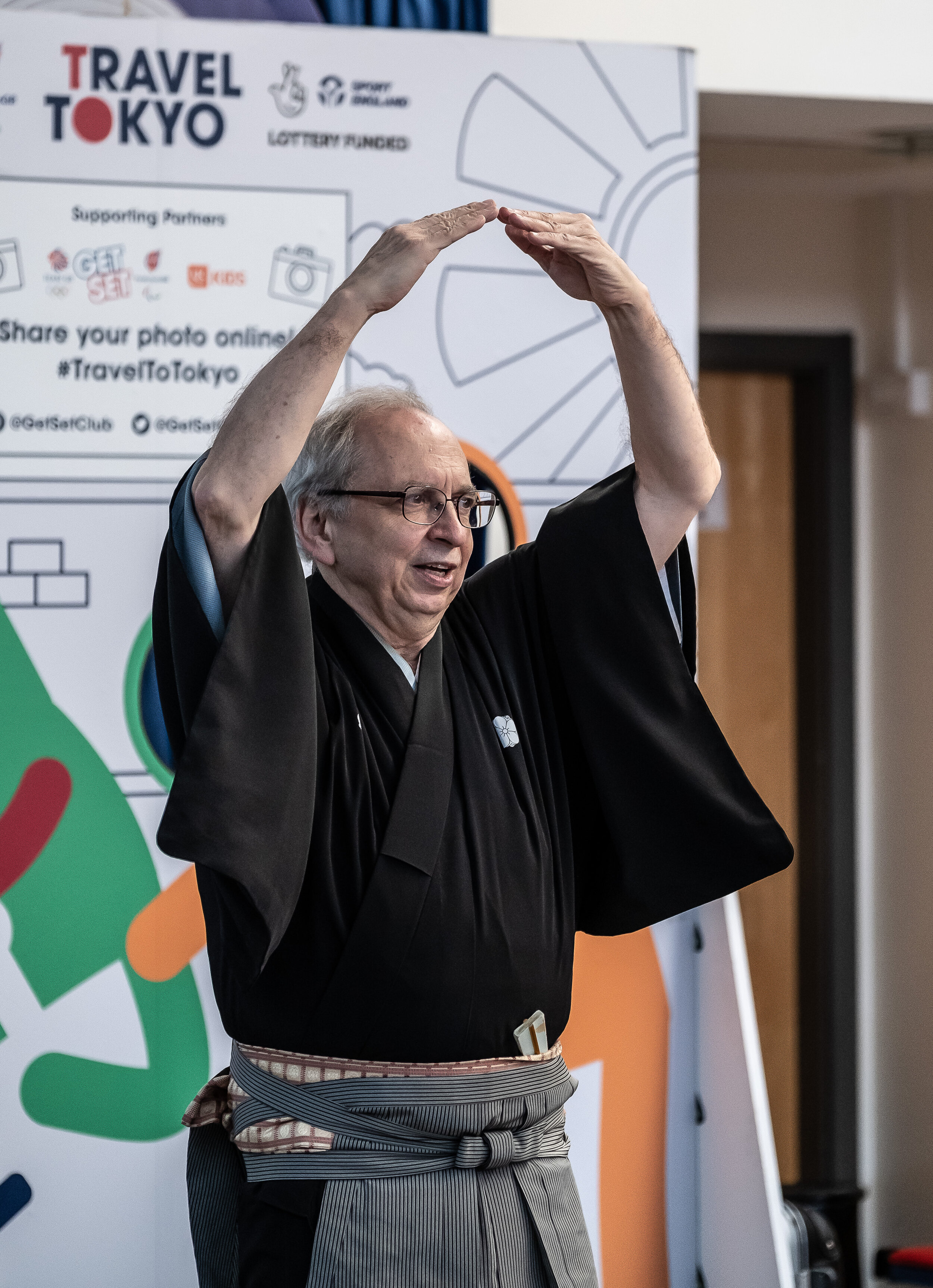
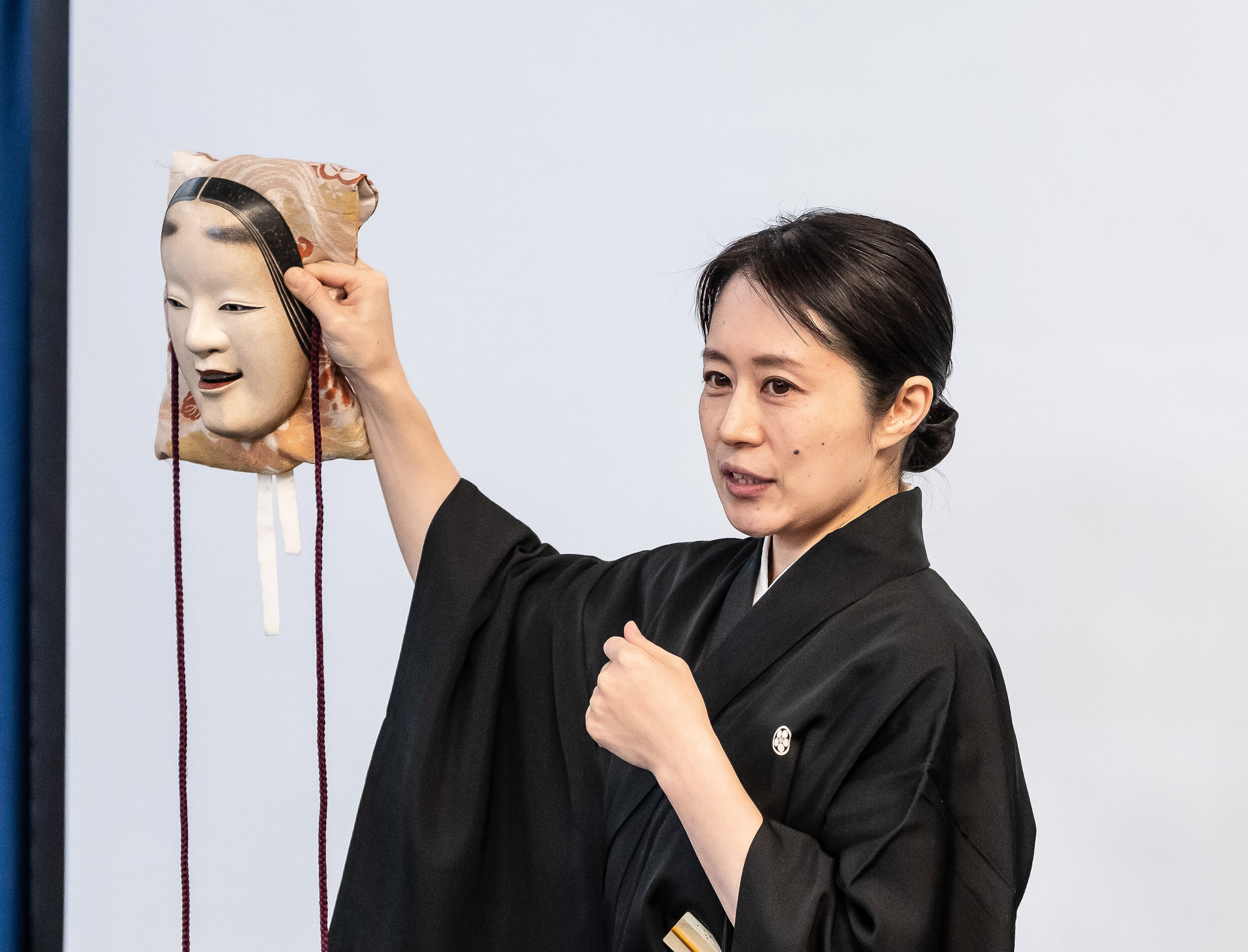
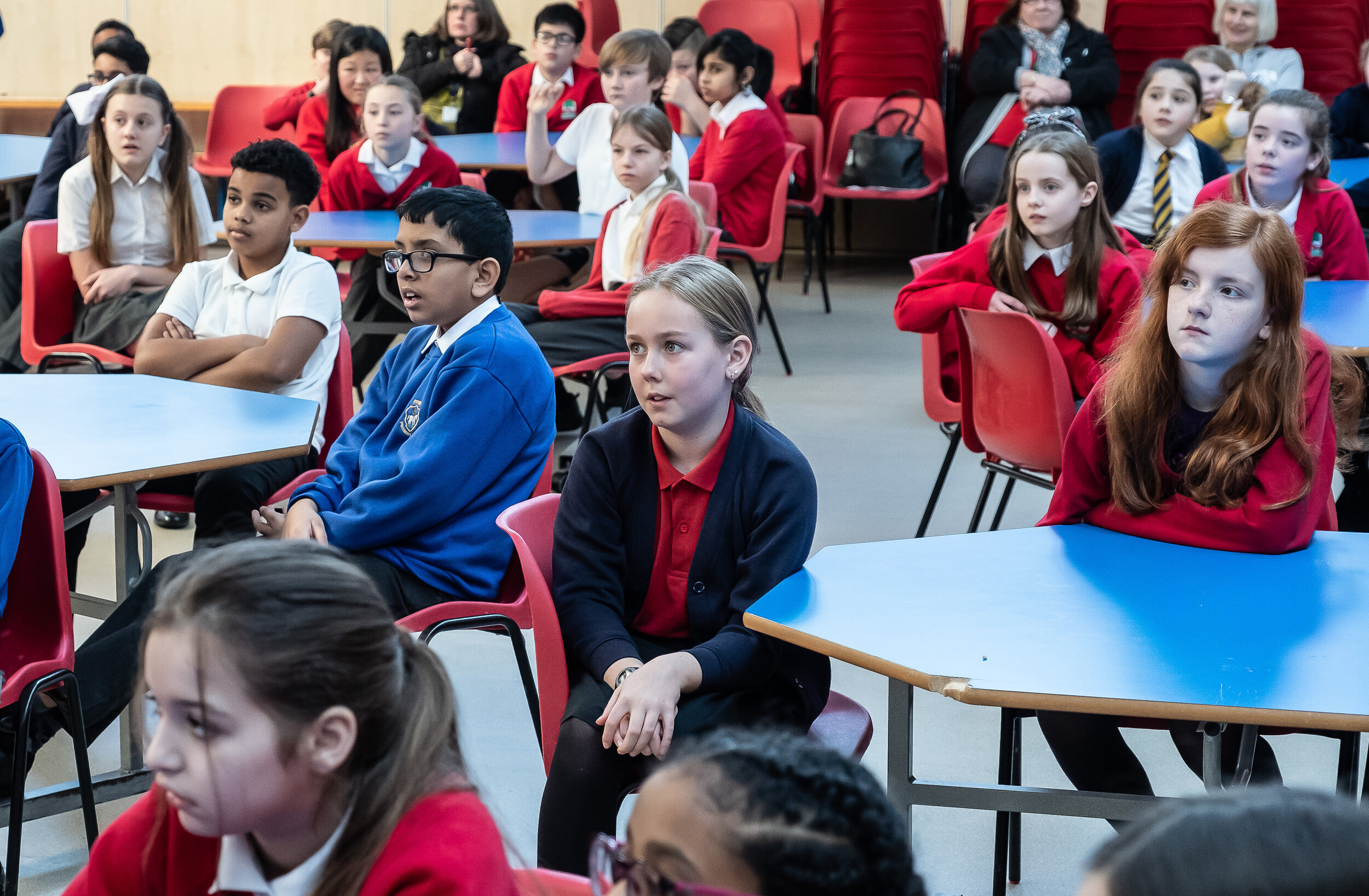
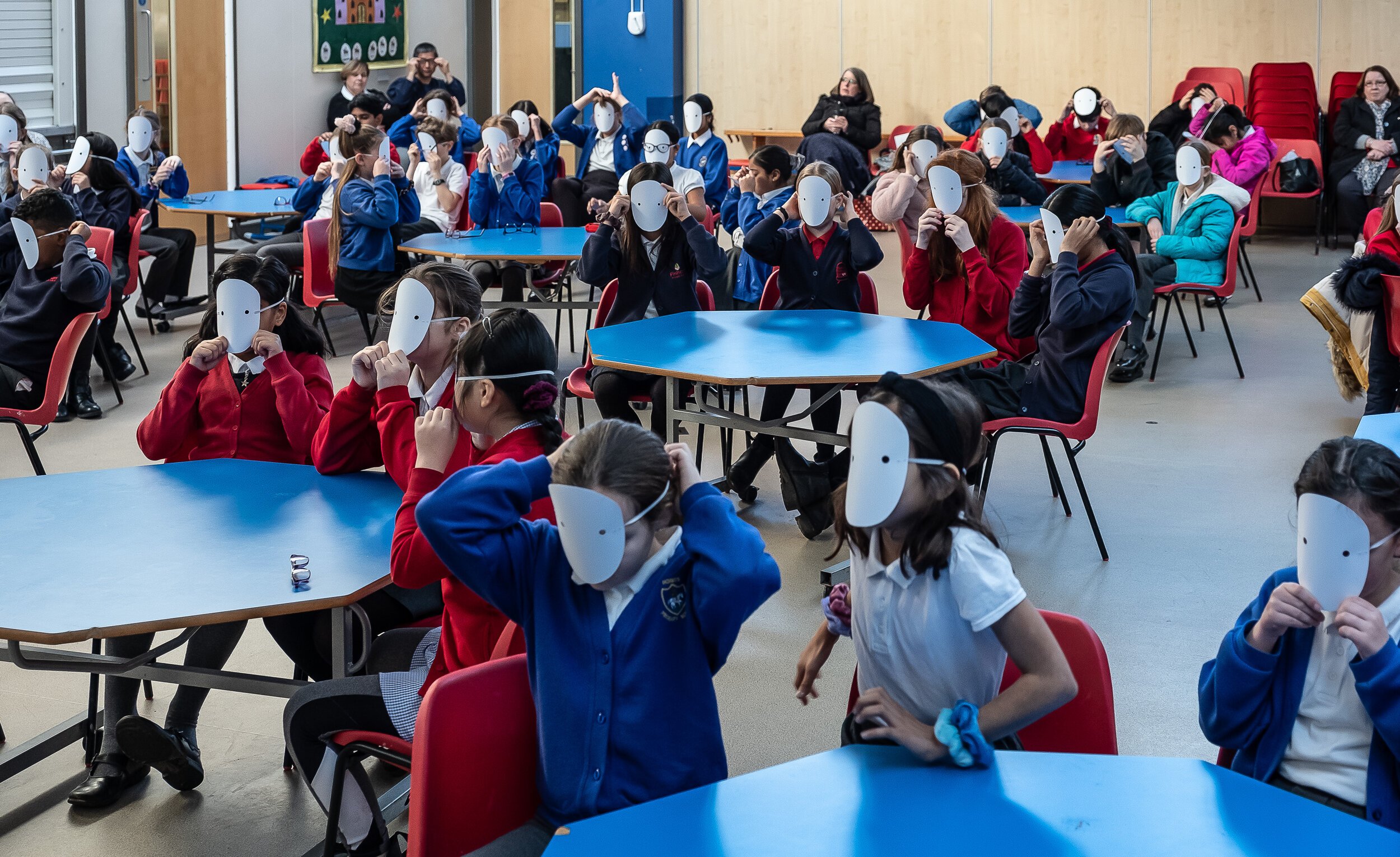
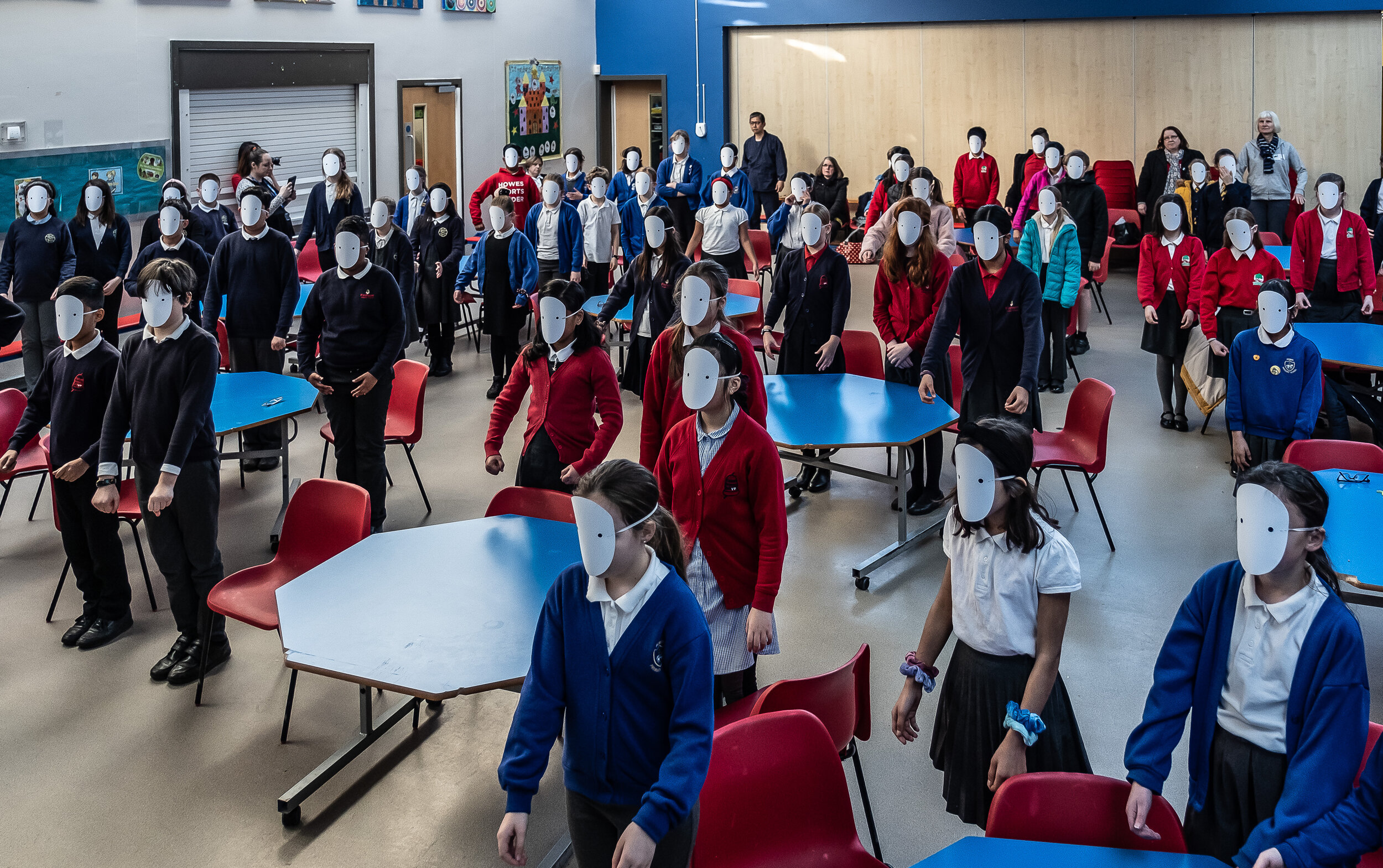
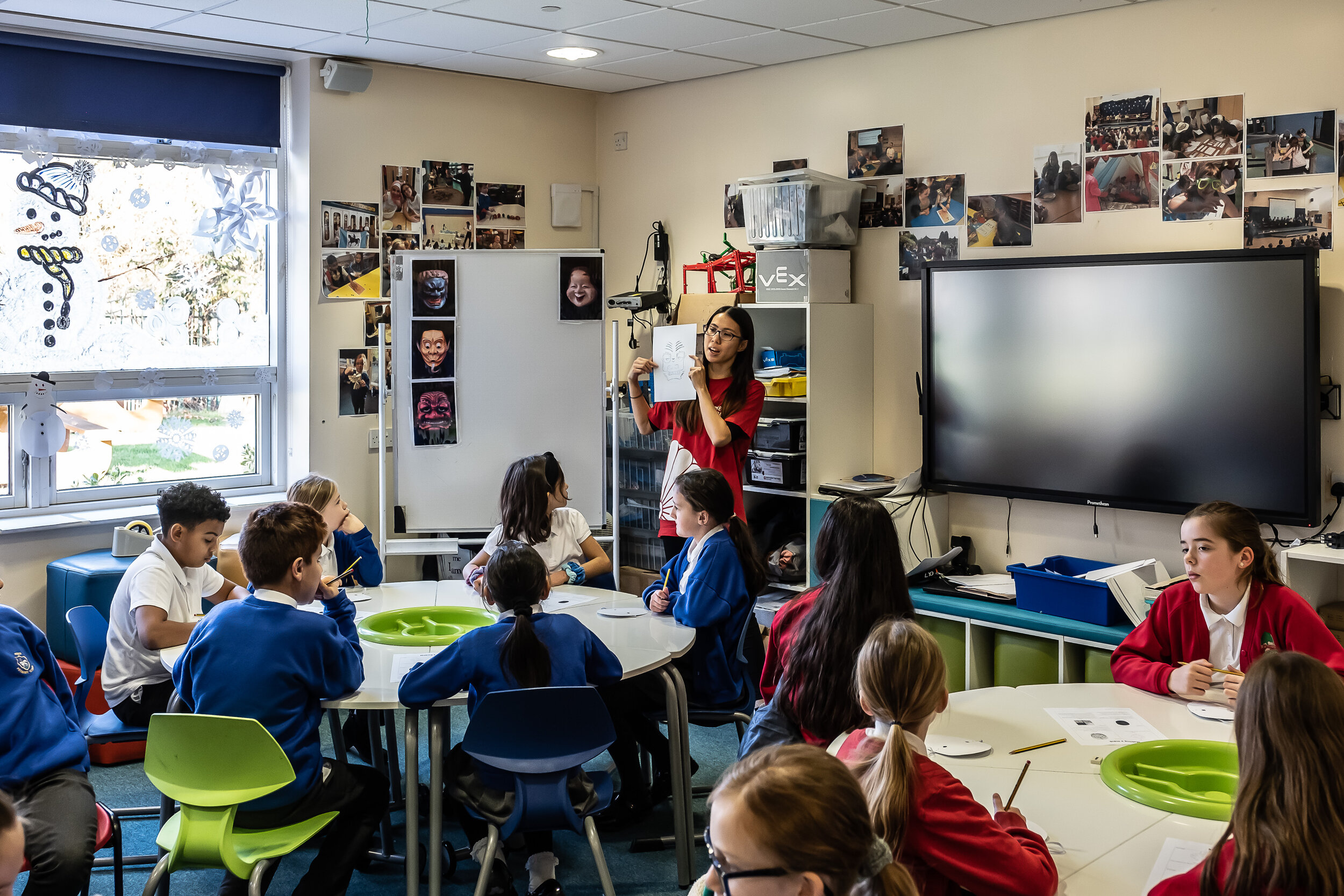
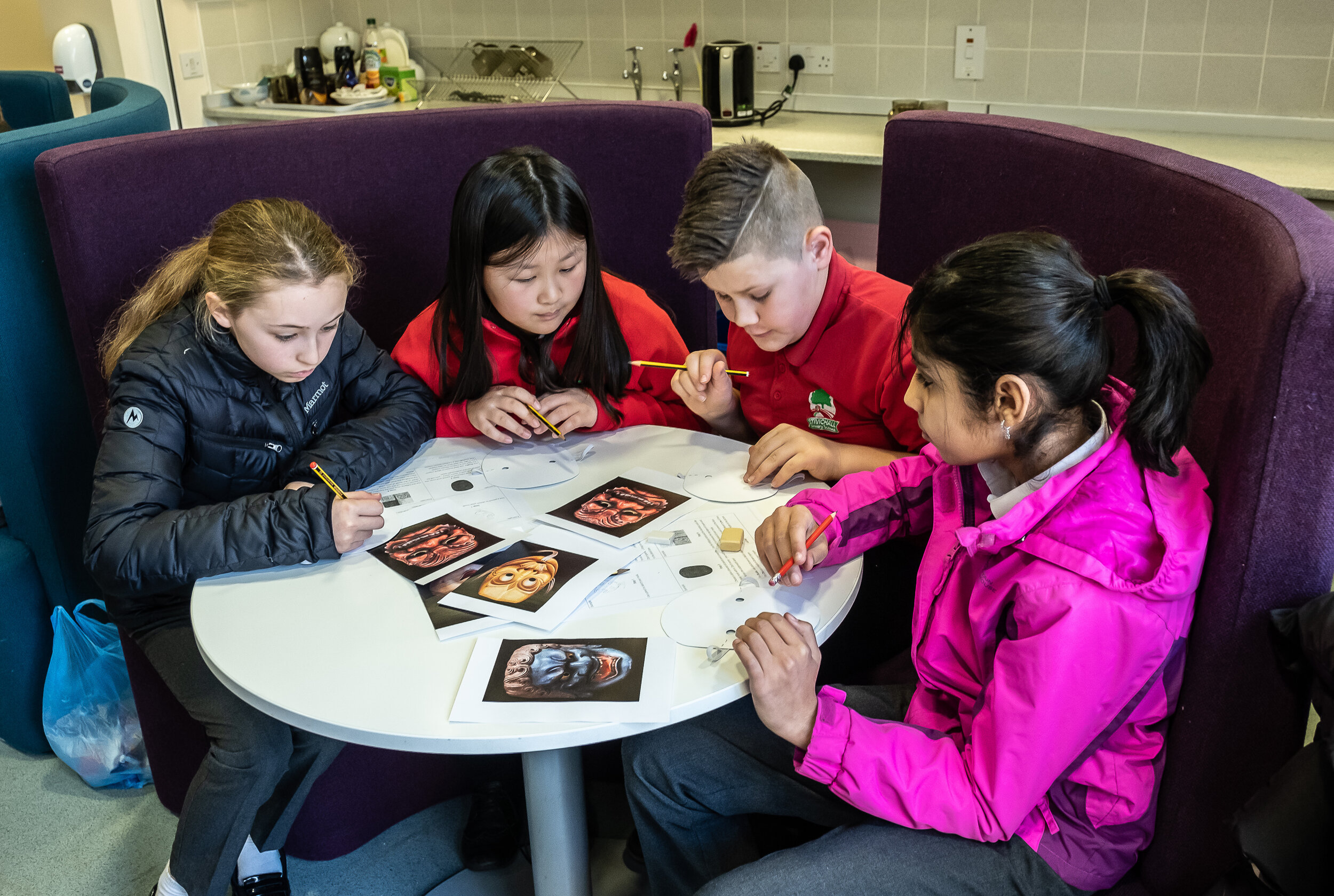
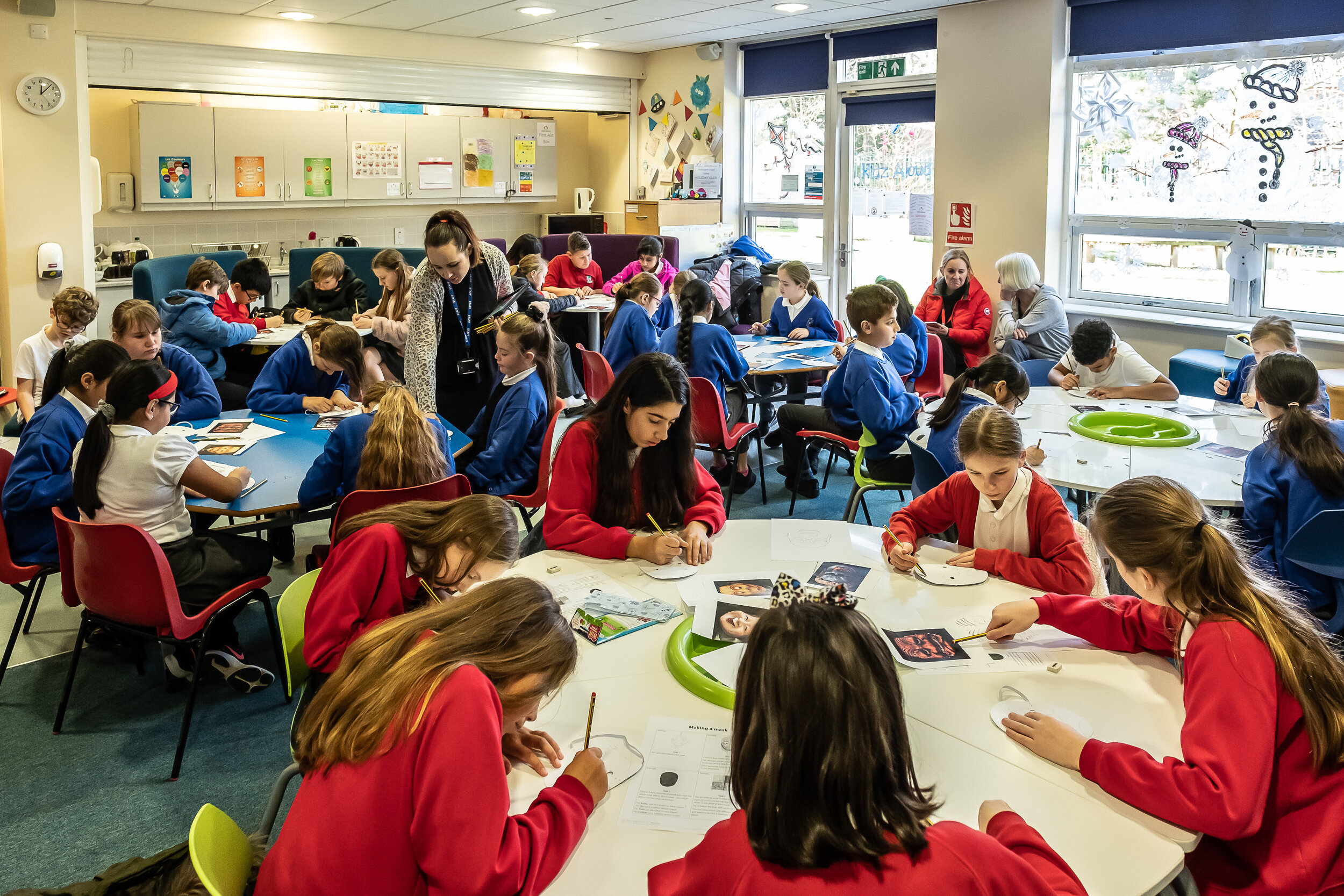
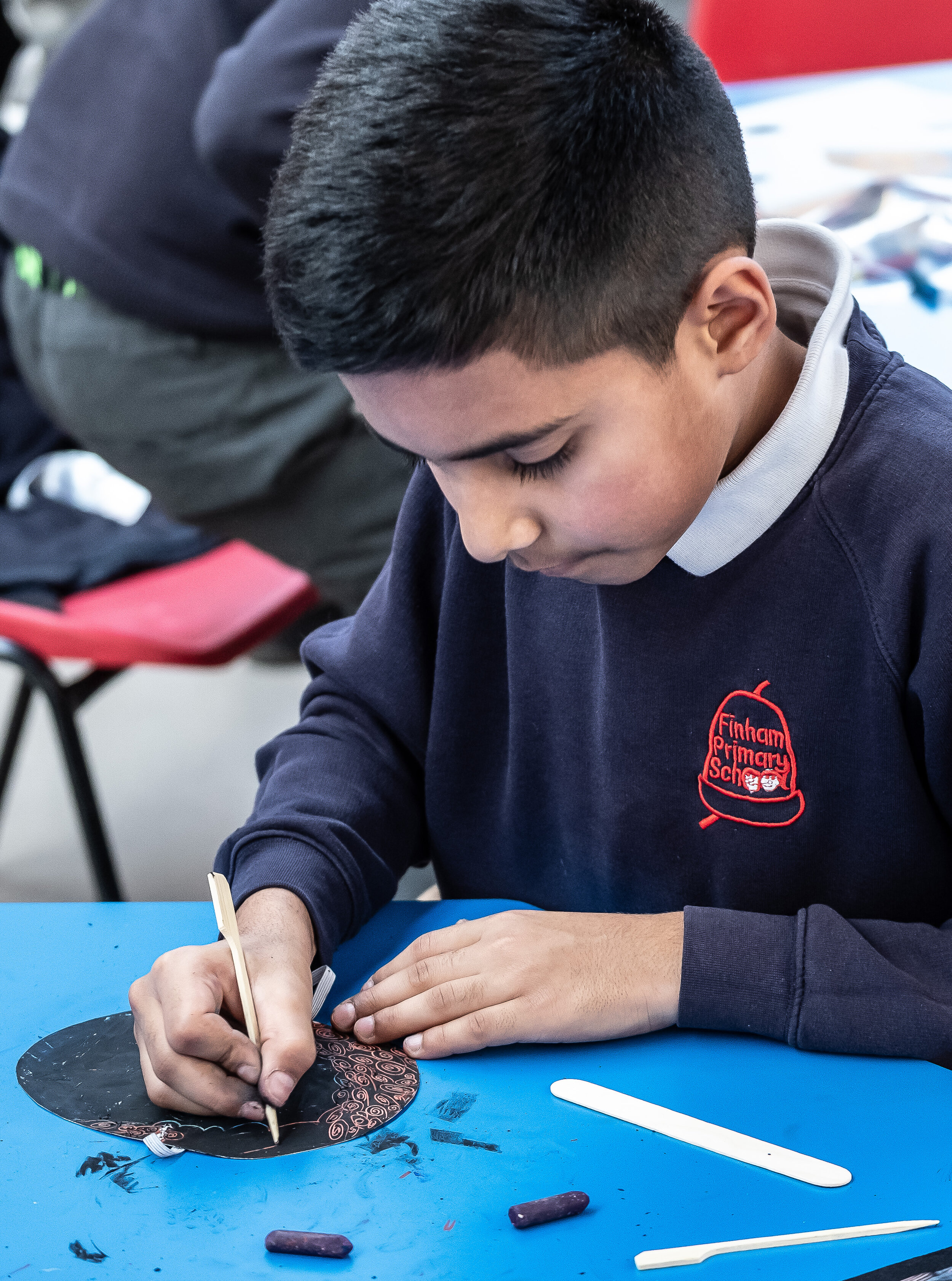
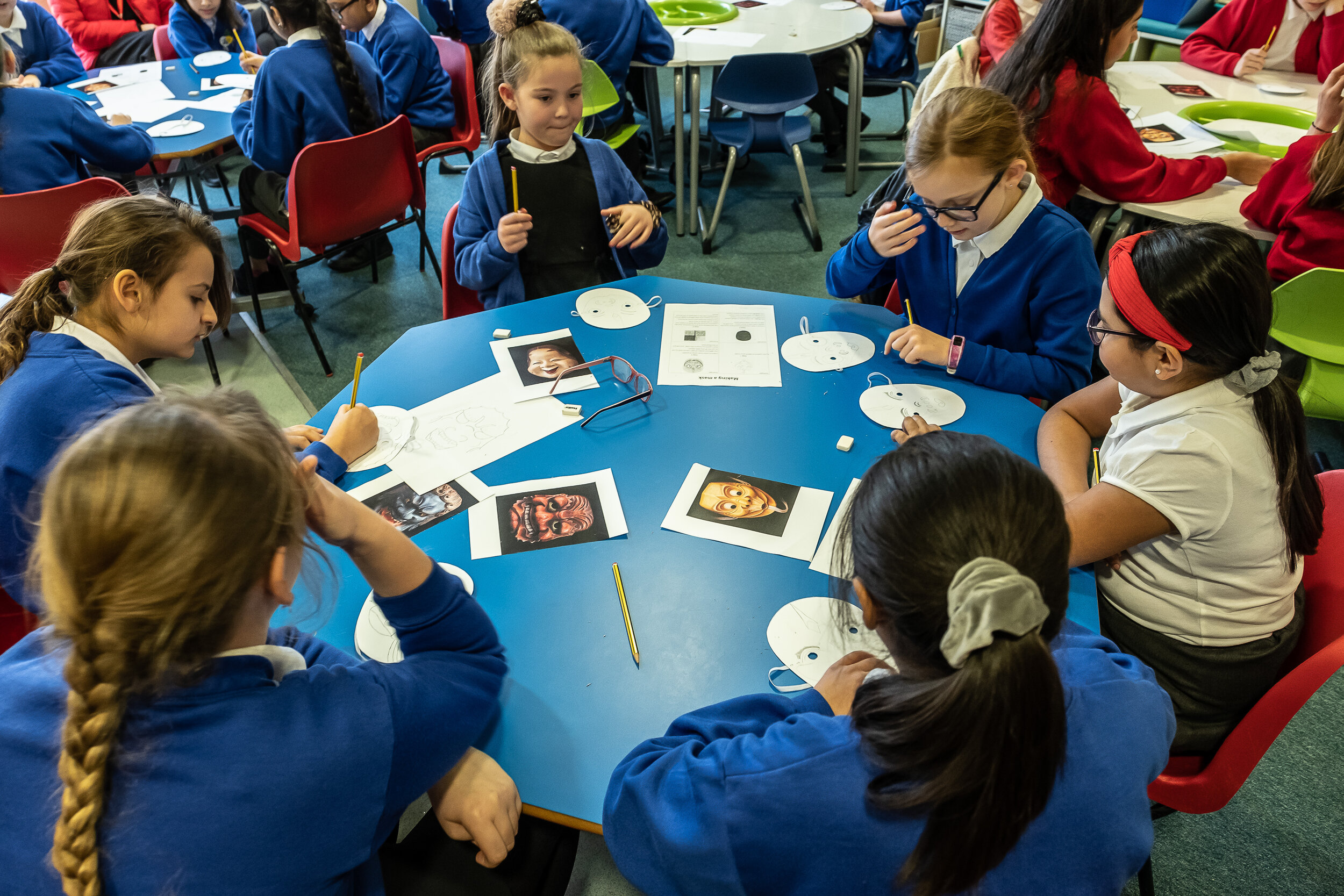
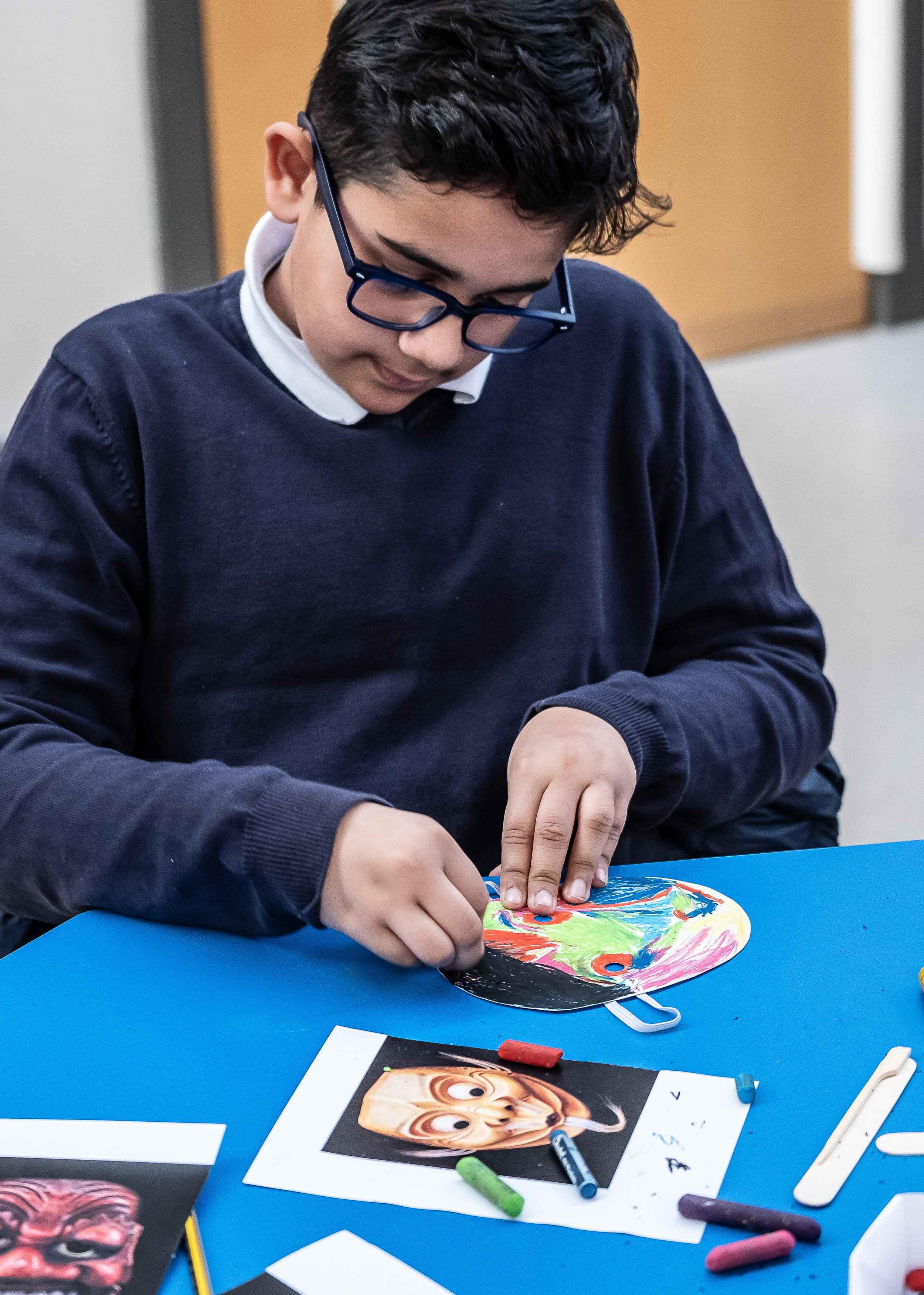
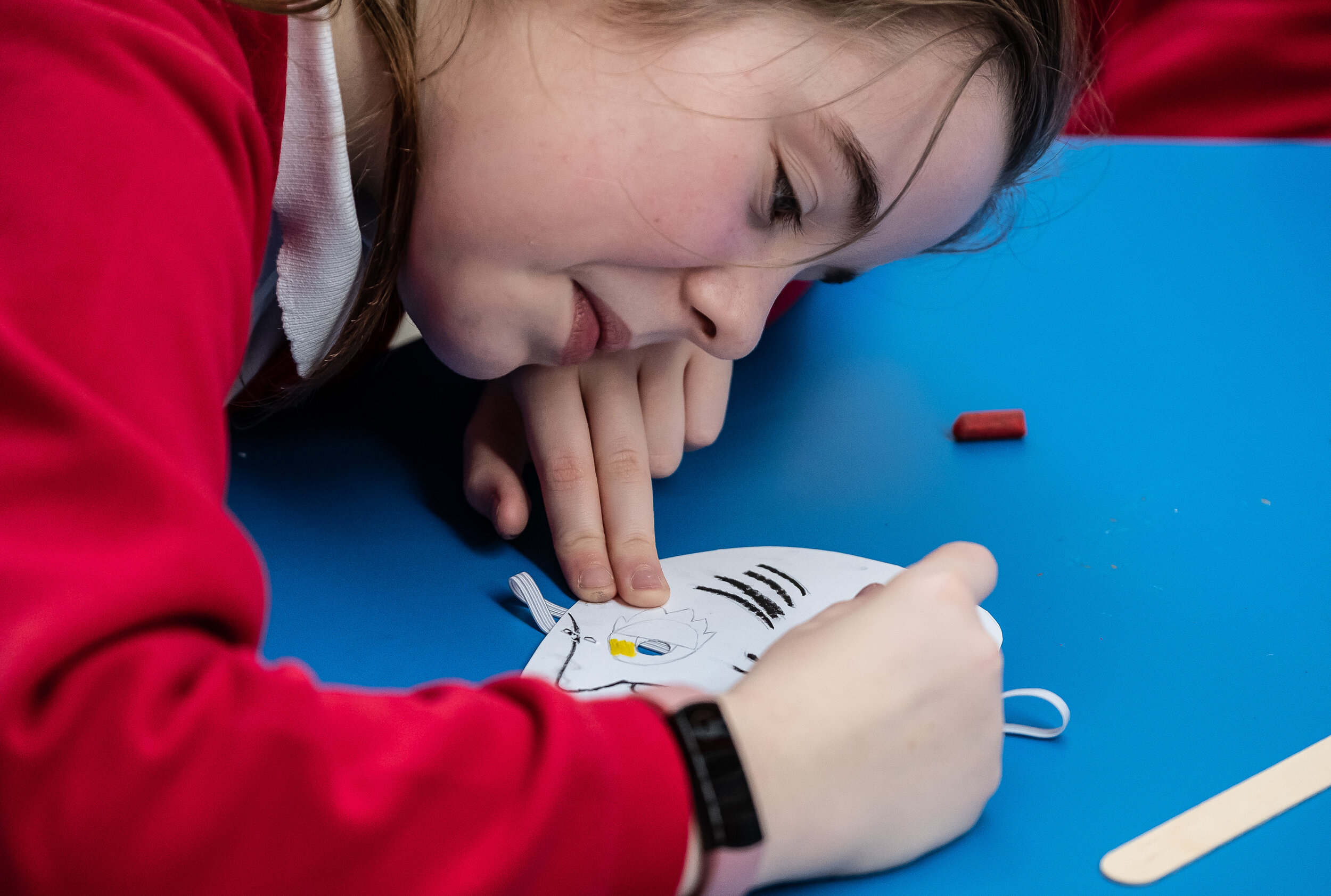
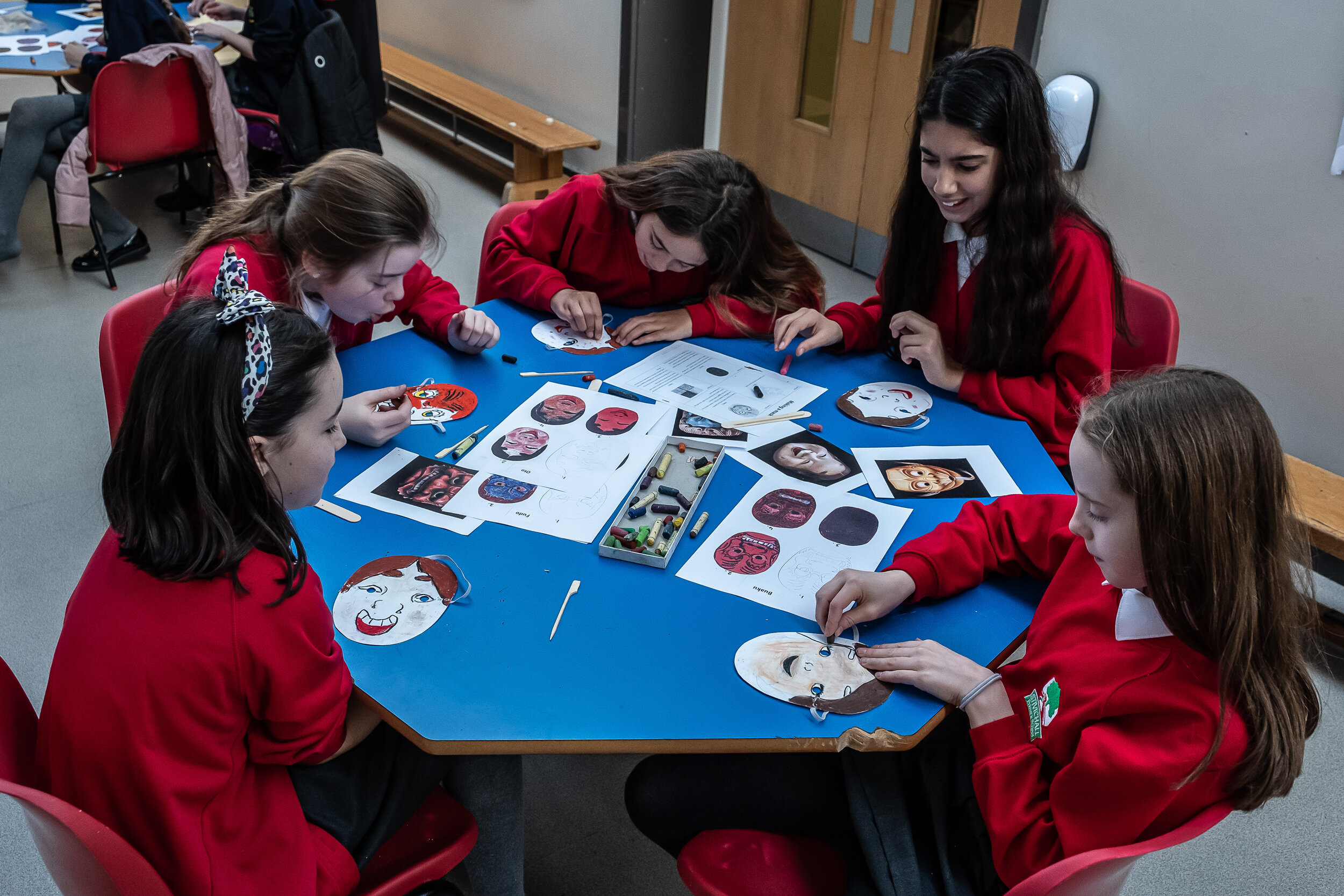
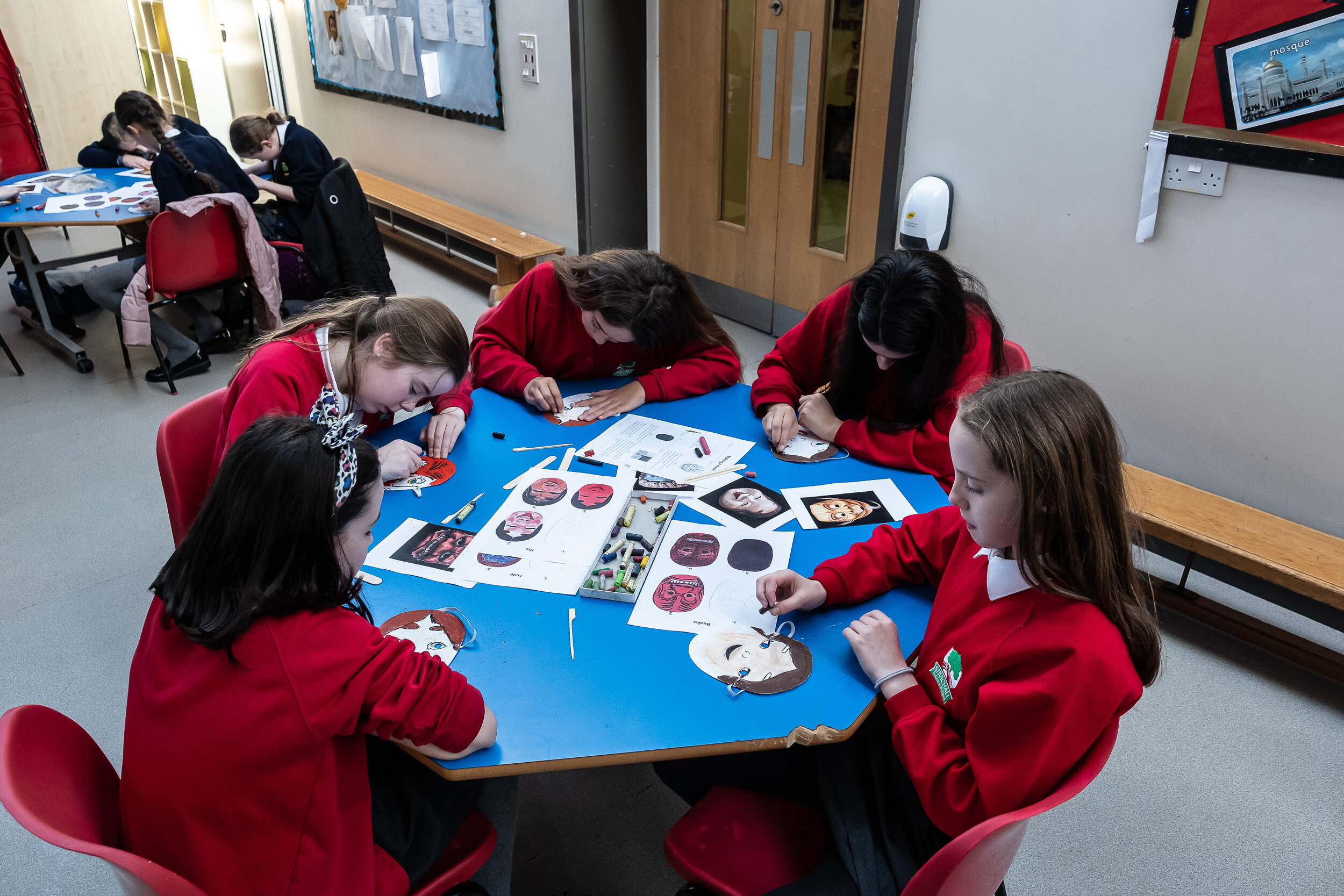
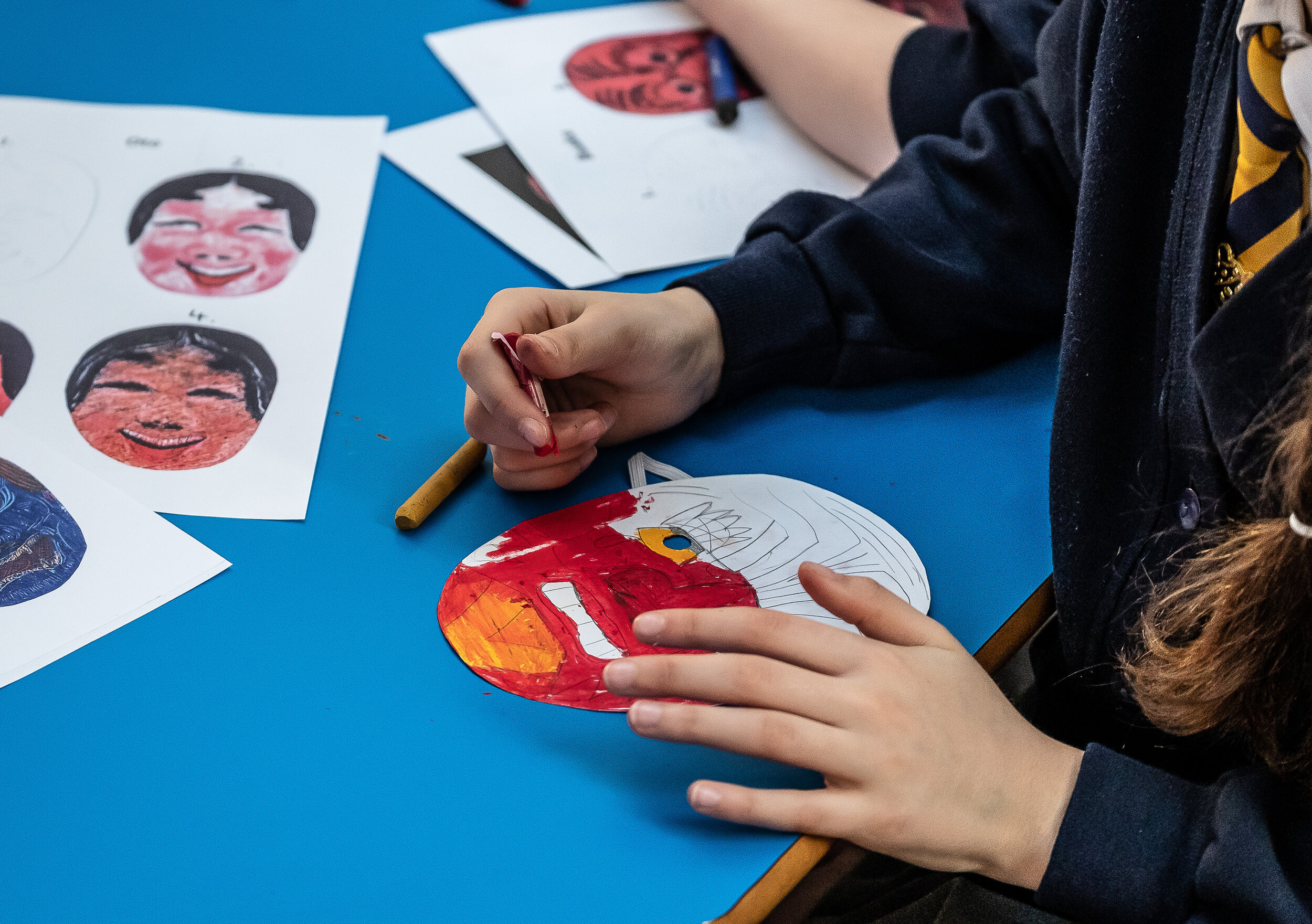
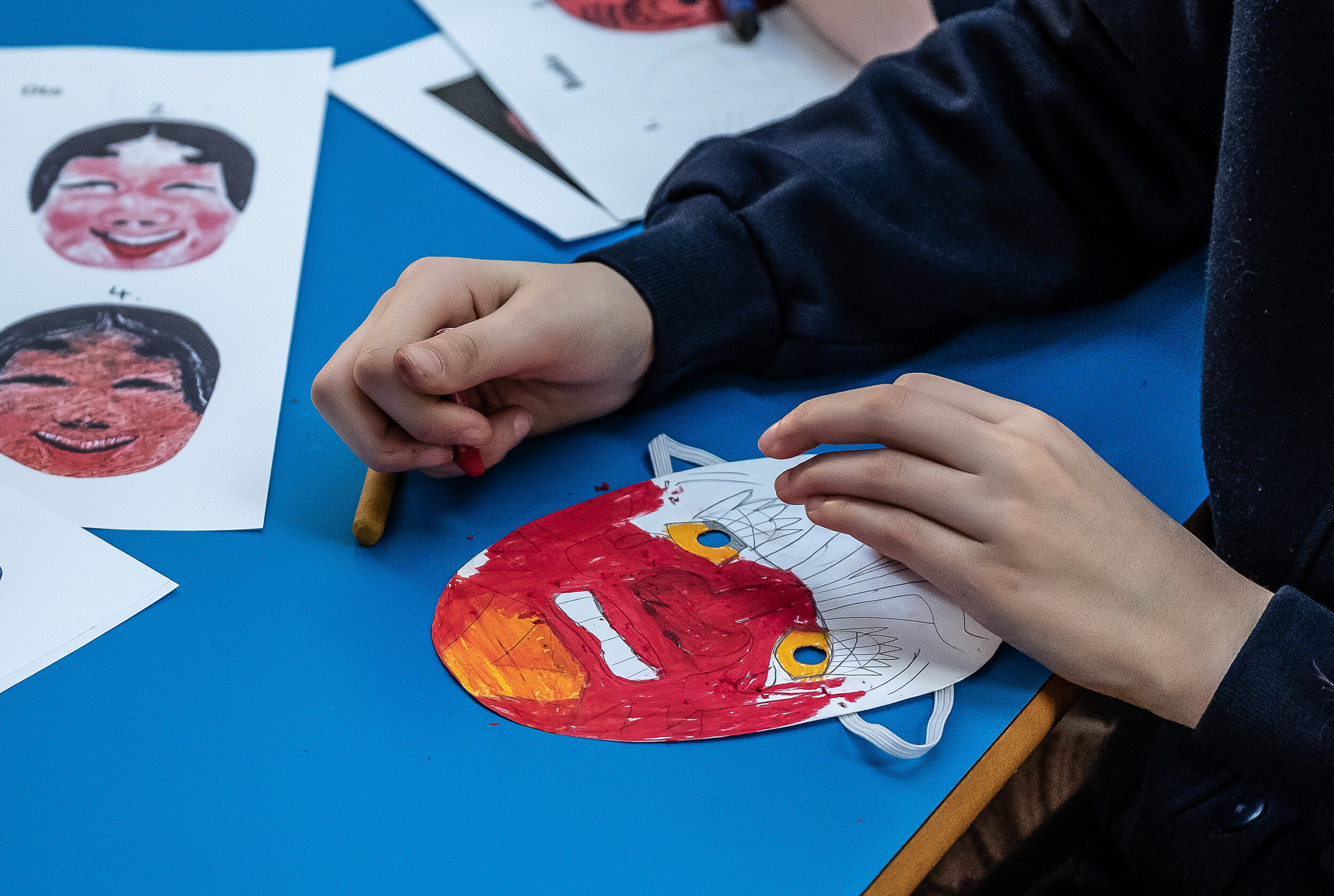
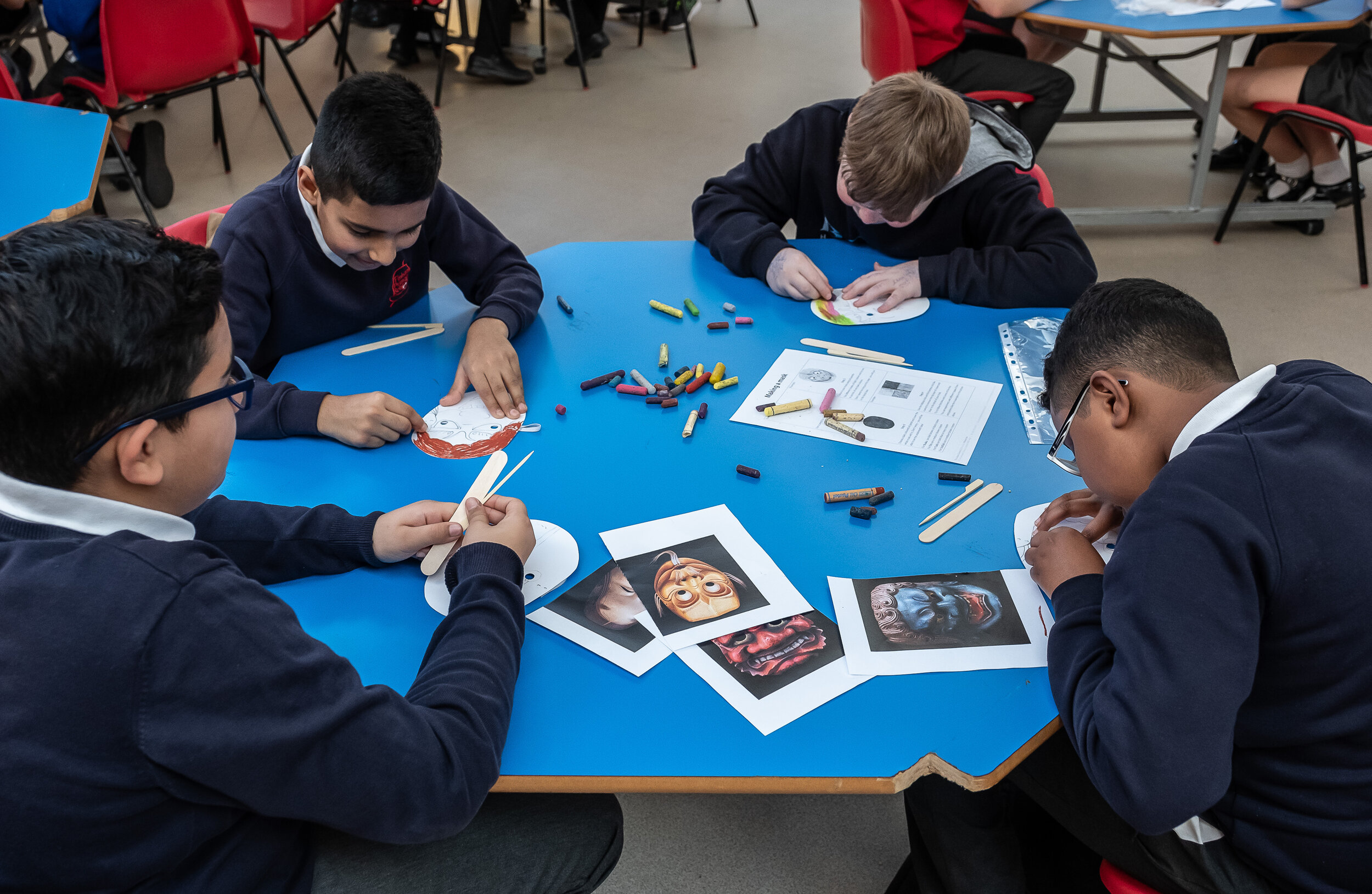
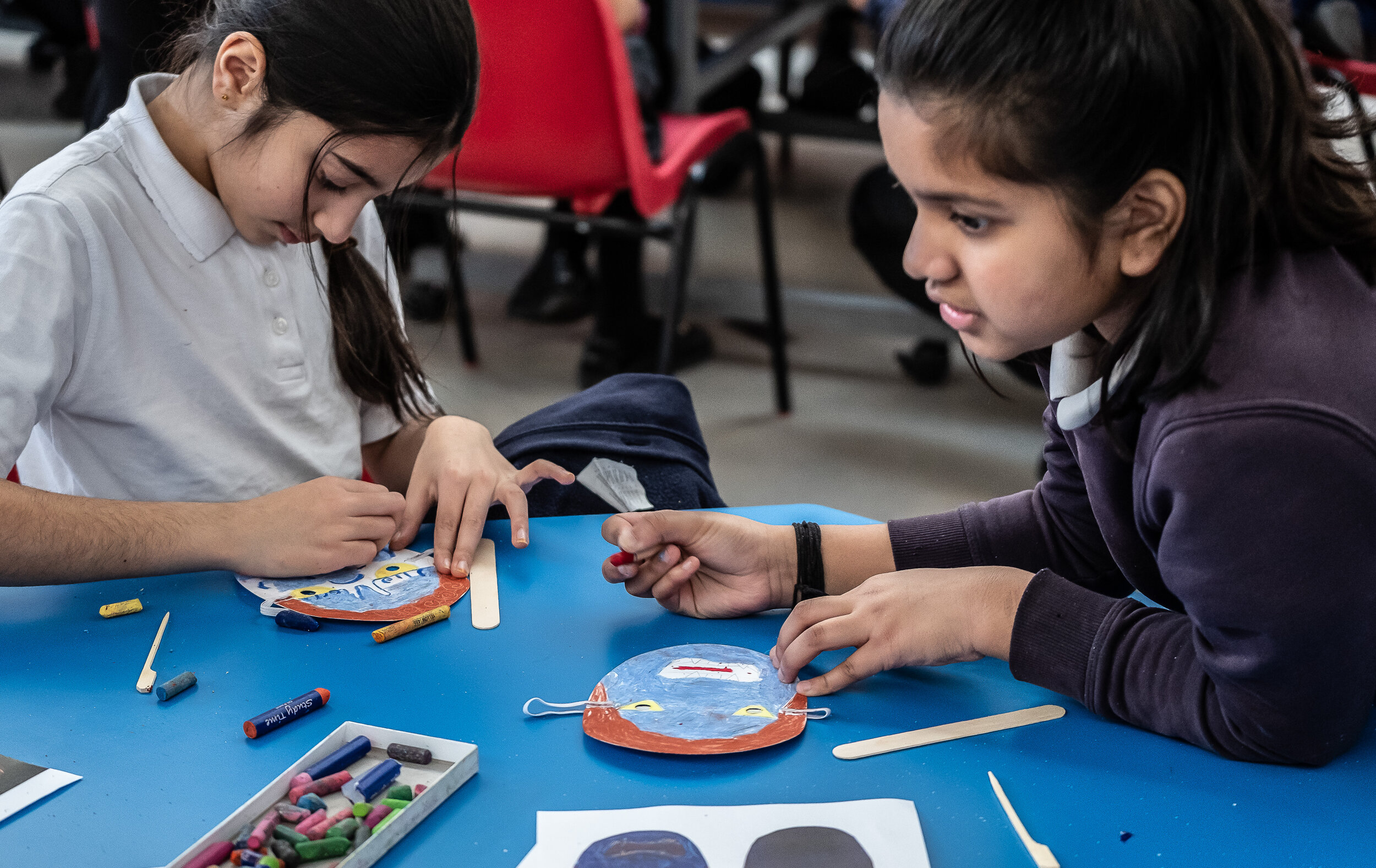
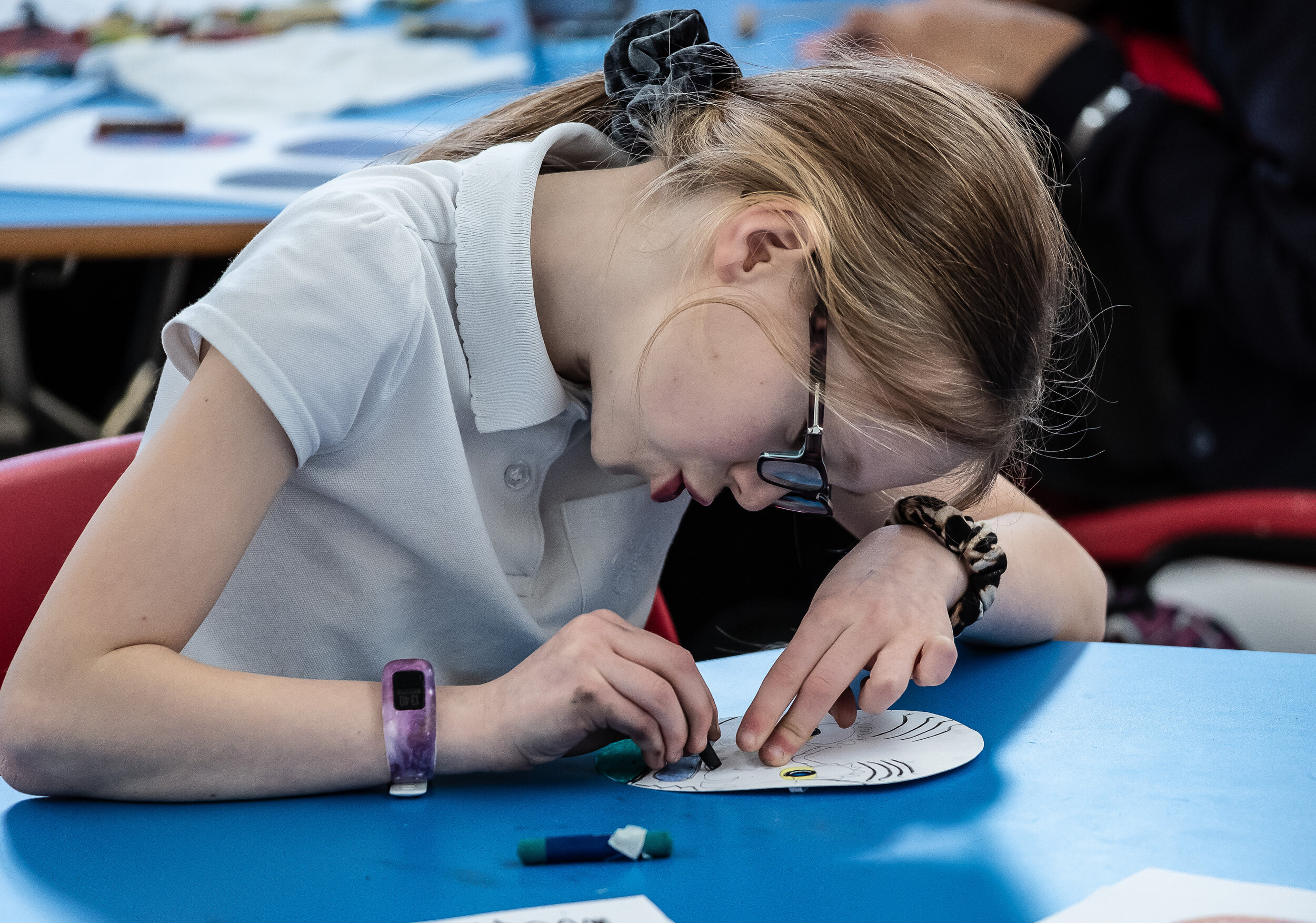
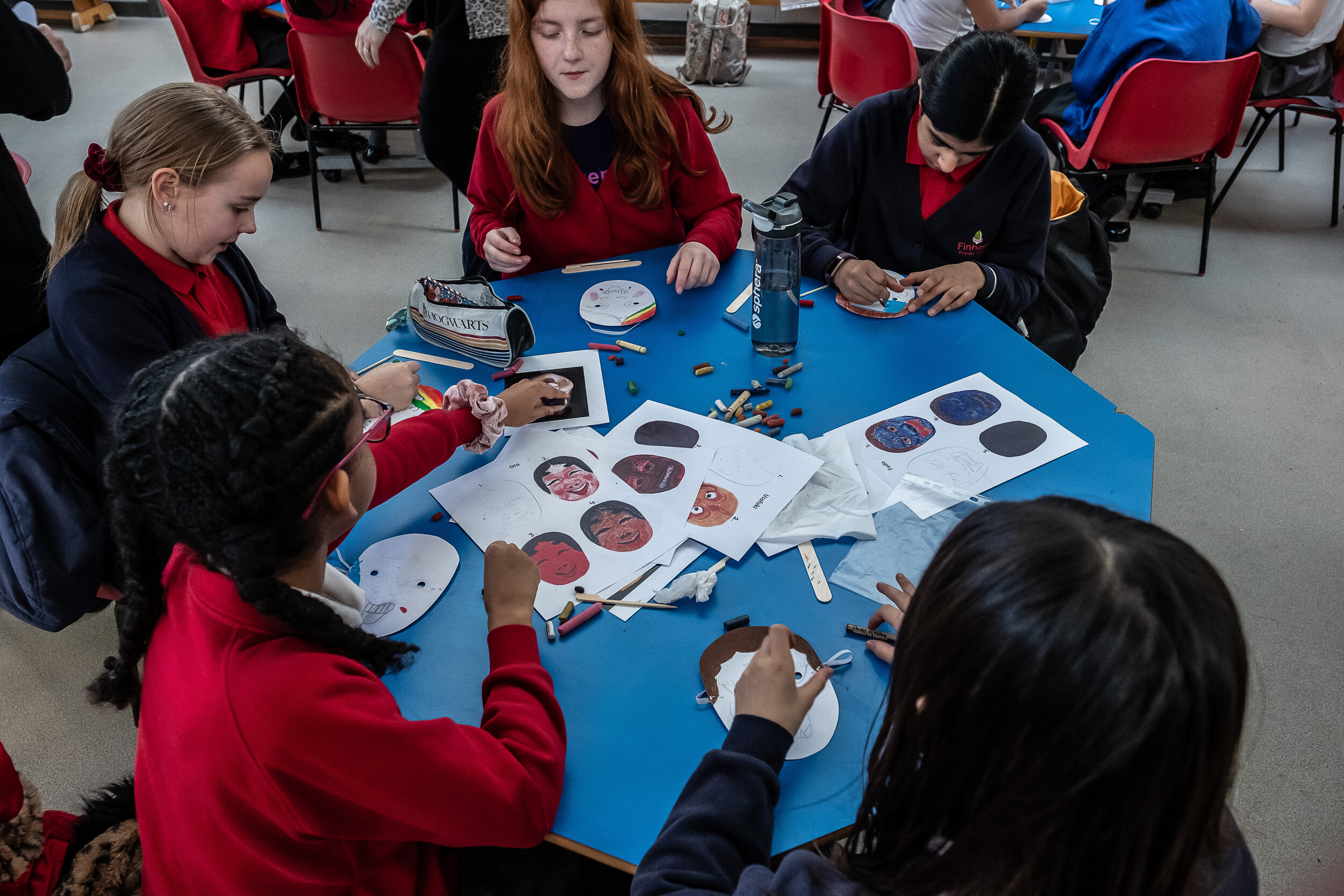
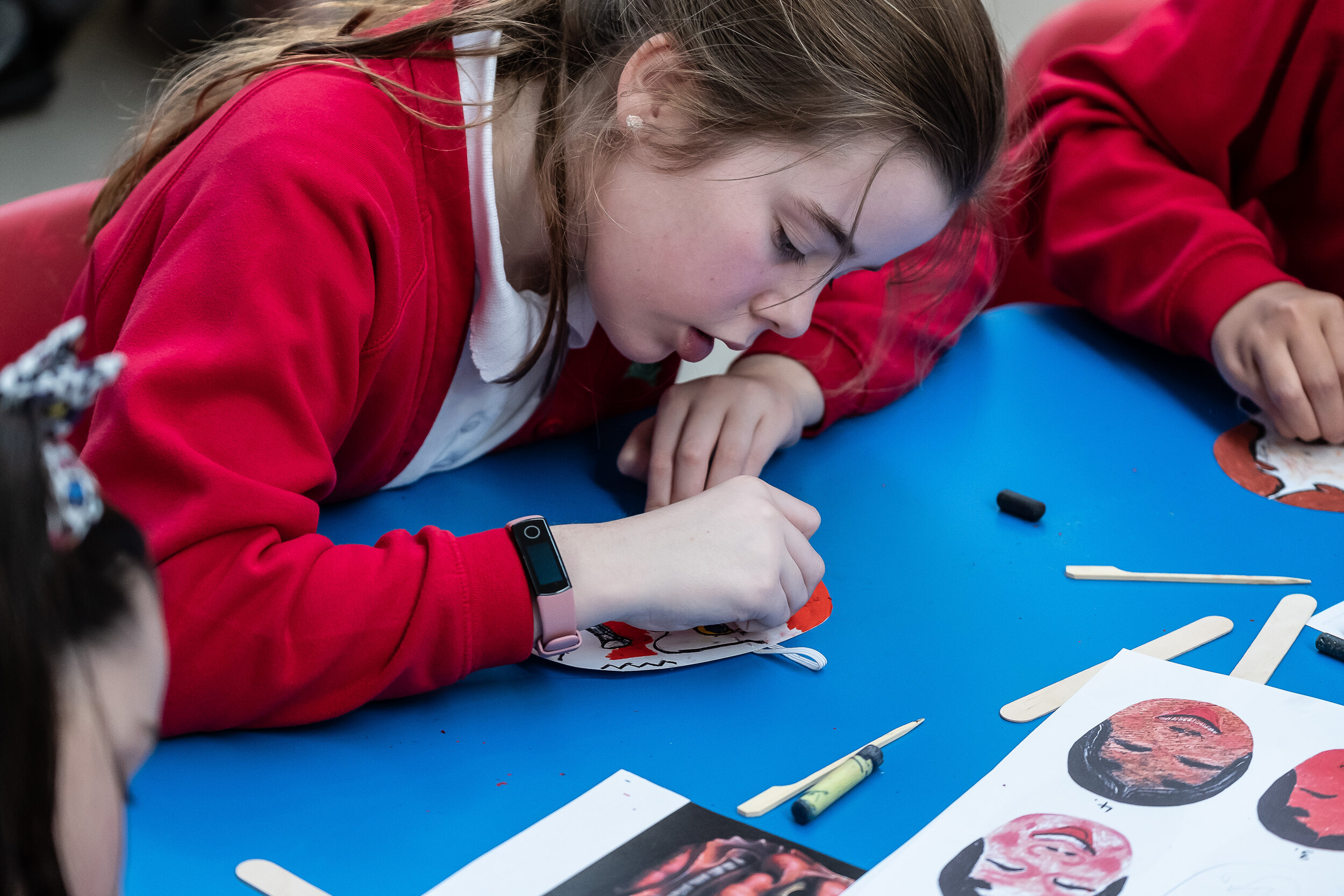
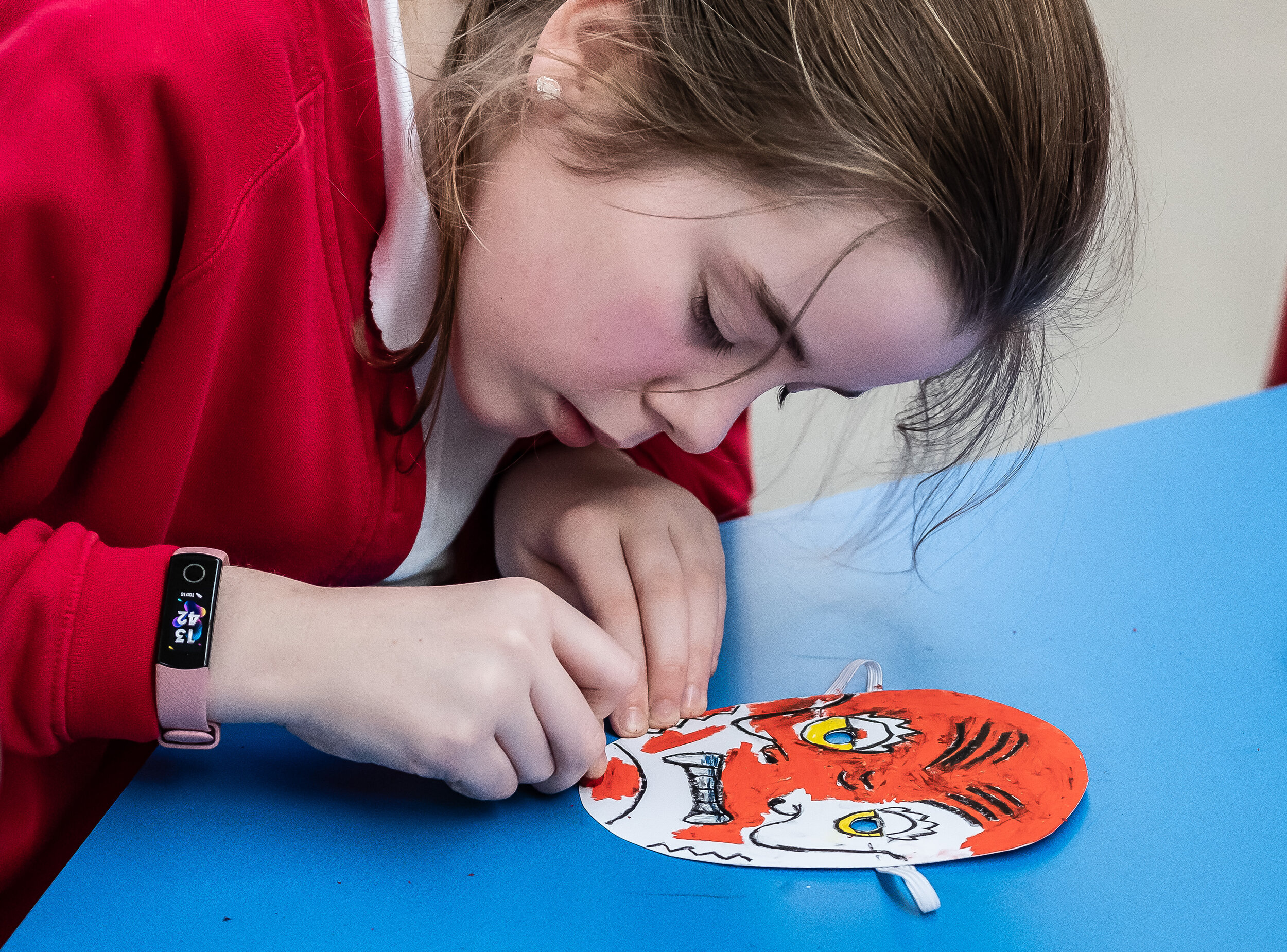
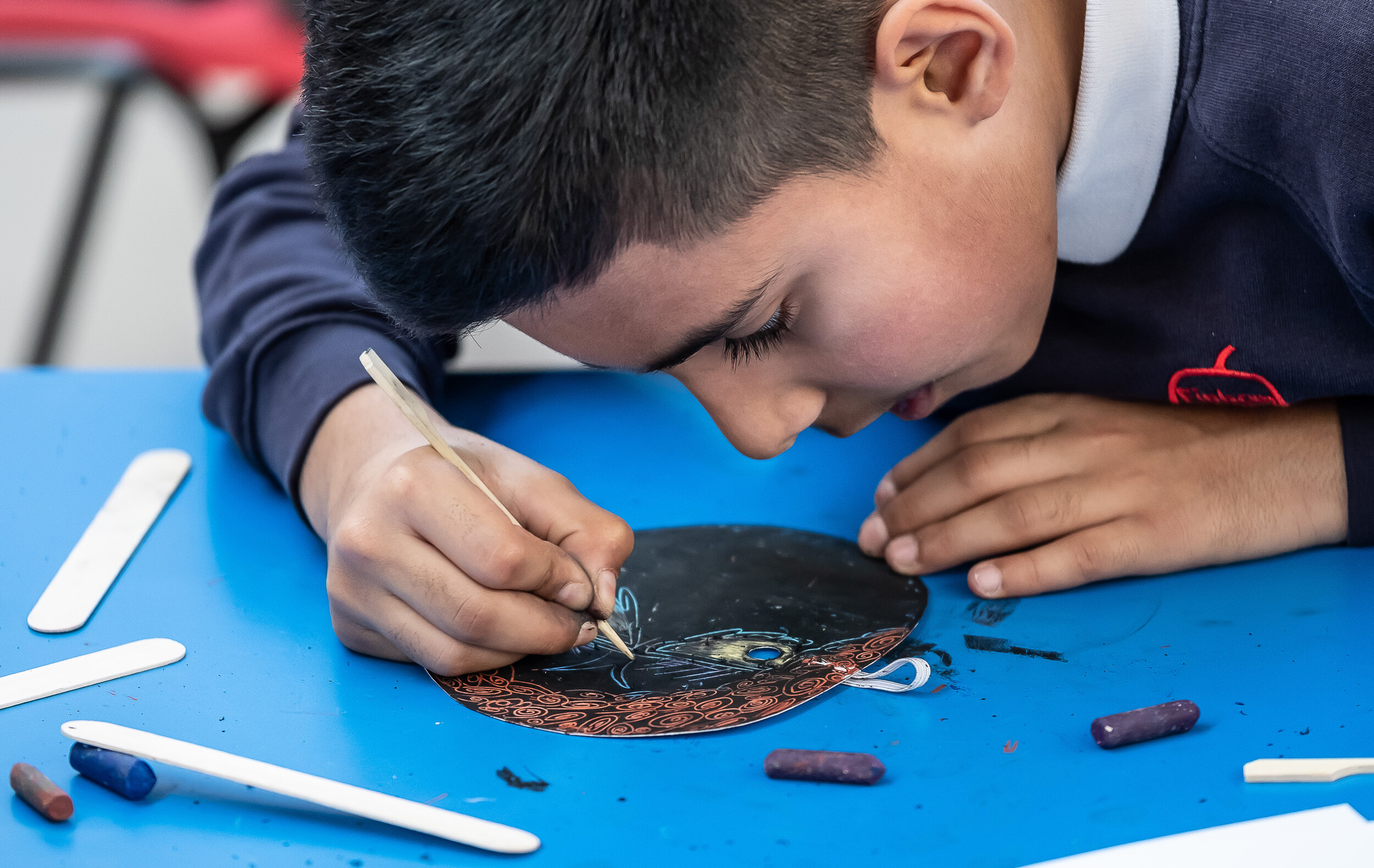
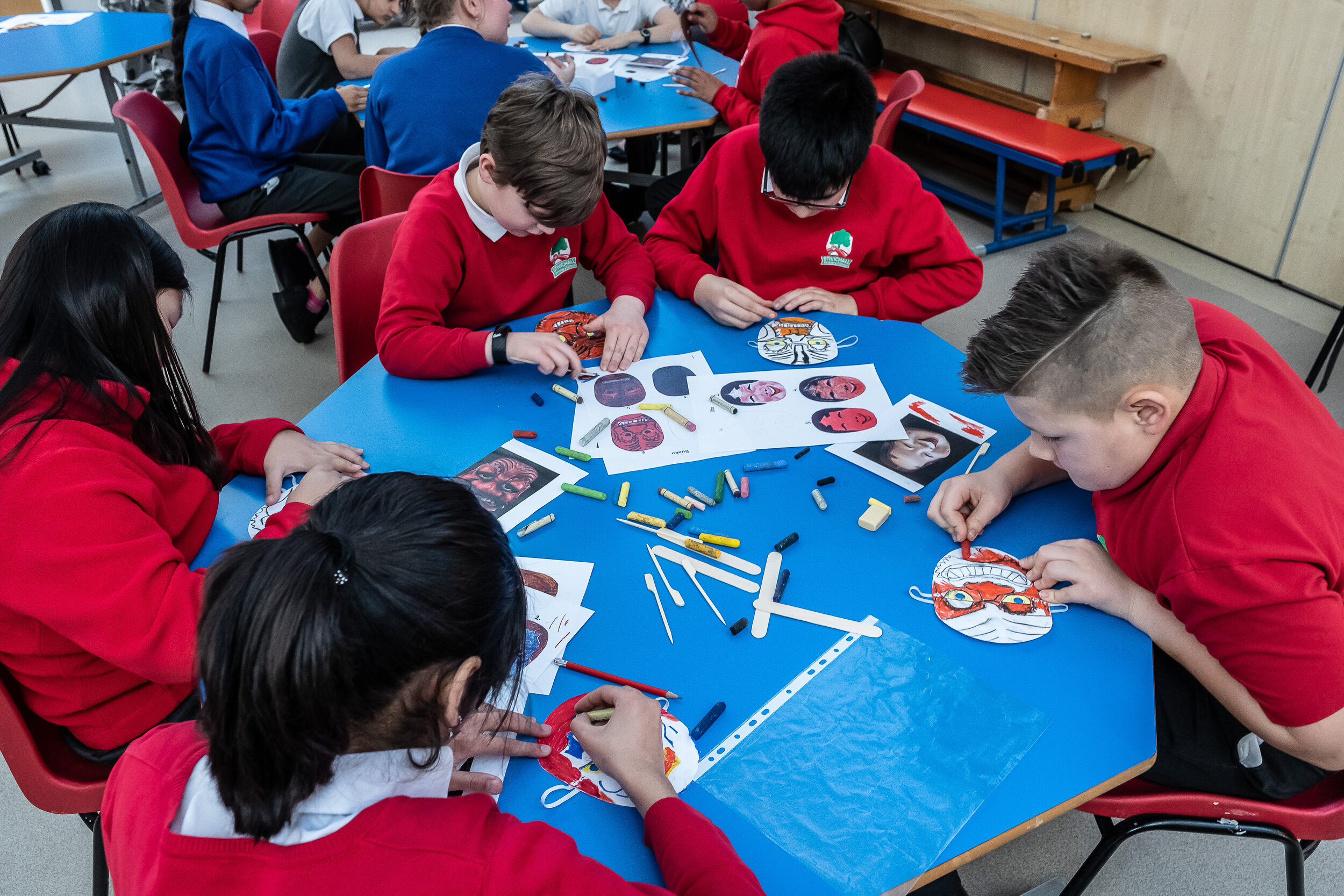
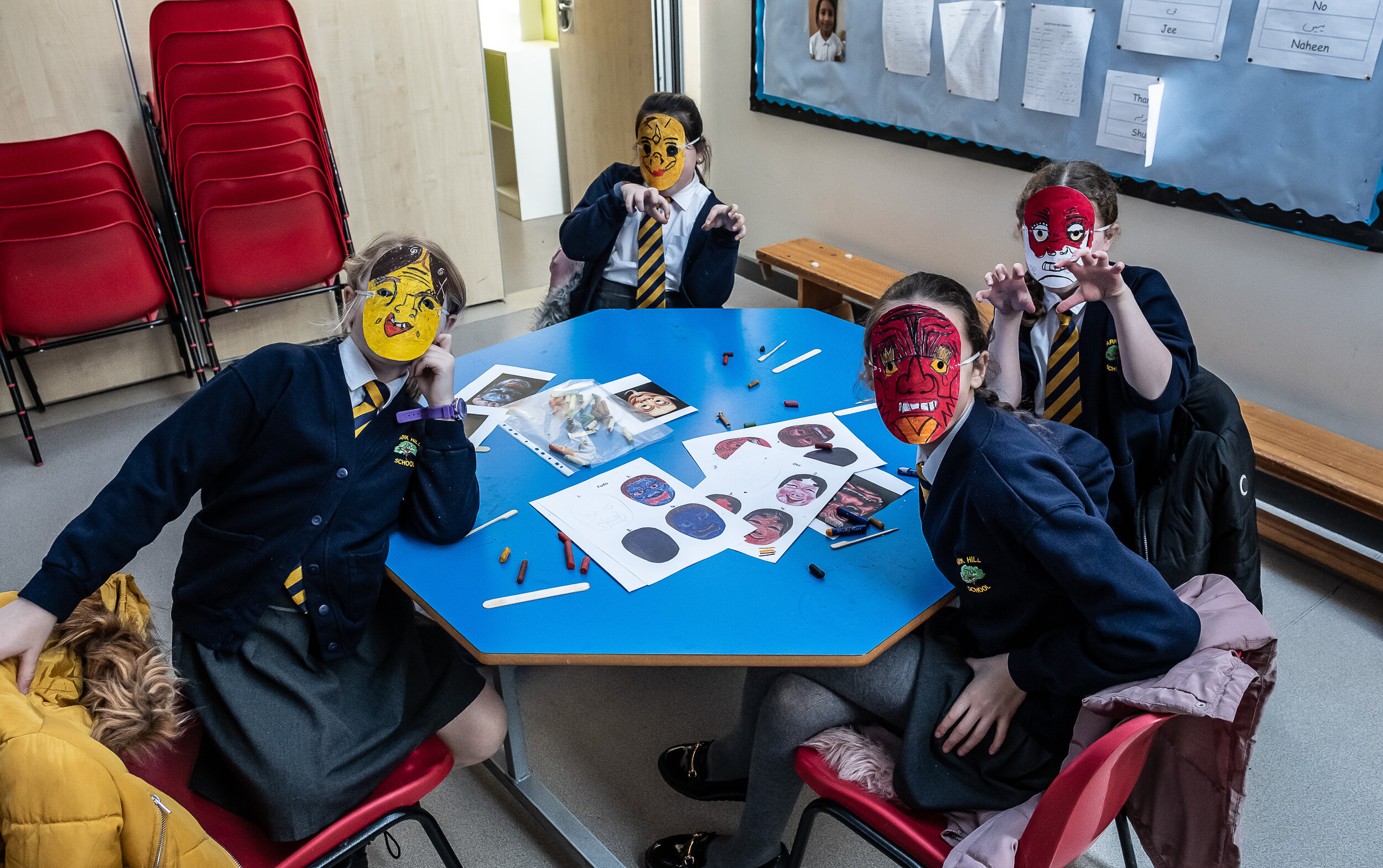
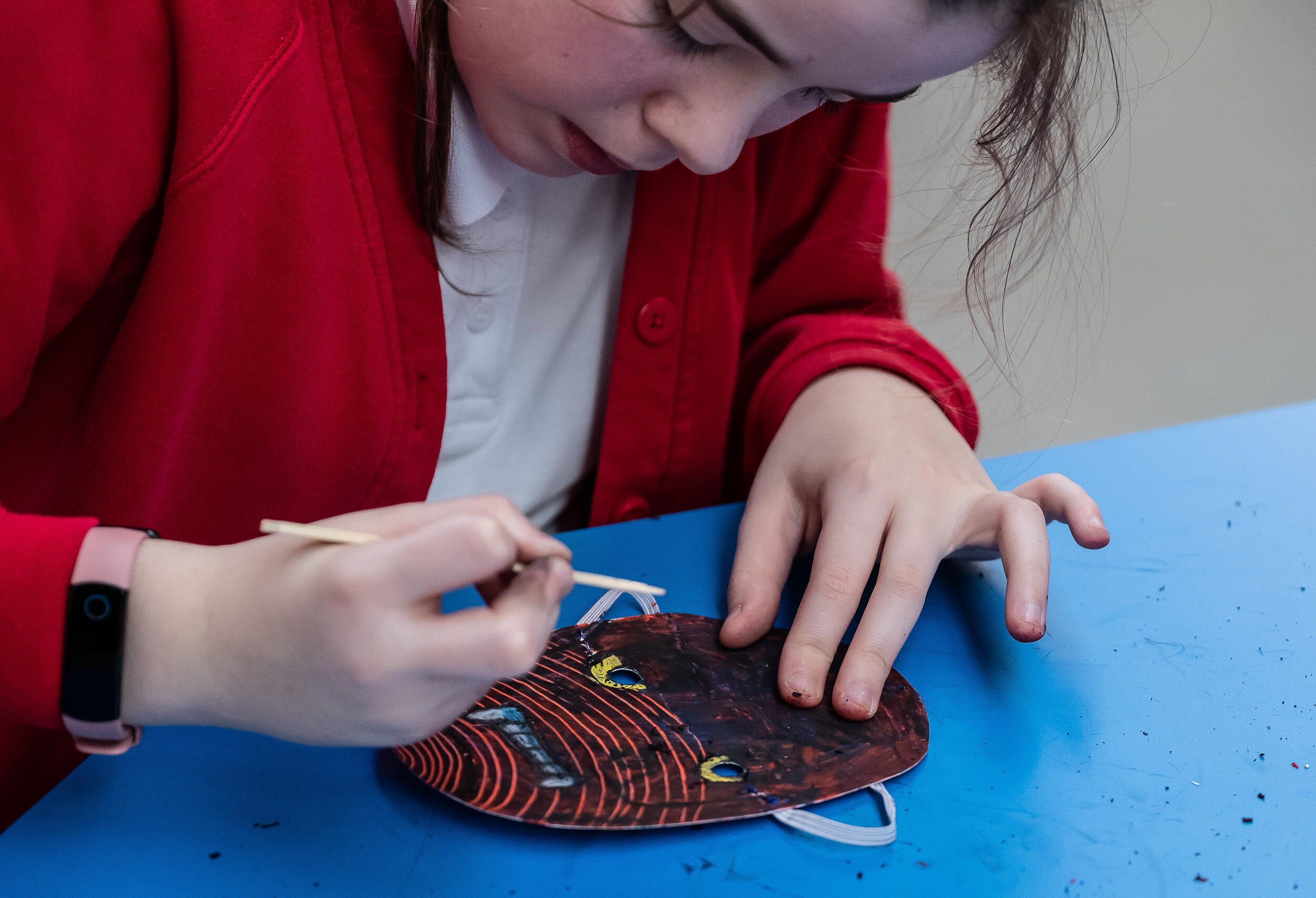
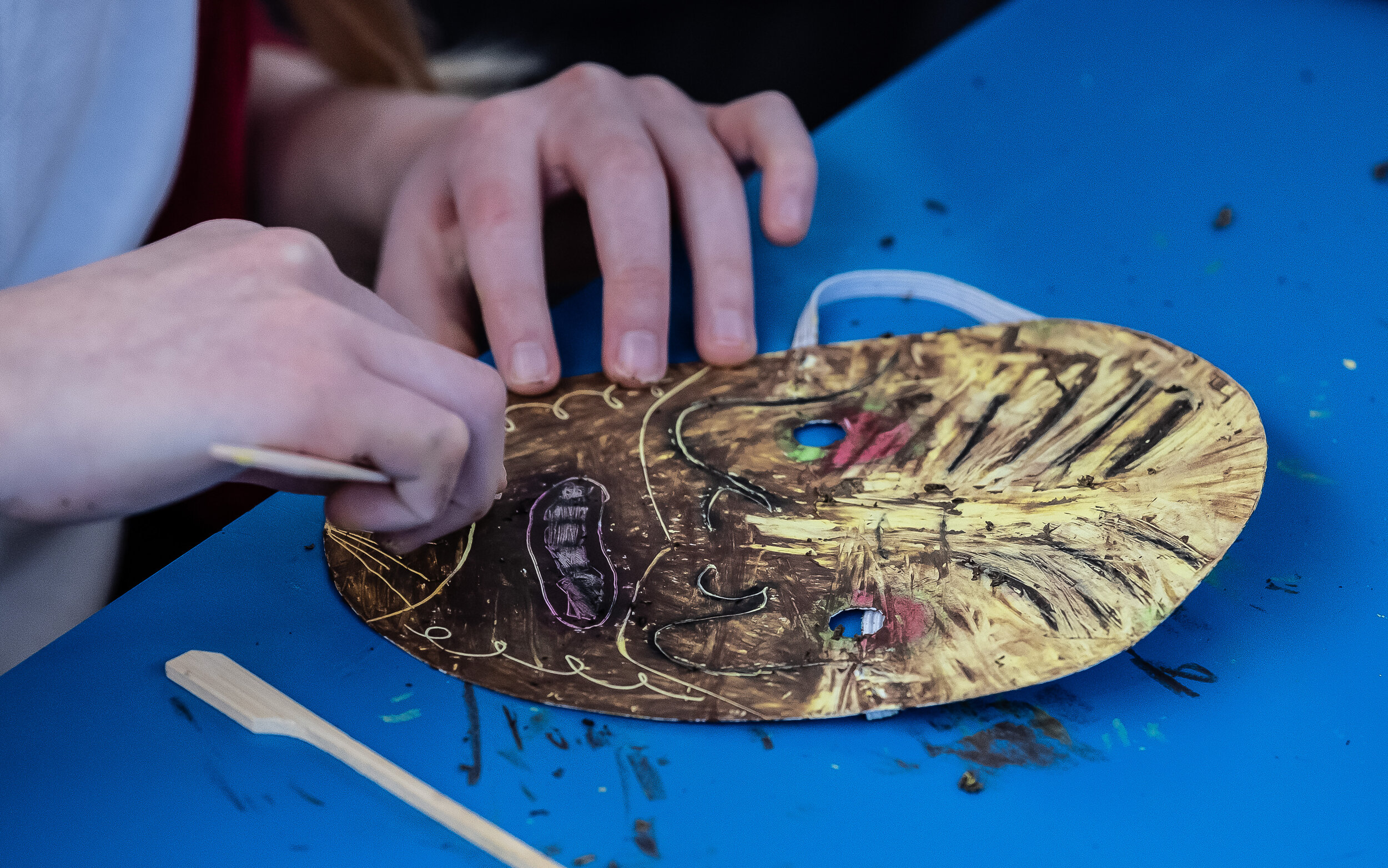
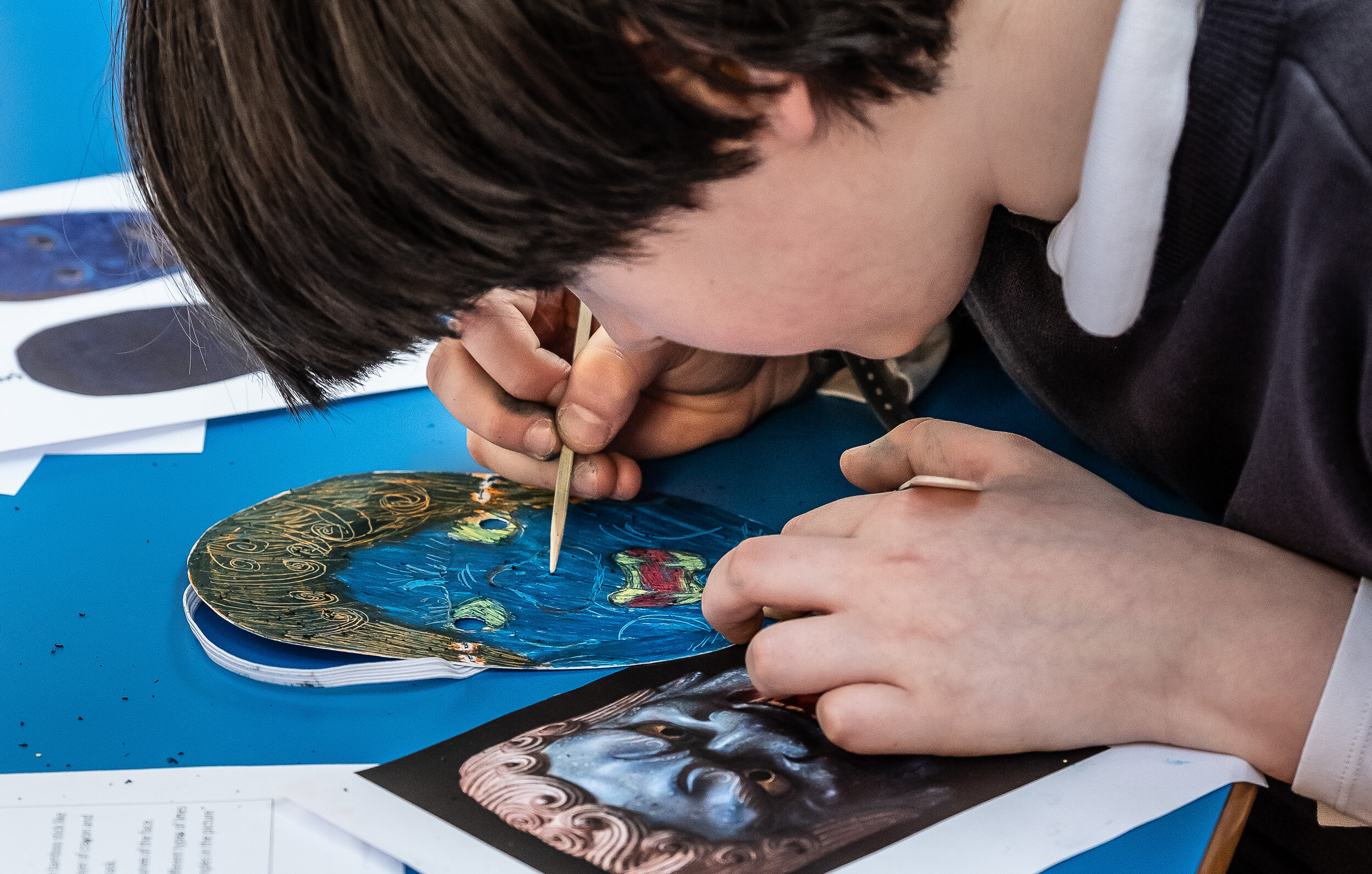
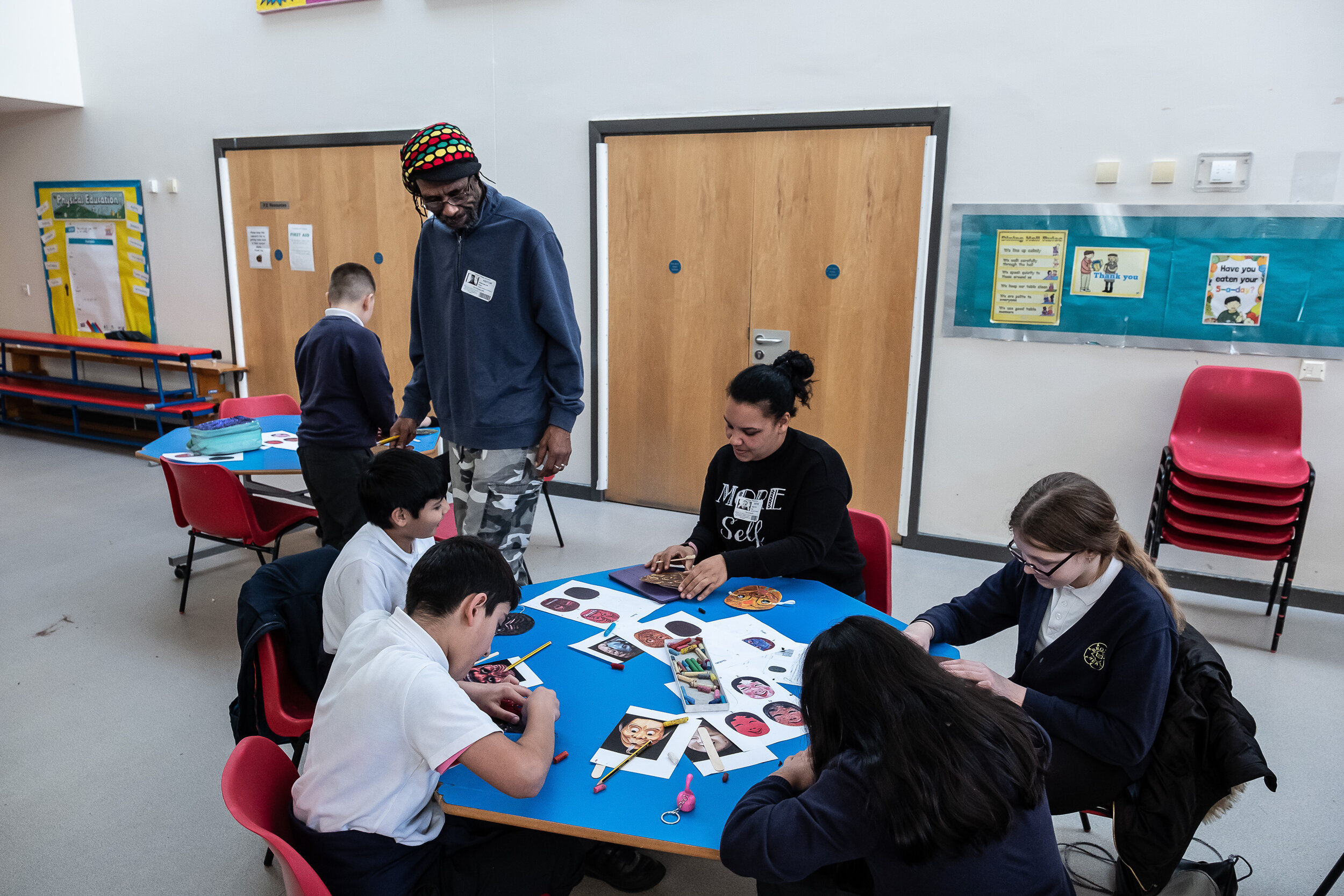
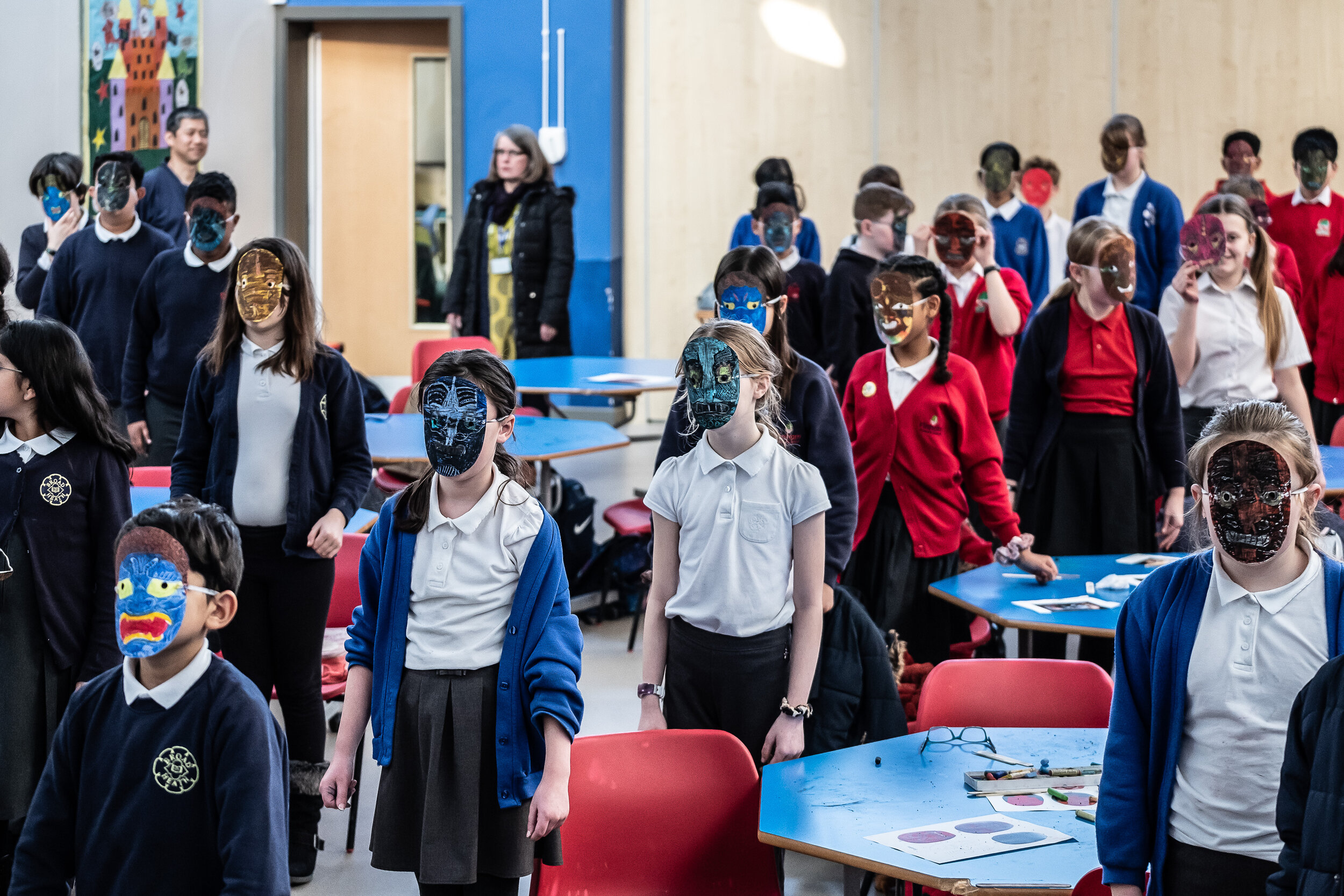
Karesansui (dry landscape) gardens (Peace Project 3)
In the autumn (September onwards 2019), the children began to study karesansui gardens. A Young Ambassadors’ planning group worked with author Jannette Cheong to inspire the design and creation of a full-size children’s karesansui garden for the people of Coventry in the Coventry War Memorial Park – Coventry’s largest city-centre civic park.
The Japanese Garden Society (JGS) was invited to work with the schools and use the children’s ideas and theme of ‘Islands of Peace’ to plan, design and install the Japanese Peace Garden supported by Friends of the War Memorial Park and other JGS volunteers in time for Coventry’s 2021 celebration as the UK City of Culture. The garden was opened by the Japanese Ambassador and the Lord Mayor of Coventry on 2 July 2021.
The building of the garden has being generously sponsored by the Coventry City Council, the National Lottery Awards for All, Great Britain Sasakawa Foundation, the Between the Stones Project and many others.
It is our hope that the Islands of Peace Japanese Garden will be used and have significant benefits to many people locally, nationally and internationally - especially given Coventry’s membership of the International Cities of Peace Project and its close ties with Hiroshima.
The Coventry Japanese Peace Garden is a space for reflection and demonstrates the commitment of Coventry and its children to peace and reconciliation. It is free of charge and open to the public every day.
Key aspects of the children’s initial discussion:
The children discussed the symbolic nature of karesansui gardens and how such a garden can reflect peace and respect nature. They agreed that this was an important connection to their Cities of Peace Project and its links with Hiroshima and Japan.
They agreed on the following key messages for their garden:
understand and respect our fragile planet
create bridges rather than division
reflect on ‘less is more’
They also agreed the key elements for the garden design could reflect in some way that:
our planet is made up of only 29% land mass (islands big and small) and 71% (mostly salt) water
being at peace with ourselves helps us be peaceful with others
the symbolic meanings of trees and nature in Japanese gardens, especially karesansui gardens
nature’s beauty is both complex and simple (we looked, for example, at the Fibonacci spiral in nature’s forms).
The children discussed the importance of people working together, despite living on islands big and small, to find solutions to our common challenges. Then, they explored ways in which these ideas might work in a karesansui garden.
The children agreed the theme Islands of Peace reflected the style of garden and the main message of the garden that as global communities we can live peacefully with ourselves and our planet.
Here are some quotes from the children:
“‘We have to have one bridge to symbolise that we are one world. We are all humans, so we need to get to know each other and understand each other.’
”
“‘The planet is fragile’ If we don’t look after it properly and clean it up, we won’t be able to use it.’
”
“‘The world is fragile .. if there is damage in one part of the world it can impact on the rest of the world.’
’It is important ... we are all humans and if we fight then we will hurt ourselves, animals and the planet.’ ”
“‘If there wasn’t so much plastic lots of animals wouldn’t be dying. ‘less things mean a better life.’
”
“‘I have chosen a ‘heart’ because happiness is in the centre.’
”
“‘You can do little things to make bigger and better things.’”
“‘We have different ways of life, but a bridge unites us all.’ ”
Summary of the children’s key ideas for the design of the full-size garden:
A mindful space: the children thought it was important that the garden can be a place for children and adults to use as a ‘thinking’, mindfulness space. The peaceful, serene quality of a karesansui garden creates such an environment.
A vast expanse of water (the gravel symbolises water) to represent the oceans.
Seven islands big and small represents seven continents. Include ‘crane’ and ‘tortoise’ stones - these are large tall and flat stones symbolic of longevity and peace in karesansui gardens. The limited plant ground cover will also symbolise the scarcity of land resources.
Beautiful representations of numbers in nature such as the Fibonacci spiral.
A bridge to symbolise the need to create bridges rather than division around the world
Gingko tree(s) for a direct link between Coventry and Hiroshima as 170 gingko trees survived the atomic bomb. The gingko is also a link with the Between the Stones story, which inspired the Coventry Cities of Peace Project.
One heart is the soul of the garden. Combining ‘heart’ with the ‘bridge’ (the flat horizontal line of the bridge resembles the kanji/character for the number ‘one’) creates ‘one heart’. This was inspired by 10-year old Cameron’s comment that ‘happiness is at the centre, or core of the heart’. It also builds on the comment that having one bridge gives a strong focus to the fact that we are one planet.
Something special: Taitum stated that, ‘our garden should have something that makes it stand out from other karesansui gardens - something different’. So we thought the bridge might perhaps appear to be floating to emphasise the fragile nature of humanity’s efforts to both protect our planet and create bridges rather than division around the world.
The Coventry Young Ambassadors’ Garden Planning Group
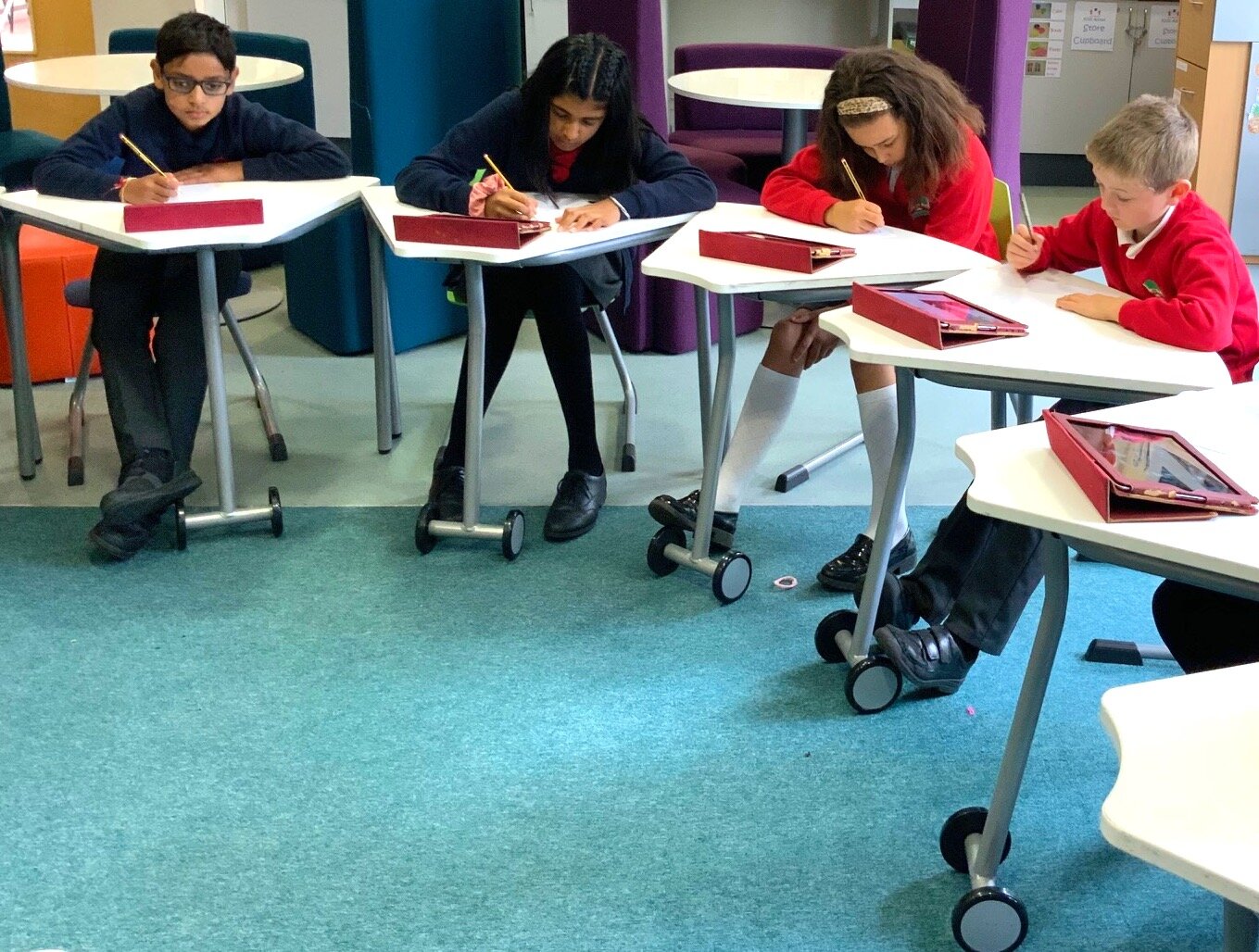
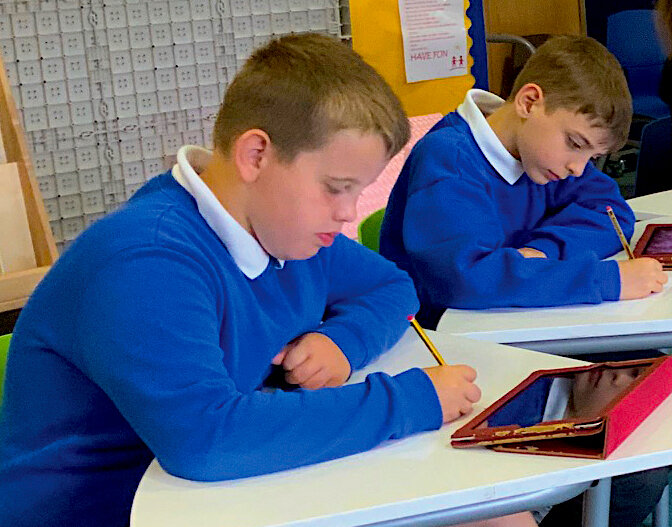
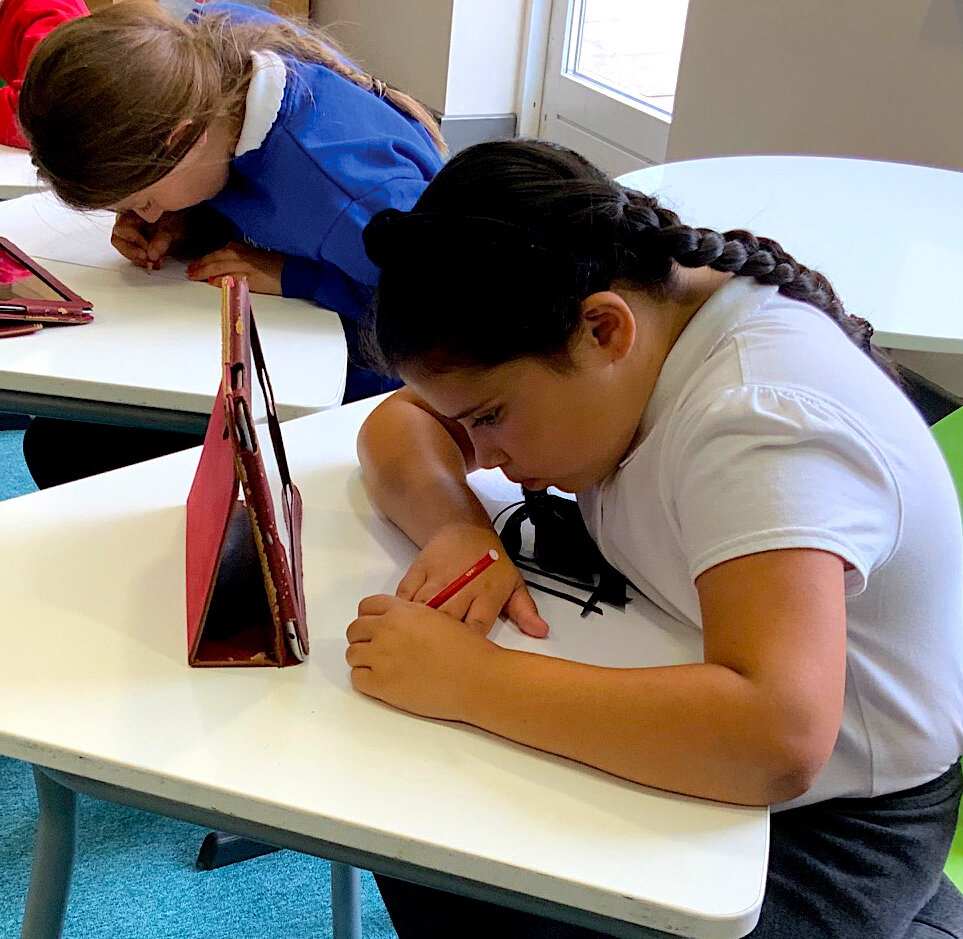
The two gardens which inspired Peace Project 3, and which feature in the story of Between the Stones:
UNESCO heritage karesansui garden at Ryoan-ji Temple in Kyoto
One of the two gardens that feature in Noh play Between the Stones. This is a world famous model of the type of garden the Coventry Young Ambassadors wish to leave as a legacy of their work for the people of Coventry.
A section of the Garden of Three Stones karesansui garden
This is the second garden which features in the Noh play Between the Stones. This image also depicts the ginkgo leaf ‘winter butterflies’, symbolic of the memory of lost loved ones which feature towards the end of Act 2.
This noh draws on the ‘setting of the stones’ - the creation of gardens - and the solace and space they provide for reflection. At the end of the noh play the traveller realises that two gardens far apart share a legacy of enduring peace, beauty and love.
The Coventry Young Ambassadors Islands of Peace Japanese Garden
The creation of the beautiful Coventry Young Ambassadors’ Japanese Garden, called Islands of Peace, is located at the Coventry War Memorial Park, a major public park in the centre of the City of Coventry, an International City of Peace. The garden continues the idea of gardens far apart sharing a legacy of enduring peace, beauty and love…
Islands of Peace Japanese Garden, Coventry
The Coventry Japanese Peace Garden, seen here under a blanket of snow in January 2021.
Building the Coventry Young Ambassadors Japanese Peace Garden
The building of the Coventry Young Ambassadors Japanese Peace Garden, Islands of Peace, is the culmination and legacy of the Cities of Peace Project. It is now a permanent Japanese Peace Garden located in the City of Coventry at the War Memorial Park for the people of Coventry and its many national and international visitors. The garden is based on the inspiration and ideas from the Coventry Young Ambassadors’ working with Between the Stones’ author, Jannette Cheong.
Jannette invited the Japanese Garden Society (JGS) to help realise the project. Graham Hardman, Honorary Vice President and former Chairman of the Society responded initially and brought in renowned garden designer, Robert Ketchell to lead the design work.
The project has been realised by Rebecca Bollands, Deputy Head of one of the schools involved, working with Graham Hardman on behalf of JGS and Robert Ketchell who designed the garden using the children’s ideas and inspiration.
The building of the garden has involved the local community, the Coventry schools and construction workers from sponsoring companies, supported by volunteers from the War Memorial Park and members of the Japanese Garden Society led by Graham and Robert. The building of the garden would not have been possible without the support of many sponsors brought to the project by Rebecca, Graham and Jannette.
The following people and organisations have given generously of their time, energy, commitment and resources to the building of the Coventry Japanese Peace Garden.
We are deeply grateful for their vision and support to help us give the people who live in Coventry, and our many visitors from the UK and around the world - this beautiful gift of a Japanese Peace Garden symbolising our vision and hope for the ‘Islands of Peace’ we would all like to leave as our legacy for the future.
Organisations/Institutions
Between the Stones Project
Builders Supply Stores
Chiel Construction ltd
Crown Waste
Coventry Primary Schools
Coventry City Council
Eurovia
Finnis Scott Foundation
Friends of the War Memorial Park
Great Britain Sasakawa Foundation
Hansons Concrete
Japanese Garden Society
Japan Society
London Digital Print
Mayor of Coventry’s Peace Committee
Mitsubishi Corporation, Corporate Management Support Office (EMEA)
National Lottery Awards for All
Niwaki
Sakai Kuwahara Moving Service UK
Severn Trent Community Fund
Stanley Smith (UK) Horticultural Trust
Individuals
Rebecca Bollands
Margaret Caistor
Jannette Cheong
Sheila Christie
Katie Croft
Graham Hardman
Henrietta Heald
Robert Ketchell
Graham Marchant
Maurice and Linda Mealing
Heidi Potter
More information and photographs related to the Coventry Schools’ projects:
The ‘Cities of Peace Noh Theatre’ project is part of a larger initiative by the Coventry City Council and the Coventry Young Ambassadors Programme. As part of a major bilateral Japan-UK Season of Culture from September 2019 in the run up to the Rugby World Cup and the Tokyo 2020 Olympic and Paralympic Games, they will undertake a series of cultural activities, culminating in a city-wide Coventry Young Ambassadors Japan Arts Festival in June 2020.
What is the Coventry Young Ambassadors’ Japan Arts Festival?
The Coventry Young Ambassador Japan Arts Festival is a pupil-led event which was planned to take place in Coventry City Centre on 20 June 2020 to welcome in the Tokyo 2020 Olympic and Paralympic Games - now postponed until 2021. This is part of Coventry primary schools’ commitment to introducing Japanese culture and language education through the Coventry Young Ambassadors. The Coventry Young Ambassador programme was launched at a Japan conference in March 2018, where 250 pupils from over 30 schools participated in Japanese workshops. These young people now have a specific role to promote the Tokyo Olympics and to lead Japanese events in schools and in the community.
The Coventry Japan Arts Festival is being managed by three lead primary schools in Coventry: Howes Primary School, Finham Primary School and Stivichall Primary School. Other partners include Warwick Arts Centre, EnV, the Japan Foundation and the Japan Society.
Why is this project unique?
The project is innovative as the Japan Arts Festival will be pupil-led. Pupils will have training in running an arts festival so that the pupil management committee will be responsible for the key elements of the festival. The pupils will receive training from and be supported by Warwick Arts Centre. The project is also significant because it links the arts with sport. Much of the work at the festival will be linked to Olympic and Paralympic values as well as actual sporting events and will promote interest in the Tokyo Olympic and Paralympic Games.
Preparation work...
To prepare for the Japan Arts Festival, Japanese artists will work with pupils in over 70 Coventry primary schools to create work including sumi-e art, Bizen ceramics, matsuri dance, manga, taiko drumming, digital storytelling, calligraphy, ikebana and Noh theatre to exhibit at the Japan Arts Festival. Artists working with Coventry schools include Hiroko Imada, Misako Okuyama, Taiko Meantime, Elaine Cooper, Chie Kutsuwada, Ishida Kazuya and Takumasa Ono.
As part of this project school partnerships will be developed for many of the 90 Coventry primary schools. There are already 10 schools working collaboratively with schools in Chiba. To support the school links an educational resource to introduce Japanese culture and language into schools is being developed which will comprise of twelve themed units. This was launched in Autumn 2018 at the Japan Conference for Schools.
The Between the Stones Project and the Japan Society support the Coventry Young Ambassadors and the Cities of Peace Schools Project
The Japan Society has supported the five primary schools from Coventry and has help to facilitate the Japan-UK school links as well as two of the three projects. The ‘Getting to Noh’ programme of the Between the Stones Noh Theatre Project incorporated this two-year programme of educational work to introduce the children to aspects of noh theatre as well as the two other Japanese cultural art forms, karesansui gardens and furin wind chimes, that are also part of the new noh drama 'Between the Stones’.
The first workshop
The first workshop for the five Coventry primary schools took place on 21 September 2018. 180 Coventry children and their teachers participated in this initial workshop. They spent the day initially learning some key aspects of noh theatre and about the story of Between the Stones from Jannette Cheong as part of the Between the Stones Project, Phase 1. Then, using three scenes from Between the Stones, they worked in small groups to read, role-play and draw those scenes. We are very grateful to the celebrated photographer, Clive Barda, who is supporting the Between the Stones project, as he kindly agreed to join us in Coventry to capture some of those moments of the day!
One such moment of the day was when all the children demonstrated the ‘shiori’ gesture (representing sadness) together:
Take a look at some of the other moments and the work of the children captured by Clive during the day.
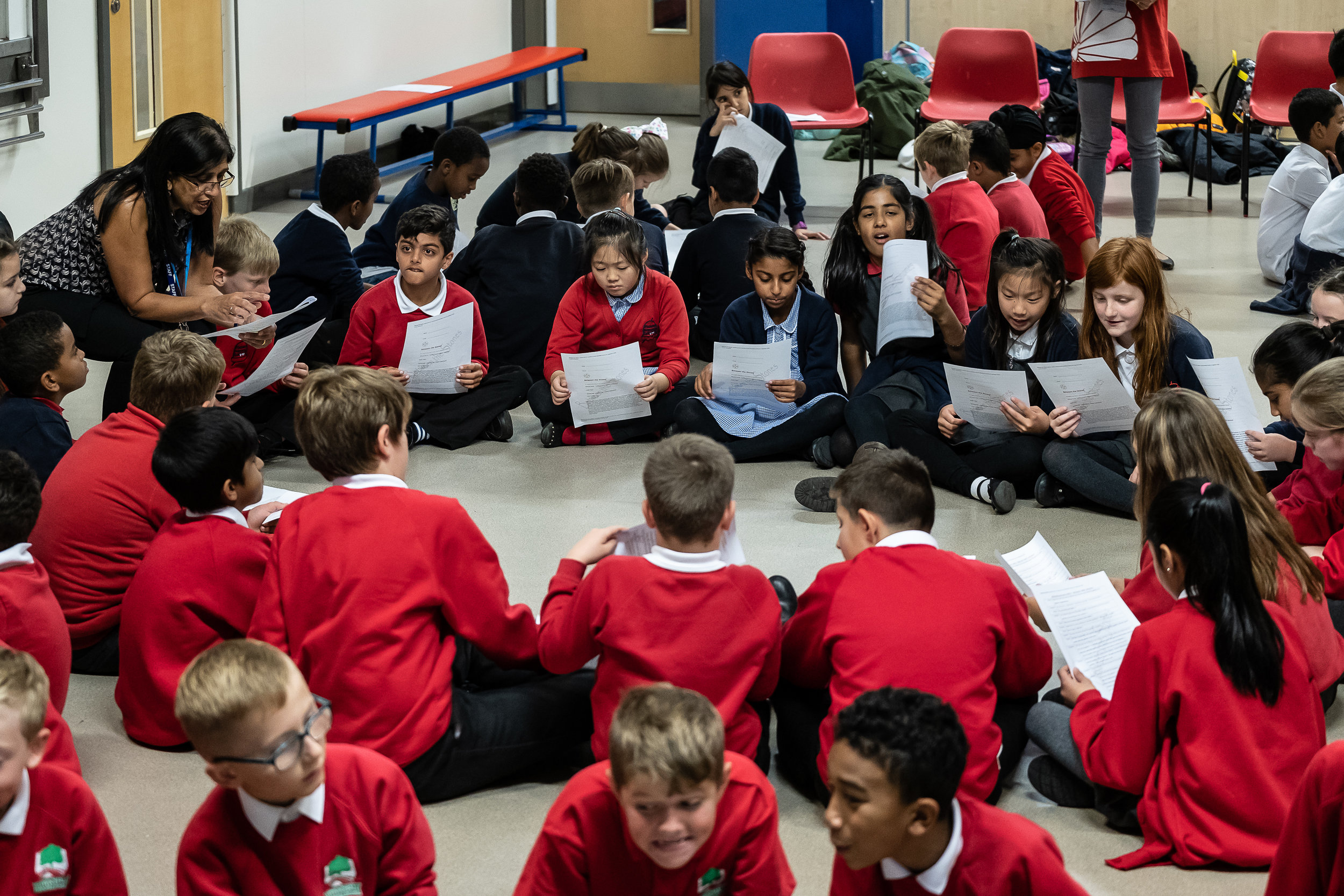
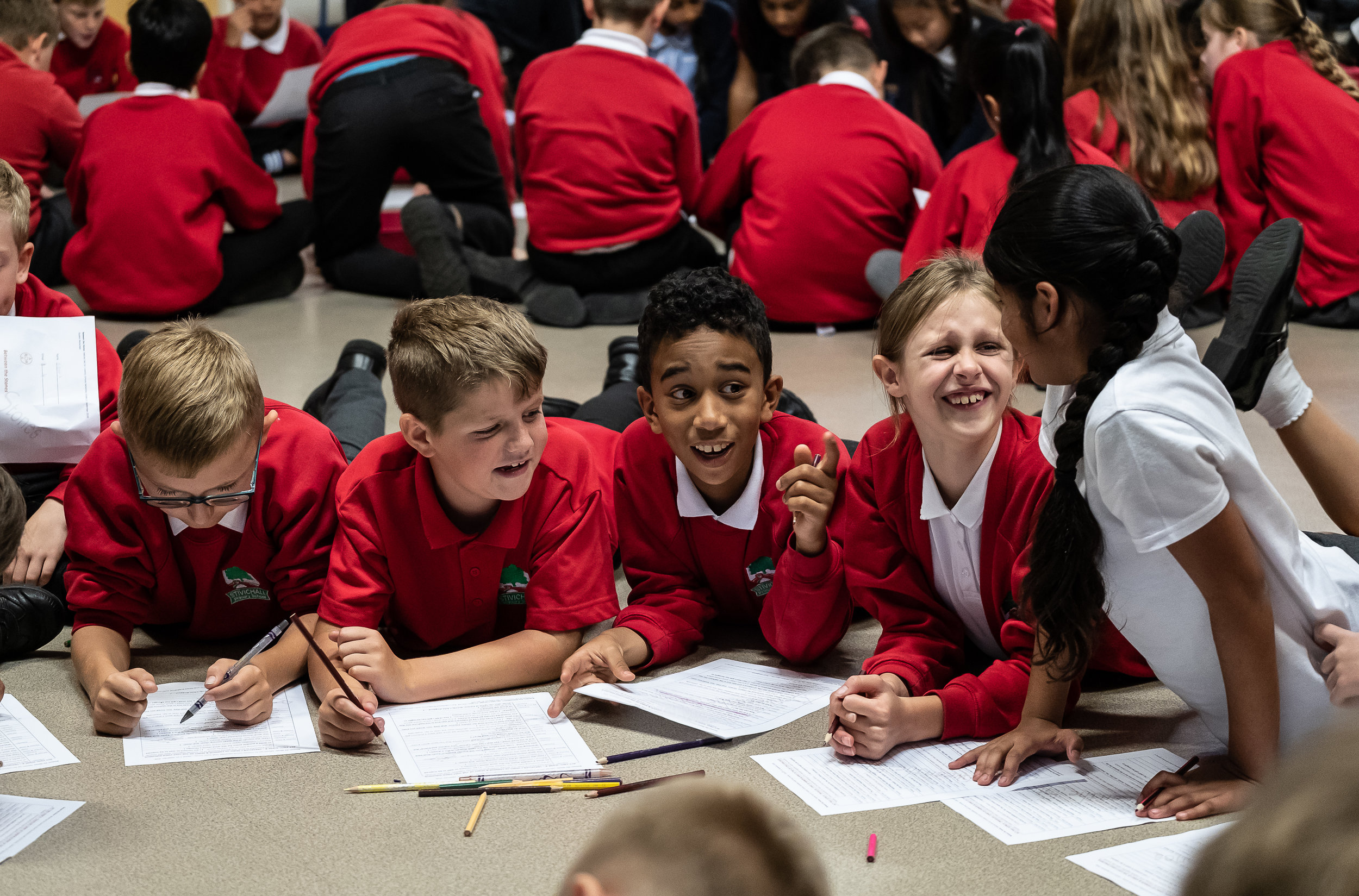
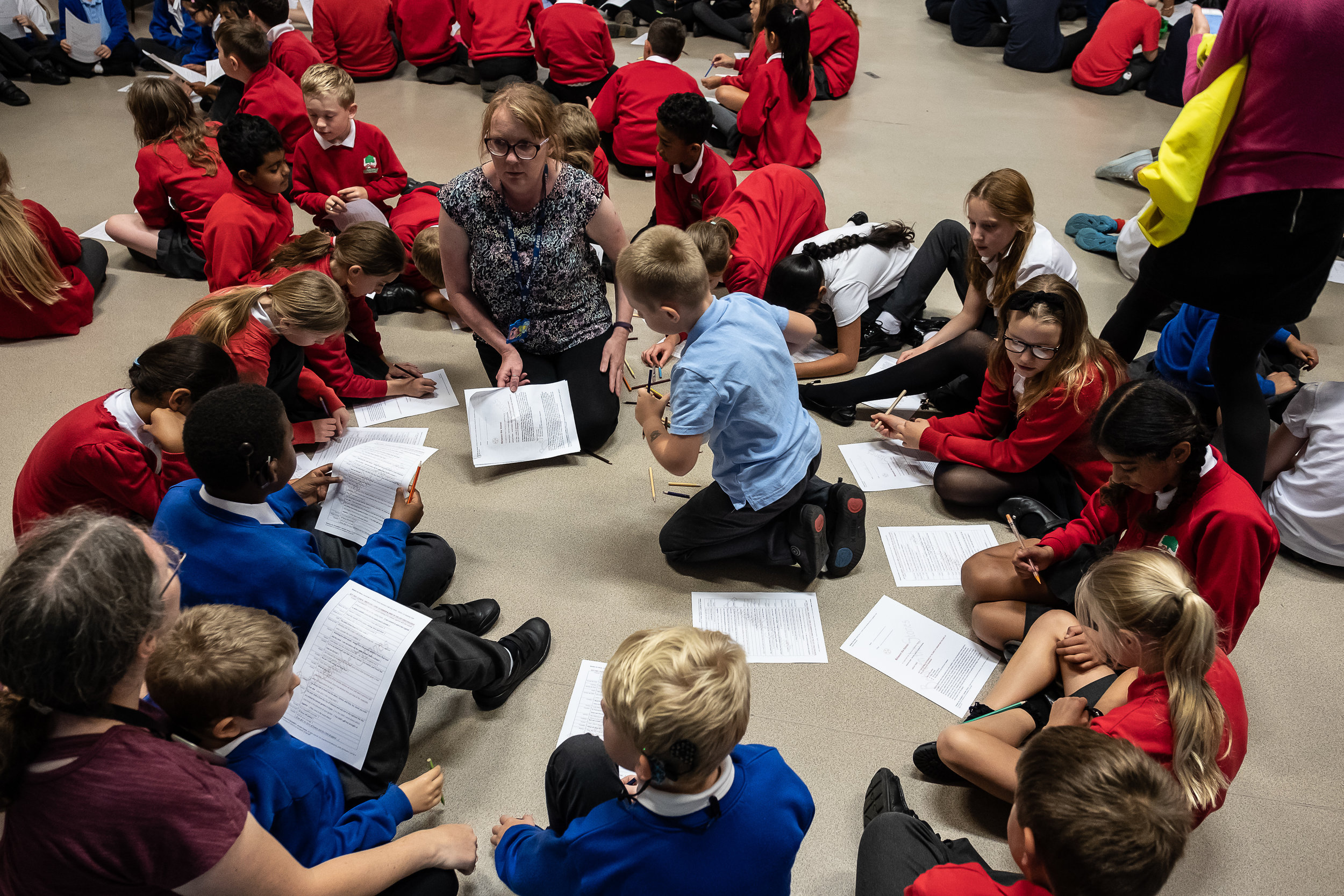
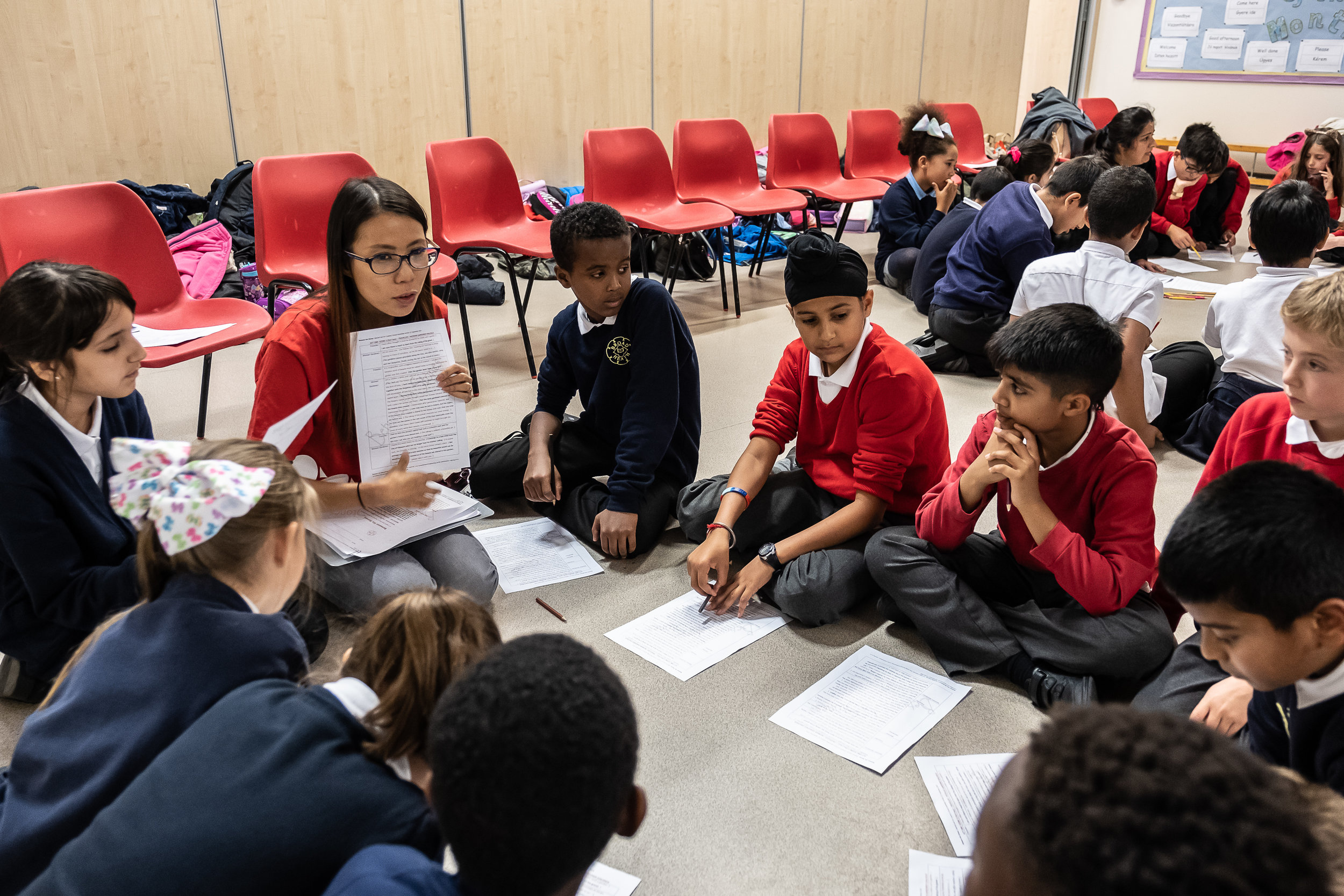
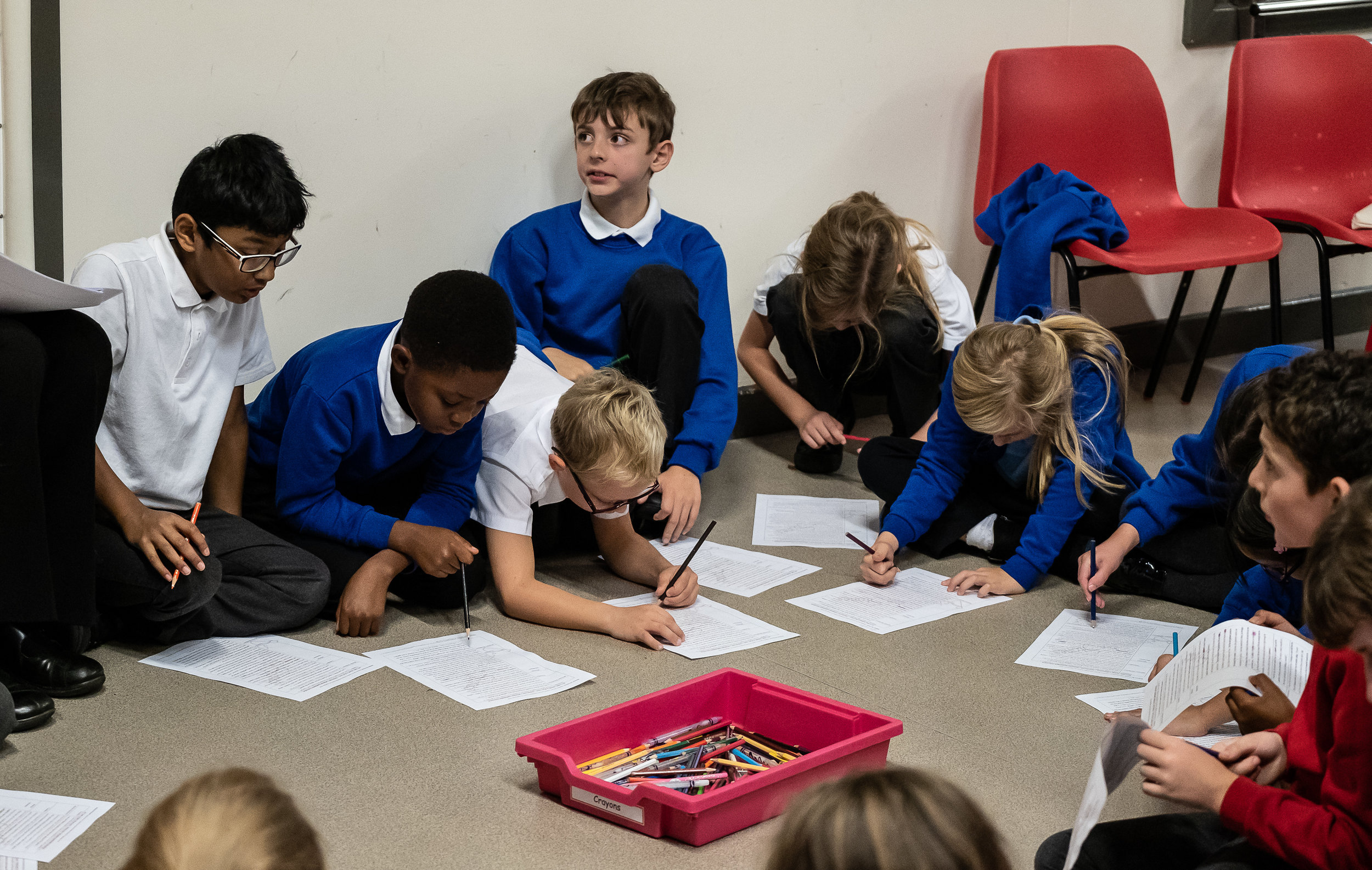
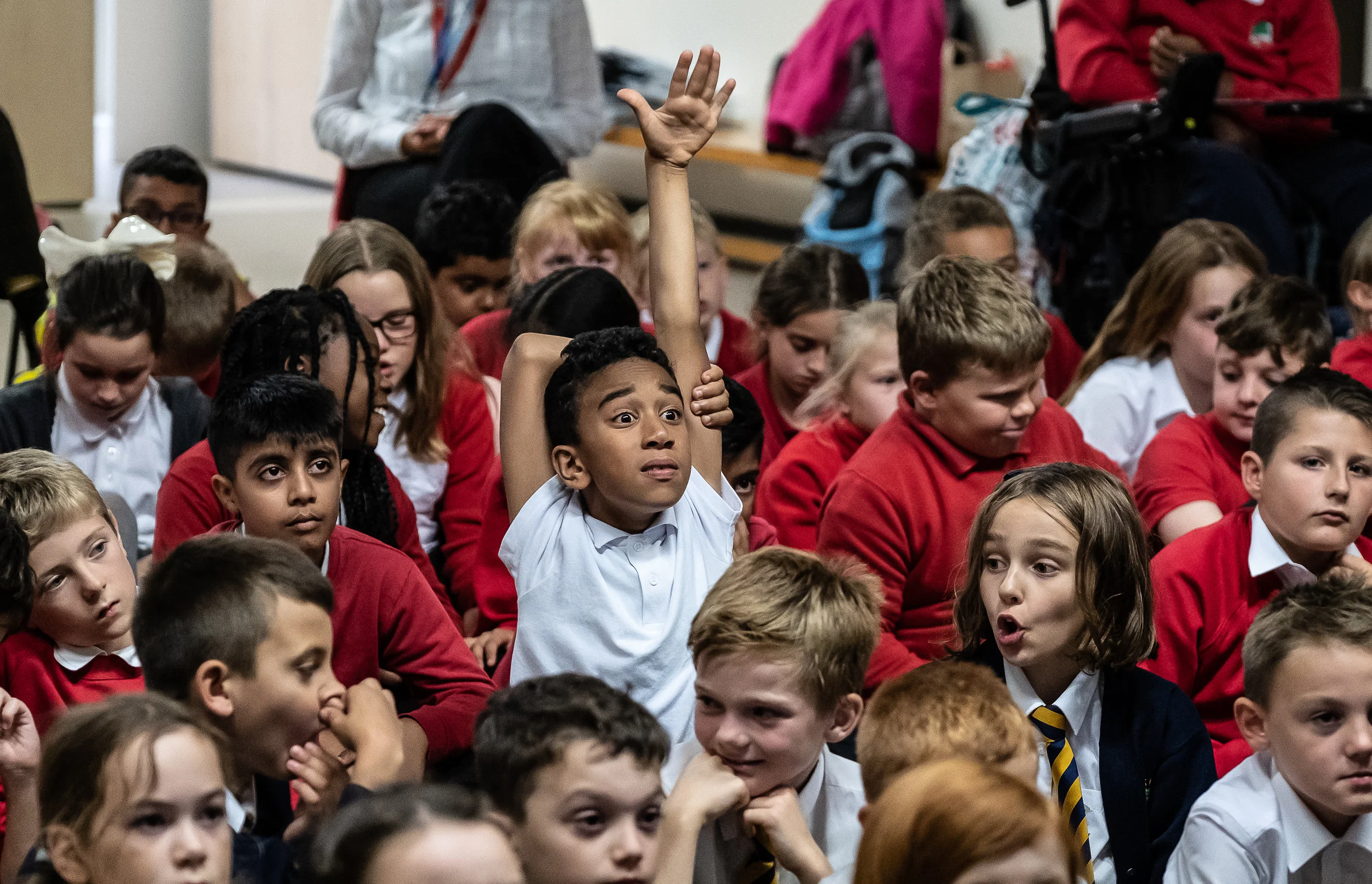
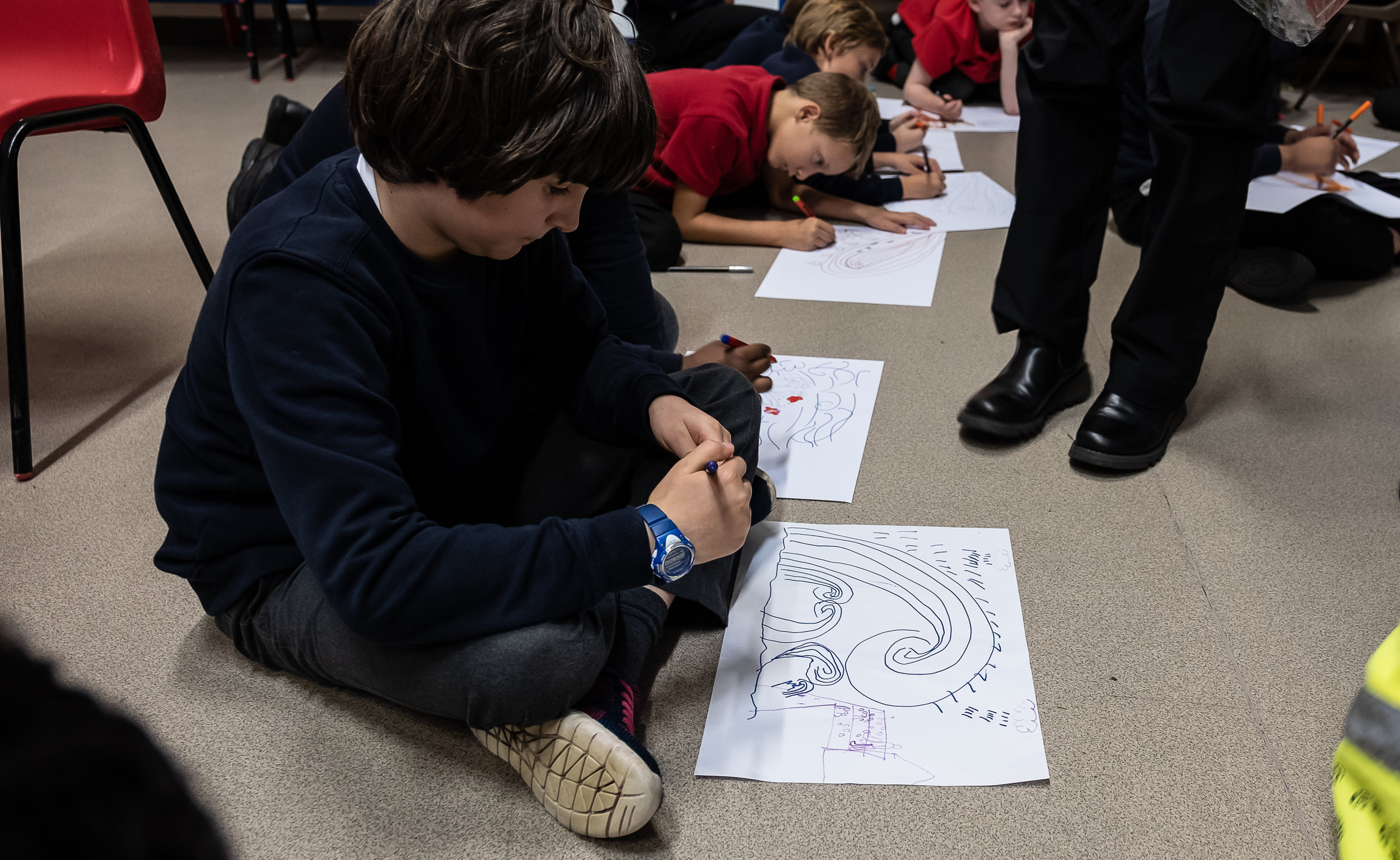
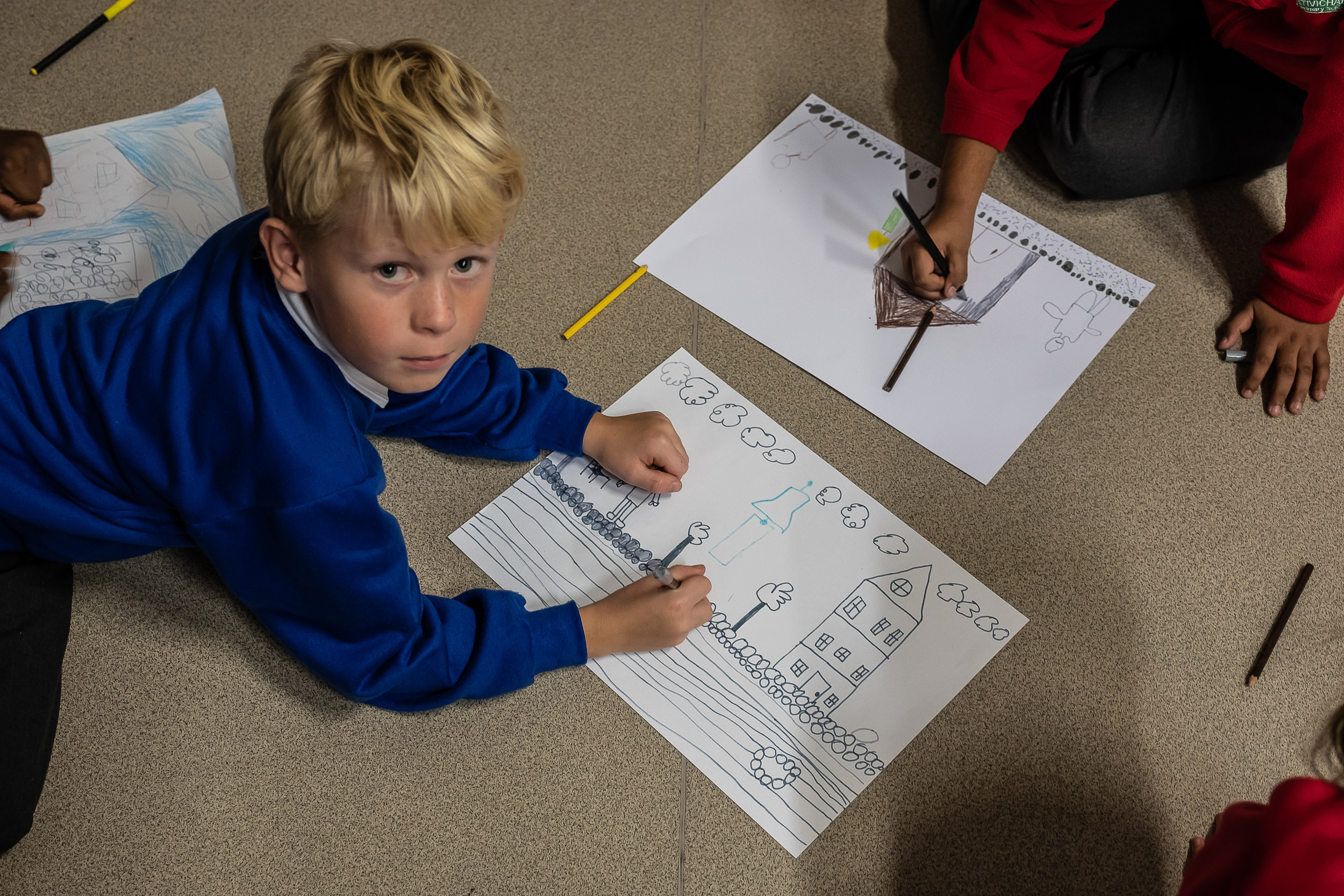

These key moments reflected the work undertaken by the children and teachers:
The day was a massive collaborative effort involving the Japan Society (Heidi Potter, Hannah Eastham and Rebecca), plus teaching assistants and teachers from all five schools and Jannette. None of this would have been possible if not for the energy and drive of Rebecca Bollands, Deputy Head of Howes Primary School, Coventry and all her Coventry colleagues!


